This class describes a resolution of Landau-Lifschitz system of the Core Package for E-MicroM package with an ODE integration. More...
#include <EMM_LandauLifschitzODE.h>
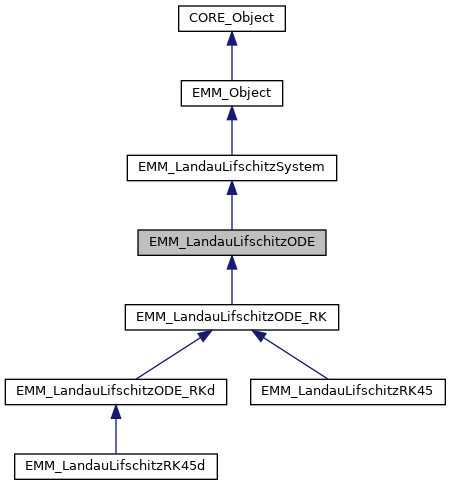
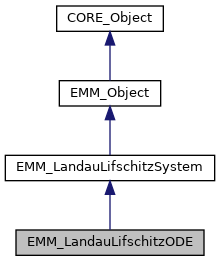
Public Member Functions | |
| void | setTimeIntegrationOrder (const int &order) |
| set the time integration order More... | |
| const tUCInt & | getTimeIntegrationOrder () const |
| get the time integration order More... | |
| virtual const tUInteger & | getTimeStepsNumber () const |
| return the computed time steps More... | |
| virtual const tReal & | getTime () const |
| return the current time More... | |
| virtual const tReal & | getTimeStep () const |
| return the current time step More... | |
| virtual tReal | integrateMagnetizationFieldAtTime (tReal &dt, const tFlag &errorNorm, const tReal &epsilon, tUSInt &nEvaluations, const EMM_RealField &dM_dt0, const EMM_RealField &M0, EMM_RealField &Mt)=0 |
| integrate the magnetization field at time t from time and derivative field at time 0 More... | |
| tBoolean | computeFieldsAtTime (EMM_ODETimeStep &stepper, tReal &dt, tReal &dtNew, const tFlag &order, const EMM_RealArray &sigma, const EMM_RealField &dM_dt0, const EMM_RealField &M0, EMM_RealField &Mt) |
| compute the fields of all operators and the magnetization field at time t More... | |
| virtual void | integrate (const tBoolean &isRestoring, tSInt &retCode) |
| solve the system More... | |
| void | solveODE (const tBoolean &isRestoring, tSInt &retCode) |
| solve the ODE system More... | |
| tBoolean | setMesh (SP::EMM_Grid3D mesh) |
| set the mesh More... | |
| const EMM_Grid3D & | getMesh () const |
| return the mesh associated to the problem for reading More... | |
| EMM_Grid3D & | getMesh () |
| return the mesh associated to the problem for writing More... | |
| const tUIndex & | getMagnetizedElementsNumber () const |
| get the number of mage,ntozed elements More... | |
| const EMM_MatterField & | getMatterField () const |
| return the matter index for each cell for reading More... | |
| EMM_MatterField & | getMatterField () |
| return the matter index for each cell for writing More... | |
| const tString & | getPrefix () const |
| get the prefix of the generating files More... | |
| const tString & | getOutputPath () const |
| get the output path in which the files are generated More... | |
| virtual void | adimensionize () |
| adimensionize the system: It get the max length of the cell and adimensionize the physical parameters of all matters see EMM_Matter::adimensionize() and compute the charactristic time see EMM_Stepper::setCharacteriticTime() More... | |
| virtual tBoolean | discretize (const tBoolean &isMnormalized) |
| discretize the problem More... | |
| tBoolean | discretize () |
| discretize the problem More... | |
| virtual tBoolean | addOperator (SP::EMM_MagneticExcitationOperator op) |
| add an operator More... | |
| void | clearOperators () |
| clear all operators More... | |
| const SV::EMM_MagneticExcitationOperator & | getOperators () const |
| return the operators vector More... | |
| SV::EMM_MagneticExcitationOperator & | getOperators () |
| return the operators vector More... | |
| tUIndex | getOperatorsNumber () const |
| return the number of operators More... | |
| const EMM_Operator & | getOperator (const tUIndex &index) const |
| get the operator at index for reading More... | |
| EMM_Operator & | getOperator (const tUIndex &index) |
| get the operator at index for writing More... | |
| tBoolean | isAffine () const |
| return true if the system has only affine operators More... | |
| tBoolean | resetToInitialState () |
| reset to initial state More... | |
| virtual tBoolean | resetOperatorsToInitialState () |
| initialize the problem More... | |
| void | computeFunction (const EMM_RealField &M, const EMM_RealField &H, EMM_RealField &F) const |
| compute the landau-lifschitz function More... | |
| void | computeGradFunction (const EMM_RealField &M, const EMM_RealField &H, const EMM_RealField &D, const EMM_RealField &gradH, EMM_RealField &gradF) const |
| compute the gradient landau-lifschitz function at the direction D in M More... | |
| void | computePartialGradMFunction (const EMM_RealField &M, const EMM_RealField &H, const EMM_RealField &D, EMM_RealField &gradF) const |
| compute the partial gradient with respect to M of landau-lifschitz function at the direction D in M More... | |
| void | setInitialMagnetization (const tString &dataFile) |
| set the initialization data for magnetization field More... | |
| void | setInitialMagnetization (const tReal data[3]) |
| set the initialization data for magnetization field More... | |
| void | setInitialMagnetization (const tReal &M0, const tReal &M1, const tReal &M2) |
| set the initialization data for magnetization field More... | |
| void | setInitialMagnetization (const EMM_RealField &data) |
| set the initialization data for magnetization field More... | |
| void | setEvolutionScheme (const tFlag &f) |
| set the evolution scheme More... | |
| const tFlag & | getEvolutionScheme () const |
| return the evolution scheme between M & opertaor fields More... | |
| tBoolean | isMagnetizationStatic () const |
| return true if M is permanent More... | |
| const EMM_RealField & | getMagnetizationField () const |
| return the adimensionized magnetisation field associated to the problem for reading at time 0 of the current time step More... | |
| EMM_RealField & | getMagnetizationField () |
| return the adimensionized magnetizaton field associated to the problem for writing at time 0 of the current time step More... | |
| const EMM_RealField & | getMagnetizationFieldTimeDerivative () const |
| get the magnetization variation field with respect to time at time 0 of the current time step More... | |
| EMM_RealField & | getMagnetizationFieldTimeDerivative () |
| get the magnetization variation field with respect to time at time 0 of the current time step More... | |
| const EMM_RealArray & | getSigma () const |
| get the sigma parameters More... | |
| void | computeMagnetizationFieldTimeDerivative (const EMM_RealField &Mt, const EMM_RealField &Ht, EMM_RealField &Ft) const |
| compute the time variation of magnetization field at Mt and Ht for time t of the current time step More... | |
| EMM_RealField & | getWorkingMagneticExcitationField () const |
| get mutable adimensionized magnetic excitation working field More... | |
| const EMM_RealField & | getMagneticExcitationField () const |
| get adimensionized magnetic excitation at time 0 of time step More... | |
| EMM_RealField & | getMagneticExcitationField () |
| get adimensionized magnetic excitation at time 0 of time step More... | |
| void | computeMagneticExcitationField (const EMM_RealField &M, EMM_RealField &H) const |
compute the total adimensionized magnetic excitation H of the system (real magnetic excitation is  ) More... ) More... | |
| const EMM_RealField & | computeMagneticExcitationField () |
compute the total adimensionized magnetic excitation H of the system (real magnetic excitation is  ) More... ) More... | |
| void | computeMagnetizationExcitationField (const EMM_RealField &M, EMM_RealField &H) const |
compute the magnetic excittaion corresponting the the magnetized operator  ) More... ) More... | |
| tReal | computeMagneticExcitationFieldAndEnergies (const EMM_RealField &M, EMM_RealField &H, tReal Es[]) const |
compute the total adimensionized magnetic excitation H of the system (real magnetic excitation is  ) and return its energy More... ) and return its energy More... | |
| virtual void | computeLandauLifschitzFields (const EMM_RealField &M, const EMM_RealField &H, EMM_RealField &F) |
| compute the landau lifschitz fields More... | |
| void | computeMeanMagnetizationField (tReal *meanM) const |
| compute the mean of magnetization field with respect of sigma weight at time 0 of time step More... | |
| void | computeMeanField (const EMM_RealField &F, tReal *meanF) const |
| compute the mean of field over the magnetized domain More... | |
| const tReal & | getEnergy () const |
| return the energy More... | |
| const tReal & | getEnergyTimeDerivative (tReal &dE_dt) const |
| return the energy and its first derivative with respect to time More... | |
| void | setMinimumEnergyVariation (const tReal &v) |
| set minimum energy variation under which the relaxation is supposed to be reached More... | |
| const tReal & | getMinimumEnergyVariation () const |
| get minimum energy variation under which the relaxation is supposed to be reached More... | |
| tReal | computeEnergy () const |
| compute the energy More... | |
| tReal | computeEnergyTimeDerivative (const EMM_RealField &F, const EMM_RealField &H) const |
| compute the energy derivative with rsepect to t More... | |
| void | setMinimumTimeStep (const tReal &v) |
| set minimum time step under which the relaxation process is supposed to be reached More... | |
| const tReal & | getMinimumTimeStep () const |
| get minimum time step under which the relaxation process is supposed to be reached More... | |
| tBoolean | setStepper (SP::EMM_Stepper time) |
| set the reverse time relation More... | |
| void | resetStepper () |
| reset the reverse time relation More... | |
| const EMM_Stepper & | getStepper () const |
| get the time descriptor for reading More... | |
| EMM_Stepper & | getStepper () |
| get the time descriptor for writing More... | |
| virtual tString | getInformation (const tUSInt &retCode) |
| return the information relativly to ret code of the integrate method More... | |
| void | setIsLogPrinted (const tBoolean &v) |
| set if the log is printed in log file More... | |
| const tBoolean & | isLogPrinted () const |
| get if the log is printed in log file More... | |
| void | printLog (const tUInteger &timeStep, const tReal &t, const map< tString, tString > &stepperData, const tUIndex &nMagnetizedElements, const tReal Es[], const tReal &dE_dt, const tReal &DeltaE_DeltaT, const tReal *meanM, const tReal *meanH) const |
| print the log More... | |
| void | setOutputPath (const tString ¤tPath, const tString &path, const tString &prefix) |
| set the output path More... | |
| void | setBackupStep (const tUInteger &n) |
| set the backup steps to save relaxation More... | |
| void | setBackupsNumber (const tUInteger &n) |
| set the backups number More... | |
| void | setIsBackupEnabled (const tBoolean &v) |
| set if the backup is enabled More... | |
| const tBoolean & | isBackupEnabled () const |
| get if the backup is enabled More... | |
| const tUInteger & | getBackupsNumber () const |
| get the backups number More... | |
| const tUInteger & | getBackupStep () const |
| get the backup step More... | |
| virtual tString | toString () const |
| turn the class into a string More... | |
| void | getSharedPointer (SP::CORE_Object &p) |
| get the shared pointer of this class into p More... | |
| void | getSharedPointer (SPC::CORE_Object &p) const |
| get the shared pointer of this class into p More... | |
| tString | getClassName () const |
| return the class name of the object More... | |
| tString | getIdentityString () const |
| return the identity string of the object of the form className_at_address More... | |
| tString | getPointerAddress () const |
| return the identity string of the object More... | |
| template<class T > | |
| tBoolean | isInstanceOf () const |
| test if the clas T is an instance of this class More... | |
| tBoolean | isInstanceOf (const tString &name) const |
| test if the object is an instance of className More... | |
Static Public Member Functions | |
| static tUSInt | getEnergiesNumber () |
| return the energie number More... | |
| static void | setIsMemoryChecked (const tBoolean &v) |
| set if the memory checking is used More... | |
| static void | setOut (SP::CORE_Out out) |
| set the output stream More... | |
| static void | resetOut () |
| reset the output stream More... | |
| static void | setThread (SP::CORE_Thread thread) |
| set the thread More... | |
| static void | resetThread () |
| reset the output stream More... | |
| static CORE_Out & | out () |
| get the output More... | |
| static SP::CORE_Out | getOut () |
| get the output More... | |
| static CORE_Thread & | getThread () |
| get the profilier More... | |
| static const tBoolean & | isMemoryChecked () |
| get if the memory checking is used More... | |
| static tString | getClassName (const tString &identityString) |
| return the class name of the object More... | |
| template<class T > | |
| static tString | getTypeName () |
| get type name More... | |
| static tBoolean | is64Architecture () |
| return true if the machine is a 64 bits machine More... | |
| static tBoolean | is32Architecture () |
| return true if the machine is a 32 bits machine More... | |
| static tString | pointer2String (const void *obj) |
| return the string representation of a pointer More... | |
| static void | printObjectsInMemory (ostream &f) |
| print object in memory More... | |
| static void | printObjectsInMemory () |
| print object in memory in the standart output More... | |
| static tChar | getMaxChar () |
| get the max value for tChar type More... | |
| static tChar | getMinChar () |
| get the min value for tChar type More... | |
| static tUChar | getMaxUChar () |
| get the max value for tUChar type More... | |
| static tUChar | getMinUChar () |
| get the min value for tUChar type More... | |
| static tSInt | getMaxSInt () |
| get the max value for tSInt type More... | |
| static tSInt | getMinSInt () |
| get the min value for tSInt type More... | |
| static tUSInt | getMaxUSInt () |
| get the max value for tUSInt type More... | |
| static tUSInt | getMinUSInt () |
| get the min value for tUSInt type More... | |
| static tInt | getMaxInt () |
| get the max value for tInt type More... | |
| static tInt | getMinInt () |
| get the min value for tInt type More... | |
| static tUInt | getMaxUInt () |
| get the max value for tUInt type More... | |
| static tUInt | getMinUInt () |
| get the min value for tUInt type More... | |
| static tLInt | getMaxLInt () |
| get the max value for tLInt type More... | |
| static tLInt | getMinLInt () |
| get the min value for tLInt type More... | |
| static tULInt | getMaxULInt () |
| get the max value for tULInt type More... | |
| static tULInt | getMinULInt () |
| get the min value for tULInt type More... | |
| static tLLInt | getMaxLLInt () |
| get the max value for tULInt type More... | |
| static tLLInt | getMinLLInt () |
| get the min value for tLLInt type More... | |
| static tULLInt | getMaxULLInt () |
| get the max value for tULLInt type More... | |
| static tULLInt | getMinULLInt () |
| get the min value for tULLInt type More... | |
| static tFloat | getMaxFloat () |
| get the max value for tFloat type More... | |
| static tFloat | getMinFloat () |
| get the min value for tFloat type More... | |
| template<class T > | |
| static T | getEpsilon () |
| get the epsilon value for T type More... | |
| template<class T > | |
| static T | getInfinity () |
| get the infinity for T type More... | |
| static tFloat | getFloatEpsilon () |
| get the epsilon value for tFloat type More... | |
| static tFloat | getFloatInfinity () |
| get the infinity value for tFloat type More... | |
| static tDouble | getMaxDouble () |
| get the max value for tDouble type More... | |
| static tDouble | getMinDouble () |
| get the min value for tDouble type More... | |
| static tDouble | getDoubleInfinity () |
| get the infinity value for tFloat type More... | |
| static tDouble | getDoubleEpsilon () |
| get the epsilon value for tDouble type More... | |
| static tLDouble | getMinLDouble () |
| get the min value for tLDouble type More... | |
| static tLDouble | getMaxLDouble () |
| get the max value for tLDouble type More... | |
| static tLDouble | getLDoubleEpsilon () |
| get the epsilon value for tLDouble type More... | |
| static tDouble | getLDoubleInfinity () |
| get the infinity value for tDouble type More... | |
| static tIndex | getMaxIndex () |
| get the max value for the array/vector indexing type More... | |
| static tIndex | getMinIndex () |
| get the min value for the array/vector indexing type More... | |
| static tUIndex | getMaxUIndex () |
| get the max value for difference the array/vector indexing type More... | |
| static tUIndex | getMinUIndex () |
| get the min value for difference the array/vector indexing type More... | |
| static tFlag | getMaxFlag () |
| get the max value for the tFlag type More... | |
| static tFlag | getMinFlag () |
| get the min value for the tFlag type More... | |
| static tUInteger | getMaxUInteger () |
| get the max value for the unsigned integer type More... | |
| static tUInteger | getMinUInteger () |
| get the min value for the unsigned integer type More... | |
| static tInteger | getMaxInteger () |
| get the max value for the integer type More... | |
| static tInteger | getMinInteger () |
| get the min value for the integer type More... | |
| static tReal | getMaxReal () |
| get the max value for the real type More... | |
| static tReal | getMinReal () |
| get the min value for the real type More... | |
| static tReal | getRealEpsilon () |
| get the eps which is the difference between 1 and the least value greater than 1 that is representable. More... | |
| static tReal | getRealInfinity () |
| get the infinity value More... | |
| template<class T > | |
| static T | computeEpsilon () |
| compute epsilon More... | |
Static Public Attributes | |
| static const tSInt | MIN_CODE =-4 |
| static const tSInt | MAGNETIZATION_FIELD_UPDATE_ERROR =-4 |
| static const tSInt | OPERATORS_FIELDS_UPDATE_ERROR =-3 |
| static const tSInt | E_INCREASING =-2 |
| static const tSInt | E_IS_NAN =-1 |
| static const tSInt | RELAXATION_IS_REACHED =0 |
| static const tSInt | DE_DT_MIN_IS_REACHED =1 |
| static const tSInt | MAXIMUM_ITERATION_IS_REACHED =2 |
| static const tSInt | M_PARALLEL_H =3 |
| static const tSInt | DT_MIN_IS_REACHED =4 |
| static const tFlag | OsM =1 |
| static const tFlag | MOs =2 |
| static const tFlag | M =3 |
| static const tFlag | Os =4 |
| static const tReal | Mu0 =4*M_PI*1e-07 |
| static const tReal | Gamma =-1.7e11 |
| static const tDimension | X =0 |
| static const tDimension | Y =1 |
| static const tDimension | Z =2 |
| static const tReal | NULL_VALUE [] ={0,0,0} |
Protected Member Functions | |
| EMM_LandauLifschitzODE (void) | |
| create the class More... | |
| virtual | ~EMM_LandauLifschitzODE (void) |
| destroy the class More... | |
| tBoolean | computeOperatorsFieldsAtTime (const tReal &t, const tFlag &order, const EMM_RealArray &sigma, const EMM_RealField &dM_dt, const EMM_RealField &M) |
| compute the fields of all operators at time t More... | |
| tBoolean | updateOperatorsAtNextTimeStep (const tReal &dt, const EMM_RealArray &sigma, const EMM_RealField &Mt) |
| update the operator at next time time with respect of the value of the magnetization field at next time More... | |
| tBoolean | initializeOperators (const EMM_RealArray &sigma, const EMM_RealField &M) |
| initialize the data of operator field at t=0 from M More... | |
| tReal & | getEnergyTimeDerivative () |
| get the energgy time derivative More... | |
| tReal * | getEnergies () |
| get the energies More... | |
| virtual void | toDoAfterThisSetting () |
| method called after the setting of the shared pointer this method can only be called once. More... | |
| void | setThis (SP::CORE_Object p) |
| set this weak shared pointer called toDoAfterThis setting method More... | |
Private Member Functions | |
| SP_OBJECT (EMM_LandauLifschitzODE) | |
Private Attributes | |
| tUCInt | mTimeIntegrationOrder |
| tUInteger | mTimeStep |
| tReal | mDt |
| tReal | mT |
Detailed Description
This class describes a resolution of Landau-Lifschitz system of the Core Package for E-MicroM package with an ODE integration.
The purpose of the class is to solve the Landau-Lifschitz system EMM_LandauLifschitzSystem by an ODE integration.
It computes the evolution of the magnetization field by the method EMM_LandauLifschitzODE::solveODE() which is the implementation of the method EMM_LandauLifschitzSystem::integrate()
The solving of the system needs to define the time step integrator EMM_ODETimeStep which computes either a constant time step or an adpative time step.
- Version
- 1.0
Constructor & Destructor Documentation
◆ EMM_LandauLifschitzODE()
|
protected |
create the class
◆ ~EMM_LandauLifschitzODE()
|
protectedvirtual |
destroy the class
Member Function Documentation
◆ addOperator()
|
inlinevirtualinherited |
add an operator
- Parameters
-
op the operator to add
Reimplemented in EMM_GradGaussLegendreRelaxation.
References null.
Referenced by EMM_GradGaussLegendreRelaxation::addOperator(), and EMMH_Hysteresis::run().

◆ adimensionize()
|
virtualinherited |
adimensionize the system: It get the max length of the cell and adimensionize the physical parameters of all matters see EMM_Matter::adimensionize() and compute the charactristic time see EMM_Stepper::setCharacteriticTime()
References EMM_LandauLifschitzSystem::getStepper(), EMM_LandauLifschitzSystem::mMatters, EMM_LandauLifschitzSystem::mMesh, EMM_LandauLifschitzSystem::mOperators, EMM_Stepper::setCharacteristicTime(), and tReal.
Referenced by EMM_LandauLifschitzSystem::getOutputPath(), and EMMH_Hysteresis::run().


◆ clearOperators()
|
inlineinherited |
clear all operators
◆ computeEnergy()
|
inherited |
compute the energy
- Returns
- the computed energy :
- gets the matgnetization field and
- computes the energy for each operator
References EMM_LandauLifschitzSystem::getMagnetizationField(), EMM_LandauLifschitzSystem::getSigma(), EMM_LandauLifschitzSystem::M, EMM_LandauLifschitzSystem::mHop, EMM_LandauLifschitzSystem::mOperators, and tReal.
Referenced by EMM_LandauLifschitzSystem::getMinimumEnergyVariation().


◆ computeEnergyTimeDerivative()
|
inlineinherited |
compute the energy derivative with rsepect to t
- Parameters
-
F the time variation of magnetization field H the total magnetic excitation field
- Returns
- the computed energy variation :

References EMM_RealField::dot(), EMM_LandauLifschitzSystem::getMesh(), and EMM_LandauLifschitzSystem::getSigma().
Referenced by EMM_LandauLifschitzRelaxation::computeEnergyTimeDerivativeAtTime(), EMM_GradGaussLegendreRelaxation::computeEnergyTimeDerivatives(), and EMM_GradGaussLegendreRelaxation::computeEnergyTimeDerivativesAtTime().


◆ computeEpsilon()
|
inlinestaticinherited |
compute epsilon
- Returns
- the epsilon value eps=10^{-p/3} where p is defined by getEpsilon()=10^{-p}
◆ computeFieldsAtTime()
| tBoolean EMM_LandauLifschitzODE::computeFieldsAtTime | ( | EMM_ODETimeStep & | stepper, |
| tReal & | dt, | ||
| tReal & | dtNew, | ||
| const tFlag & | order, | ||
| const EMM_RealArray & | sigma, | ||
| const EMM_RealField & | dM_dt0, | ||
| const EMM_RealField & | M0, | ||
| EMM_RealField & | Mt | ||
| ) |
compute the fields of all operators and the magnetization field at time t
- Parameters
-
stepper the time step integrator dt : the time step for computing M dtNew : the new time step for next step order order of integration of the fields of operator (0|1|2) (if 0 take the time integration order by default of the operator) sigma the magnetized weight of each cell dM_dt0 the variation of M at time 0 from the current time step M0 : the magnetization field at time 0 from the curent time step Mt : the magnetization field at time t+dt
- Returns
- true if the error on M at t+dt is in tolerate bound.
References EMM_ODETimeStep::computeNewTimeStep(), EMM_LandauLifschitzSystem::computeOperatorsFieldsAtTime(), EMM_RealField::copy(), EMM_LandauLifschitzSystem::getEvolutionScheme(), EMM_ODETimeStep::getMagnetizationFieldAtTime(), EMM_LandauLifschitzSystem::M, EMM_LandauLifschitzSystem::MOs, EMM_LandauLifschitzSystem::Os, EMM_LandauLifschitzSystem::OsM, and tBoolean.
Referenced by getTimeStep().


◆ computeFunction()
|
inlineinherited |
compute the landau-lifschitz function
- Parameters
-
M the magnetization field H the total excitation magnetic field F the return output vector landau-lifschitz function compute 
References EMM_LandauLifschitzSystem::getSigma().
Referenced by EMM_GaussLegendreRelaxation::computeMagnetizationFieldAtTimeWithGLnInterpolation(), and EMM_LandauLifschitzSystem::computeMagnetizationFieldTimeDerivative().


◆ computeGradFunction()
|
inlineinherited |
compute the gradient landau-lifschitz function at the direction D in M
- Parameters
-
M : the magnetization field H : the total excitation magnetic field D : the gradient direction gradH : the gradient of H at M in the direction D gradF : the gradient of the landau-lisfchtiz function at M in the direction D
compute the gradient of the landau lifschitz at M in the direction D: ![$ GradF_M(D)=\alpha.[D \wedge H+\beta (D \wedge (M \wedge H)+M \wedge (D \wedge H))]+F(M,GradH_M(D)) $](form_1697.png)
References EMM_LandauLifschitzSystem::getSigma().
Referenced by EMM_GradGaussLegendreRelaxation::computeMagnetizationFieldTimeDerivativeGradient().


◆ computeLandauLifschitzFields()
|
inlinevirtualinherited |
compute the landau lifschitz fields
- Parameters
-
M the magnetization field H the total magnetic excitation field F the total magnetization field time derivative
- Returns
- the derivative of the energy with respect to time
 compute
compute  .
.
Reimplemented in EMM_GradGaussLegendreRelaxation.
References EMM_LandauLifschitzSystem::computeMagnetizationFieldTimeDerivative(), EMM_LandauLifschitzSystem::computeMeanField(), EMM_LandauLifschitzSystem::computeMeanMagnetizationField(), and tReal.
Referenced by EMM_GradGaussLegendreRelaxation::computeLandauLifschitzFields(), EMM_LandauLifschitzODE_RKd::integrateMagnetizationFieldAtTime(), and EMM_LandauLifschitzODE_RK::integrateMagnetizationFieldAtTime().


◆ computeMagneticExcitationField() [1/2]
|
inherited |
compute the total adimensionized magnetic excitation H of the system (real magnetic excitation is  )
)
- Parameters
-
M the magnetization field H the total magnetic excitation field
use the working field at index 1
References EMM_LandauLifschitzSystem::getSigma(), EMM_RealField::getSize(), EMM_LandauLifschitzSystem::mHop, EMM_LandauLifschitzSystem::mOperators, and EMM_RealField::setSize().
Referenced by EMMH_Hysteresis::run().


◆ computeMagneticExcitationField() [2/2]
|
inlineinherited |
compute the total adimensionized magnetic excitation H of the system (real magnetic excitation is  )
)
- Returns
- the total magnetic excitation field
References EMM_LandauLifschitzSystem::computeMagneticExcitationFieldAndEnergies(), EMM_LandauLifschitzSystem::getMagneticExcitationField(), EMM_LandauLifschitzSystem::getMagnetizationField(), and tReal.
Referenced by EMM_GaussLegendreRelaxation::computeMagnetizationFieldAtTimeWithGLnInterpolation(), EMM_LandauLifschitzSystem::getMagneticExcitationField(), EMM_LandauLifschitzODE_RKd::integrateMagnetizationFieldAtTime(), and EMM_LandauLifschitzODE_RK::integrateMagnetizationFieldAtTime().


◆ computeMagneticExcitationFieldAndEnergies()
|
inherited |
compute the total adimensionized magnetic excitation H of the system (real magnetic excitation is  ) and return its energy
) and return its energy
- Parameters
-
M the magnetization field H the total magetic excitation field Es the energy of each operators
- Returns
- the energy of the system
use the Hop mutable field
References EMM_LandauLifschitzSystem::getSigma(), EMM_RealField::getSize(), EMM_LandauLifschitzSystem::mHop, EMM_LandauLifschitzSystem::mOperators, EMM_RealField::setSize(), and tReal.
Referenced by EMM_LandauLifschitzSystem::computeMagneticExcitationField().


◆ computeMagnetizationExcitationField()
|
inherited |
compute the magnetic excittaion corresponting the the magnetized operator  )
)
- Parameters
-
M the magnetization field H the magnetization excitation field
References EMM_LandauLifschitzSystem::getSigma(), EMM_RealField::getSize(), EMM_LandauLifschitzSystem::mOperators, and EMM_RealField::setSize().
Referenced by EMM_LandauLifschitzSystem::getMagneticExcitationField(), and EMMH_Hysteresis::run().


◆ computeMagnetizationFieldTimeDerivative()
|
inlineinherited |
compute the time variation of magnetization field at Mt and Ht for time t of the current time step
- Parameters
-
Mt the magnetization field Ht the total magnetic excitation field Ft the return derivation of the magnetization field with respect of time:
 .
.
References EMM_LandauLifschitzSystem::computeFunction().
Referenced by EMM_LandauLifschitzRelaxation::computeEnergyTimeDerivativeAtTime(), EMM_GradGaussLegendreRelaxation::computeEnergyTimeDerivativesAtTime(), and EMM_LandauLifschitzSystem::computeLandauLifschitzFields().


◆ computeMeanField()
|
inherited |
compute the mean of field over the magnetized domain
- Parameters
-
F : field to compute the mean meanF mean of the field F in dimension 3
References EMM_Grid3D::getMagnetizedElementsNumber(), EMM_LandauLifschitzSystem::getMesh(), EMM_RealField::getSize(), EMM_RealField::mean(), tReal, tUIndex, and tUSInt.
Referenced by EMM_LandauLifschitzSystem::computeLandauLifschitzFields(), and EMMH_Hysteresis::run().
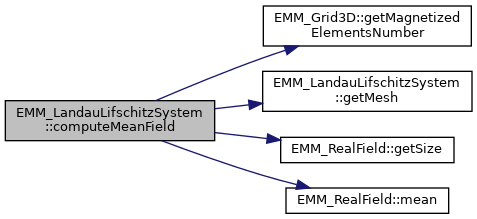

◆ computeMeanMagnetizationField()
|
inherited |
compute the mean of magnetization field with respect of sigma weight at time 0 of time step
- Parameters
-
meanM mean of magnetization field
References EMM_LandauLifschitzSystem::getMagnetizationField(), EMM_Grid3D::getMagnetizedElementsNumber(), EMM_LandauLifschitzSystem::getMesh(), EMM_LandauLifschitzSystem::getSigma(), EMM_RealField::getSize(), EMM_LandauLifschitzSystem::M, EMM_RealField::mean(), tReal, tUIndex, and tUSInt.
Referenced by EMM_LandauLifschitzSystem::computeLandauLifschitzFields(), and EMMH_Hysteresis::run().
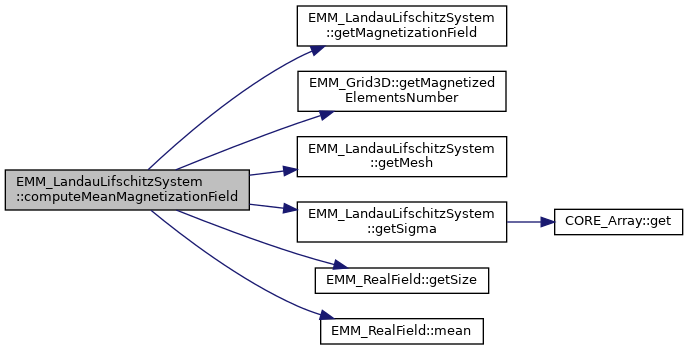

◆ computeOperatorsFieldsAtTime()
|
protectedinherited |
compute the fields of all operators at time t
- Parameters
-
t the time step to compute order order of integration of the fields of operator (0|1|2) (if 0 take the time integration order by default of the operator) sigma the magnetized weight of each cell dM_dt the variation of M at time 0 from the current time step M : the magnetization field at time 0 from the curent time step
References EMM_LandauLifschitzSystem::mOperators, and tBoolean.
Referenced by computeFieldsAtTime(), EMM_LandauLifschitzRelaxation::computeFieldsAtTime(), and EMM_LandauLifschitzSystem::getOperator().

◆ computePartialGradMFunction()
|
inlineinherited |
compute the partial gradient with respect to M of landau-lifschitz function at the direction D in M
- Parameters
-
M : the magnetization field H : the total excitation magnetic field D : the gradient direction gradF : the gradient of the landau-lisfchtiz function at M in the direction D
compute the gradient of the landau lifschitz at M in the direction D: ![$ GradF_M(D)=\alpha.[D \wedge H+\beta (D \wedge (M \wedge H)+M \wedge (D \wedge H))] $](form_1698.png)
References EMM_LandauLifschitzSystem::getSigma().

◆ discretize() [1/2]
discretize the problem
- Parameters
-
[in] isMnormalized : true if M is normalized, false to normalize it
- Returns
- false if one of the following conditon is fullfilled:
- no time descriptor has been set
- no network descriptor has been set
- the discretization of the time failed
- the discretization of the mu field failed and the field init value is set to 0
- the discretization of the operators failed
It :
- creates the relative magnetization at saturation
 and
and  of the landau lifschitz function for each cell if not uniform
of the landau lifschitz function for each cell if not uniform - allocates the memory for the total magnetic excitation field H
- discretizes the associated time see EMM_Stepper::discretize()
- initializes the magnetization field M and normalizes it (see EMM_RealField::normalize() ) is isMnomalized is false
- discretized all the operators see EMM_Operator::discretize()
References EMM_Matter::ALPHA, EMM_RealField::copy(), EMM_Grid3D::getElementsNumber(), EMM_RealField::getSize(), CORE_Object::getThread(), EMM_RealField::initField(), EMM_Input::loadFieldFromFile(), EMM_LandauLifschitzSystem::M, EMM_LandauLifschitzSystem::MAX_OPERATORS, EMM_LandauLifschitzSystem::mF, EMM_LandauLifschitzSystem::mH, EMM_LandauLifschitzSystem::mHop, EMM_LandauLifschitzSystem::mLLFunction, EMM_LandauLifschitzSystem::mM, EMM_LandauLifschitzSystem::mMatters, EMM_LandauLifschitzSystem::mMesh, EMM_LandauLifschitzSystem::mMInitialData, EMM_LandauLifschitzSystem::mMInitialDataFile, EMM_LandauLifschitzSystem::mOperators, EMM_Matter::Ms, EMM_LandauLifschitzSystem::mSigma, EMM_RealField::normalize(), CORE_Thread::startChrono(), CORE_Thread::stopChrono(), tBoolean, tDimension, CORE_Integer::toString(), tReal, tUIndex, and EMM_RealField::unmagnetized().
Referenced by EMMH_Hysteresis::run().
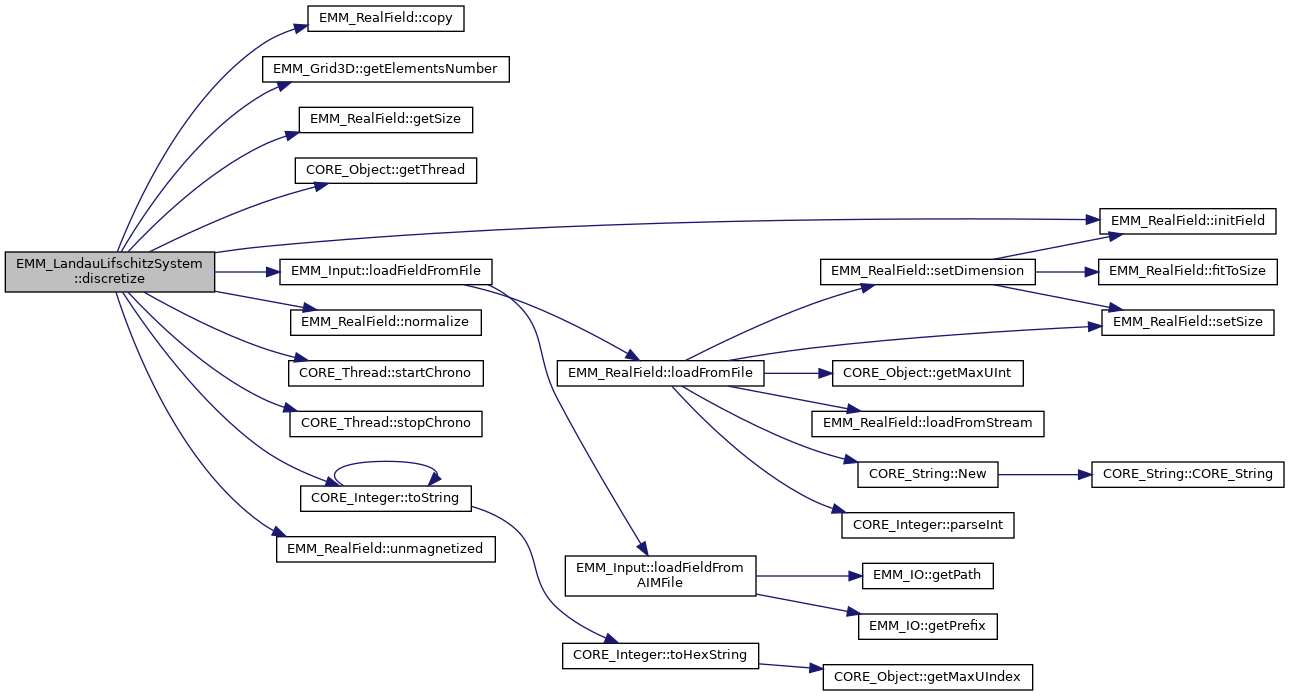

◆ discretize() [2/2]
|
inlineinherited |
discretize the problem
- Returns
- false if one of the following conditon is fullfilled:
- no time descriptor has been set
- no network descriptor has been set
- the discretization of the time failed
- the discretization of the mu field failed and the field init value is set to 0
- the discretization of the operators failed
It :
- creates the relative magnetization at saturation
 and
and  of the landau lifschitz function for each cell if not uniform
of the landau lifschitz function for each cell if not uniform - allocates the memory for the total magnetic excitation field H
- discretizes the associated time see EMM_Stepper::discretize()
- initializes the magnetization field M and normalizes it (see EMM_RealField::normalize() )
- discretized all the operators see EMM_Operator::discretize()
Referenced by EMM_GaussLegendreRelaxation::discretize(), and EMM_LandauLifschitzSystem::getOutputPath().

◆ getBackupsNumber()
|
inlineinherited |
get the backups number
- Returns
- the number of backups
References EMM_LandauLifschitzSystem::mBackupsNumber.
Referenced by EMM_Input::restoreBackup().

◆ getBackupStep()
|
inlineinherited |
get the backup step
- Returns
- the step for backup
References EMM_LandauLifschitzSystem::mBackupStep, EMM_LandauLifschitzSystem::toString(), and tString.

◆ getClassName() [1/2]
|
inherited |
return the class name of the object
- Returns
- the class name of the object
References tString.
Referenced by CORE_Object::getIdentityString(), EMM_Operator::getName(), and CORE_Object::isMemoryChecked().

◆ getClassName() [2/2]
return the class name of the object
- Parameters
-
identityString the identity string of the object
- Returns
- the class name
◆ getDoubleEpsilon()
|
inlinestaticinherited |
get the epsilon value for tDouble type
- Returns
- the epsilon value for tDouble type
Referenced by CORE_Test::testType().
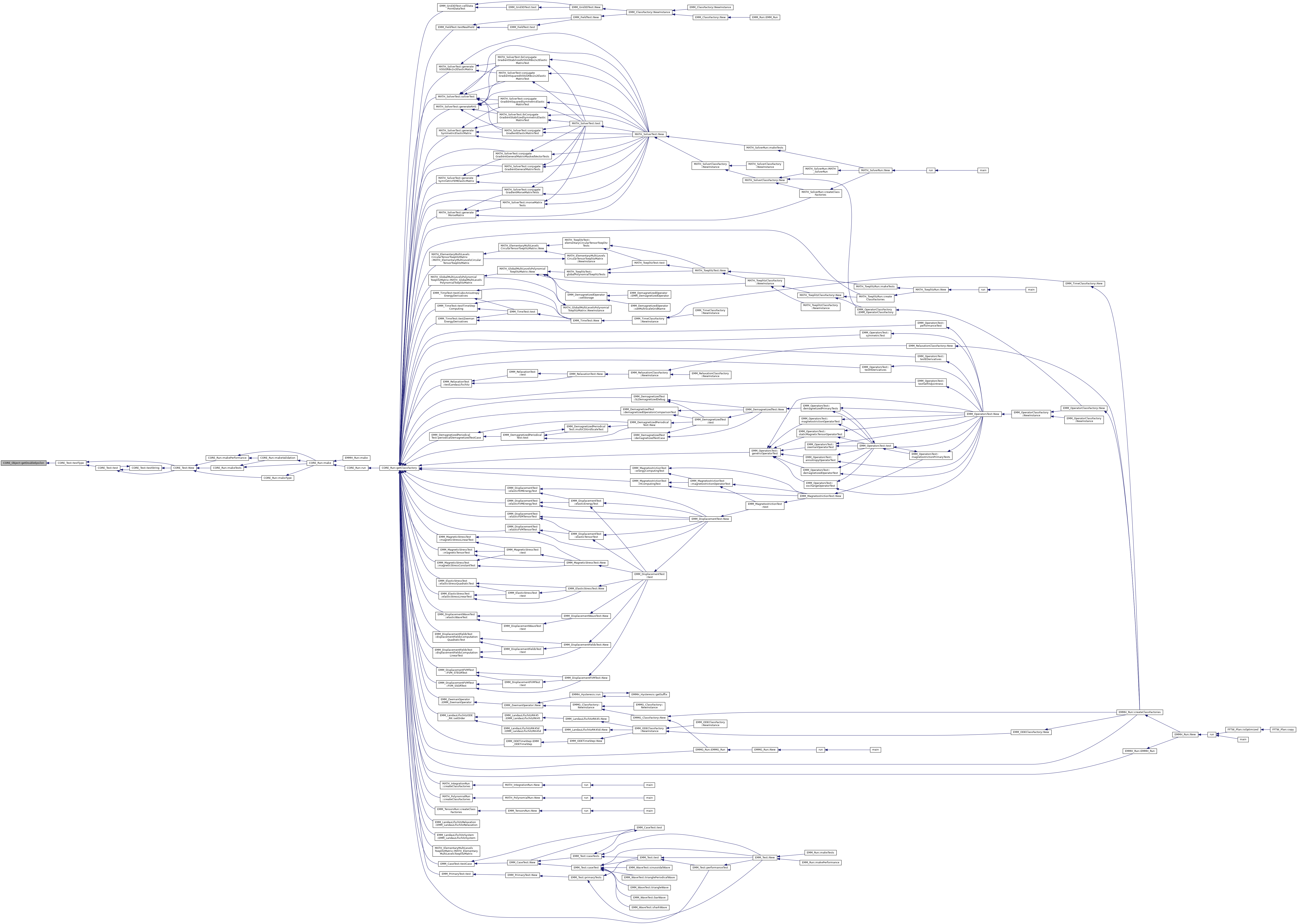
◆ getDoubleInfinity()
|
inlinestaticinherited |
get the infinity value for tFloat type
- Returns
- the intinity value for tFloat type
◆ getEnergies()
|
inlineprotectedinherited |
◆ getEnergiesNumber()
|
inlinestaticinherited |
return the energie number
- Returns
- the energies number
◆ getEnergy()
|
inlineinherited |
return the energy
- Returns
- the energy
References EMM_LandauLifschitzSystem::mEs.
Referenced by EMM_LandauLifschitzRelaxation::computeEnergyTimeDerivativeAtTime(), EMM_GradGaussLegendreRelaxation::computeEnergyTimeDerivatives(), EMMH_Hysteresis::run(), and EMM_Output::saveRelaxation().

◆ getEnergyTimeDerivative() [1/2]
|
inlineinherited |
return the energy and its first derivative with respect to time
- Parameters
-
dE_dt the derivative of E with respect of time
- Returns
- the energy
References EMM_LandauLifschitzSystem::mdE_dt, and EMM_LandauLifschitzSystem::mEs.
◆ getEnergyTimeDerivative() [2/2]
|
inlineprotectedinherited |
get the energgy time derivative
- Returns
- the energies list
References EMM_LandauLifschitzSystem::mdE_dt.
◆ getEpsilon()
|
inlinestaticinherited |
get the epsilon value for T type
- Returns
- the epsilon value for T type
◆ getEvolutionScheme()
|
inlineinherited |
return the evolution scheme between M & opertaor fields
- Returns
- the evolution scheme in {OsM,MOs,M,Os}
- MOs : M(t+dt) =F(M(t),Os(t)) and Os(t+dt)=U(M(t+dt),Os(t))
- OsM : Os(t+dt)=U(M(t),Os(t)) and Ms(t+dt)=F(M(t),Os(t+dt))
- M : M(t+dt) =F(M(t),Os(0))
- Os : Os(t+dt)=U(M(0),Os(t))
References EMM_LandauLifschitzSystem::mEvolutionScheme.
Referenced by computeFieldsAtTime(), and EMM_LandauLifschitzRelaxation::computeFieldsAtTime().

◆ getFloatEpsilon()
|
inlinestaticinherited |
get the epsilon value for tFloat type
- Returns
- the epsilon value for tFloat type
Referenced by CORE_Test::testType().
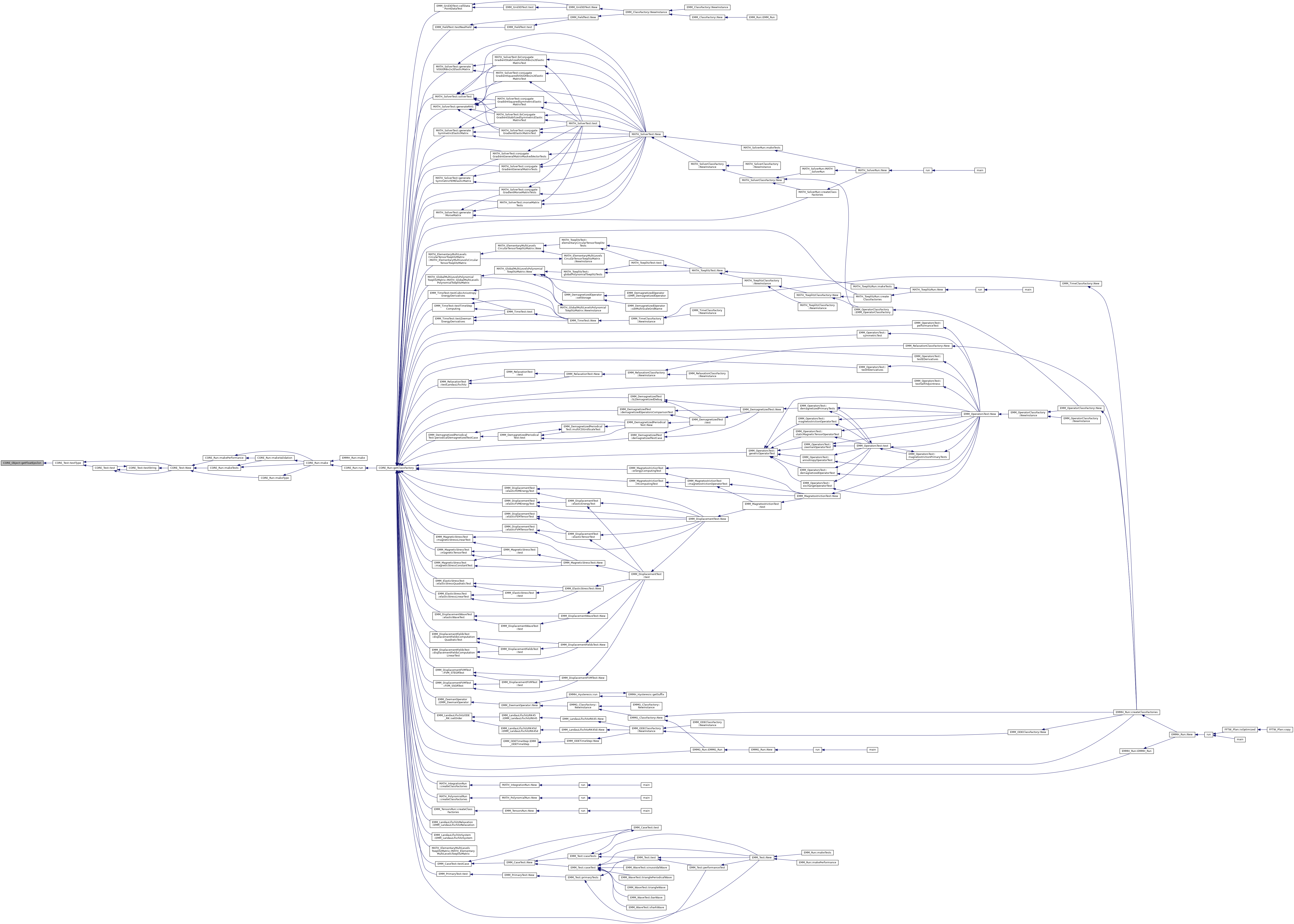
◆ getFloatInfinity()
|
inlinestaticinherited |
get the infinity value for tFloat type
- Returns
- the intinity value for tFloat type
◆ getIdentityString()
|
inlineinherited |
return the identity string of the object of the form className_at_address
- Returns
- the identity string of the object
References CORE_Object::getClassName(), CORE_Object::pointer2String(), and tString.
Referenced by MATH_GaussLegendreIntegration::copy(), EMM_MultiScaleGrid::initialize(), CORE_Object::isInstanceOf(), CORE_Object::printObjectsInMemory(), MATH_Matrix::toString(), EMMG_SLPeriodicMultiScale::toString(), EMM_Stepper::toString(), EMM_AnisotropyDirectionsField::toString(), EMM_BlockMassMatrix::toString(), CORE_Object::toString(), EMM_Tensors::toString(), EMM_MultiScaleGrid::toString(), EMM_MatterField::toString(), EMM_Grid3D::toString(), and EMM_LandauLifschitzSystem::toString().

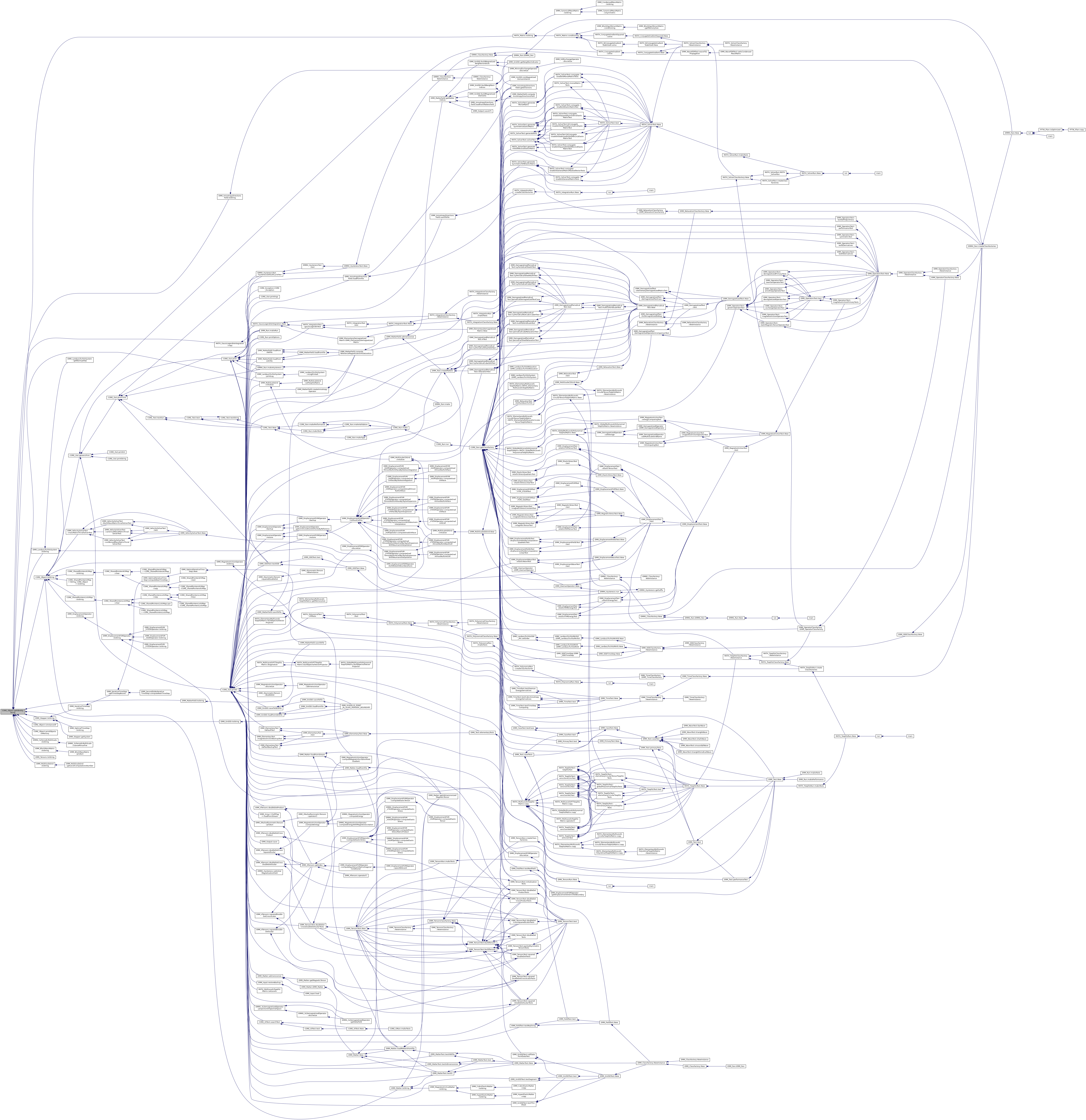
◆ getInfinity()
|
inlinestaticinherited |
get the infinity for T type
- Returns
- the infinity value for T type
◆ getInformation()
|
inlinevirtualinherited |
return the information relativly to ret code of the integrate method
- Parameters
-
retCode : the return code of the relaxation
- Returns
- the information relativly to ret code
References EMM_LandauLifschitzSystem::MIN_CODE.
◆ getLDoubleEpsilon()
|
inlinestaticinherited |
get the epsilon value for tLDouble type
- Returns
- the epsilon value for tLDouble type
Referenced by CORE_Test::testType().

◆ getLDoubleInfinity()
|
inlinestaticinherited |
get the infinity value for tDouble type
- Returns
- the infinity value for tDouble type
◆ getMagneticExcitationField() [1/2]
|
inlineinherited |
get adimensionized magnetic excitation at time 0 of time step
- Returns
- H
Referenced by EMM_LandauLifschitzRelaxation::computeEnergyTimeDerivativeAtTime(), EMM_GradGaussLegendreRelaxation::computeEnergyTimeDerivatives(), EMM_LandauLifschitzSystem::computeMagneticExcitationField(), EMM_OptimalTimeStep::computeOptimalTimeStep(), EMM_LandauLifschitzODE_RKd::integrateMagnetizationFieldAtTime(), EMM_LandauLifschitzODE_RK::integrateMagnetizationFieldAtTime(), EMMH_Hysteresis::run(), and EMM_Output::saveVTI().

◆ getMagneticExcitationField() [2/2]
|
inlineinherited |
get adimensionized magnetic excitation at time 0 of time step
- Returns
- H
References EMM_LandauLifschitzSystem::computeMagneticExcitationField(), and EMM_LandauLifschitzSystem::computeMagnetizationExcitationField().

◆ getMagnetizationField() [1/2]
|
inlineinherited |
return the adimensionized magnetisation field associated to the problem for reading at time 0 of the current time step
- Returns
- M
Referenced by EMM_LandauLifschitzSystem::computeEnergy(), EMM_LandauLifschitzRelaxation::computeEnergyAtTime(), EMM_LandauLifschitzRelaxation::computeEnergyTimeDerivativeAtTime(), EMM_GradGaussLegendreRelaxation::computeEnergyTimeDerivativesAtTime(), EMM_LandauLifschitzSystem::computeMagneticExcitationField(), EMM_LandauLifschitzRelaxation::computeMagnetizationFieldAtTime(), EMM_LandauLifschitzSystem::computeMeanMagnetizationField(), EMM_OptimalTimeStep::computeOptimalTimeStep(), EMM_GaussLegendreRelaxation::discretize(), EMM_DisplacementFVMOperator::discretize(), EMM_DisplacementFEMOperator::discretize(), EMM_DisplacementFVMOperator::resetToInitialState(), EMM_DisplacementFEMOperator::resetToInitialState(), EMM_DisplacementOperator::resetToInitialState(), EMM_DisplacementOperator::restore(), EMM_Input::restoreBackup(), EMMH_Hysteresis::run(), EMM_Output::save(), and EMM_Output::saveVTI().
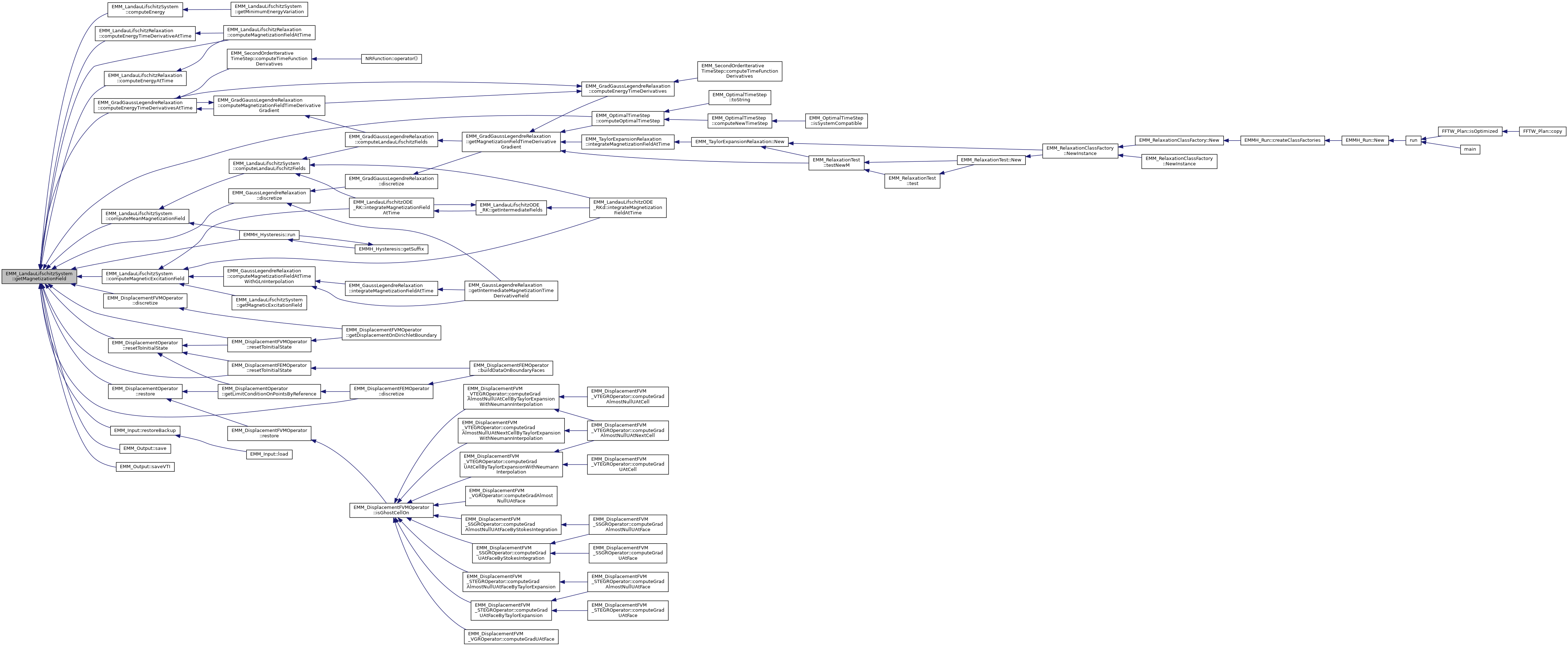
◆ getMagnetizationField() [2/2]
|
inlineinherited |
return the adimensionized magnetizaton field associated to the problem for writing at time 0 of the current time step
- Returns
- M
◆ getMagnetizationFieldTimeDerivative() [1/2]
|
inlineinherited |
get the magnetization variation field with respect to time at time 0 of the current time step
- Returns
- Ft=
 .
.
Referenced by EMM_LandauLifschitzRelaxation::computeEnergyAtTime(), EMM_LandauLifschitzRelaxation::computeEnergyTimeDerivativeAtTime(), EMM_GradGaussLegendreRelaxation::computeEnergyTimeDerivatives(), EMM_GradGaussLegendreRelaxation::computeEnergyTimeDerivativesAtTime(), EMM_LandauLifschitzRelaxation::computeMagnetizationFieldAtTime(), EMM_OptimalTimeStep::computeOptimalTimeStep(), and EMM_LandauLifschitzRelaxation::integrateMagnetizationFieldAtTime().

◆ getMagnetizationFieldTimeDerivative() [2/2]
|
inlineinherited |
get the magnetization variation field with respect to time at time 0 of the current time step
- Returns
- F=
 .
.
◆ getMagnetizedElementsNumber()
|
inlineinherited |
get the number of mage,ntozed elements
Referenced by EMM_LandauLifschitzODE_RKd::integrateMagnetizationFieldAtTime(), and EMM_LandauLifschitzODE_RK::integrateMagnetizationFieldAtTime().

◆ getMatterField() [1/2]
|
inlineinherited |
return the matter index for each cell for reading
- Returns
- the matter indices array
Referenced by EMM_MinimalExchangeOperator::discretize(), EMM_LinearAnisotropyOperator::discretize(), EMM_AnisotropyOperator::discretize(), EMM_DisplacementFVMOperator::discretize(), EMM_DisplacementOperator::discretize(), and EMM_Output::saveVTI().

◆ getMatterField() [2/2]
|
inlineinherited |
return the matter index for each cell for writing
- Returns
- the matter indices array
◆ getMaxChar()
|
inlinestaticinherited |
get the max value for tChar type
- Returns
- the max value for tChar type
Referenced by CORE_Test::testType().

◆ getMaxDouble()
|
inlinestaticinherited |
get the max value for tDouble type
- Returns
- the max value for tDouble type
Referenced by CORE_Test::testType().
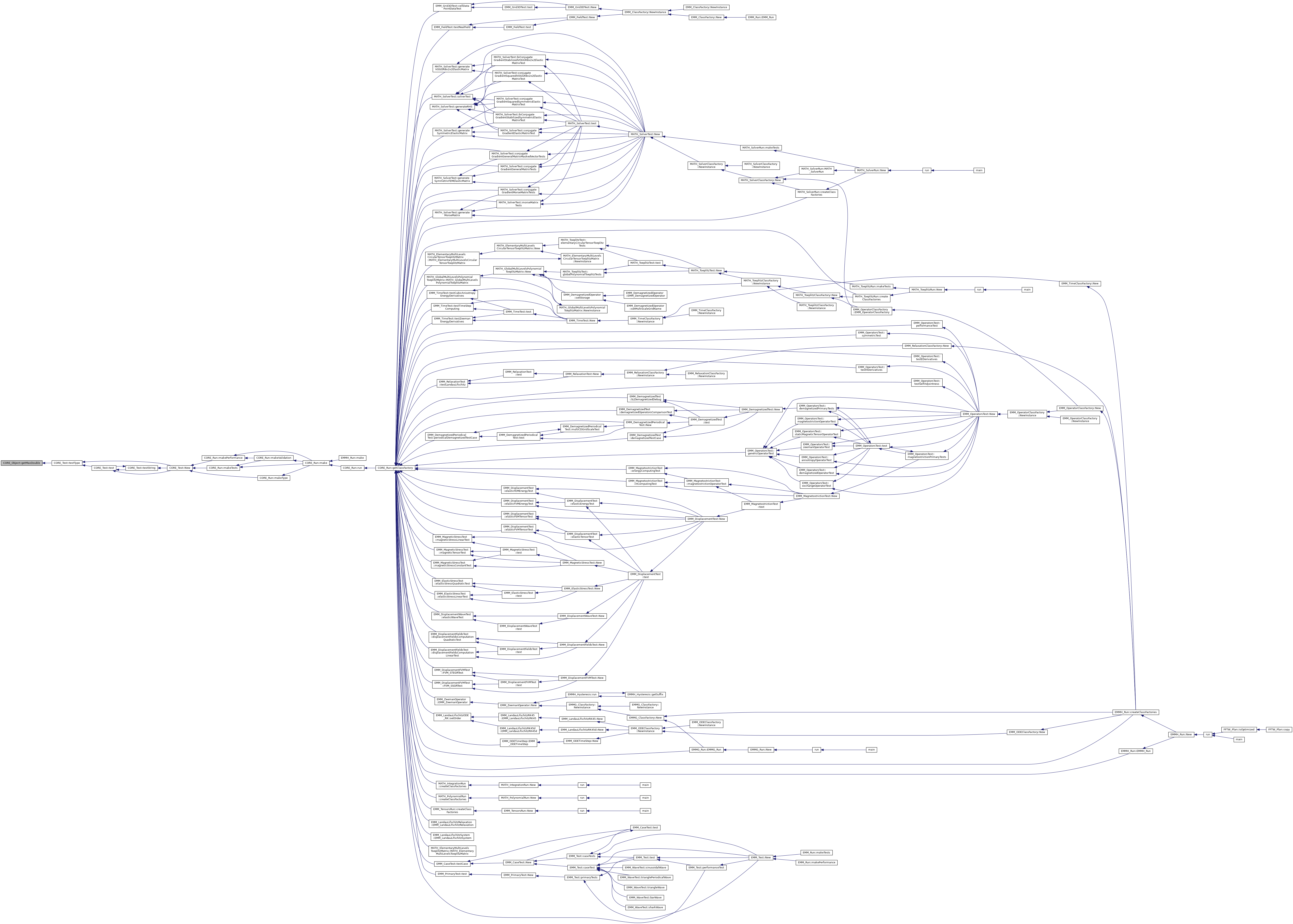
◆ getMaxFlag()
|
inlinestaticinherited |
get the max value for the tFlag type
- Returns
- the max value for the tFlag type
Referenced by CORE_Test::testType().

◆ getMaxFloat()
|
inlinestaticinherited |
get the max value for tFloat type
- Returns
- the max value for tFloat type
Referenced by CORE_Test::testType().
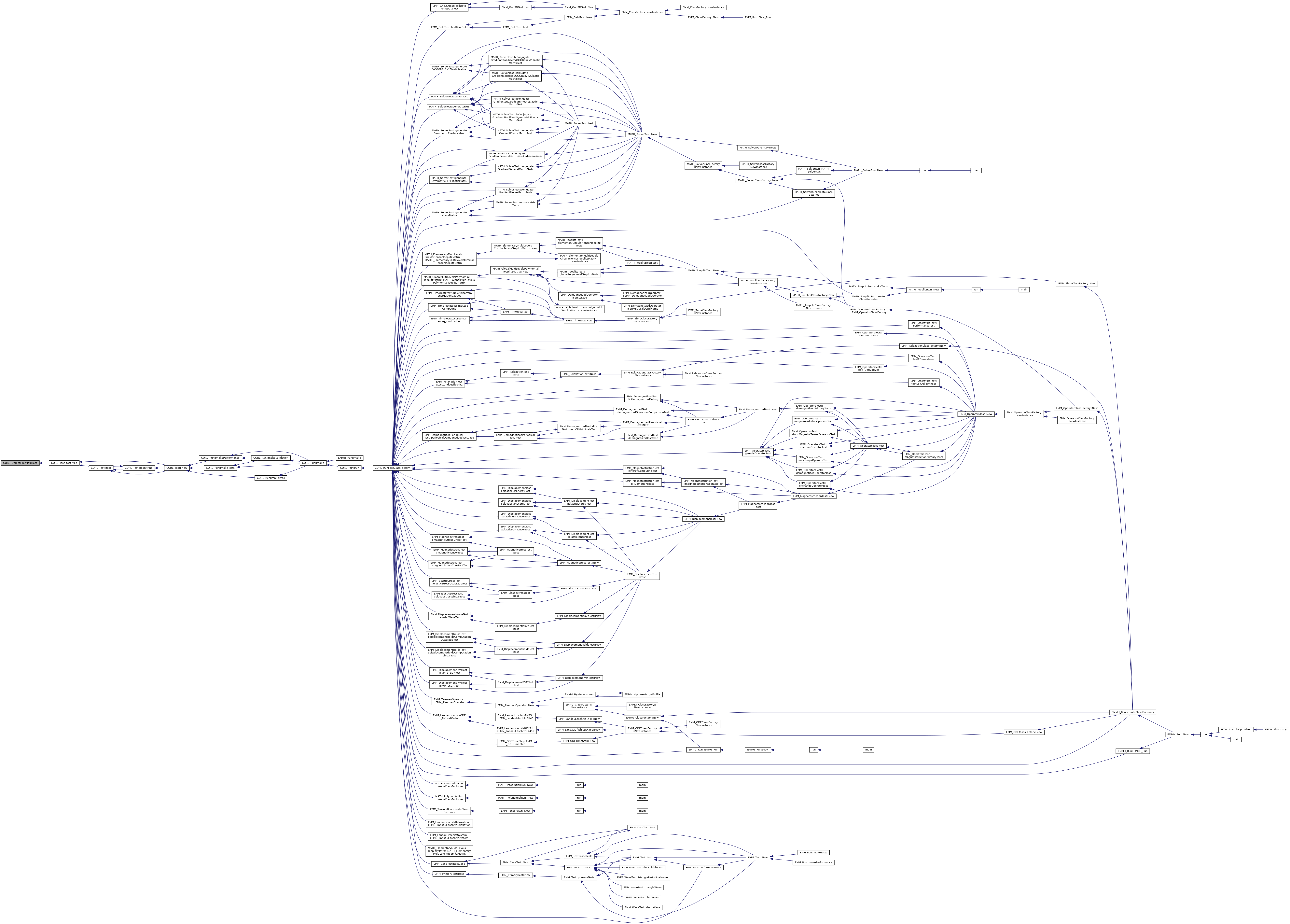
◆ getMaxIndex()
|
inlinestaticinherited |
get the max value for the array/vector indexing type
- Returns
- the max value for the array/vector indexing type
Referenced by CORE_Test::testType().
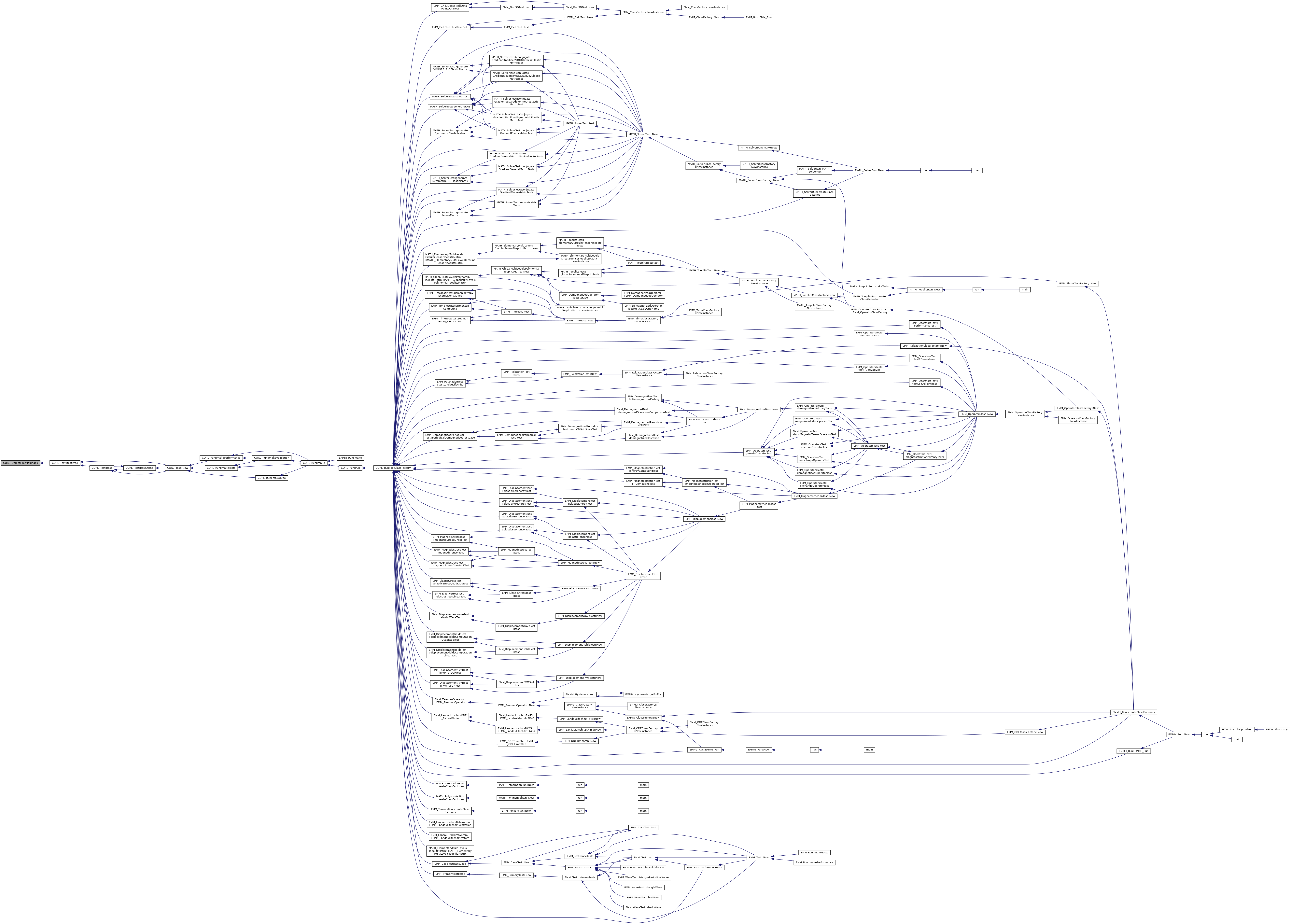
◆ getMaxInt()
|
inlinestaticinherited |
get the max value for tInt type
- Returns
- the max value for tInt type
Referenced by MATSGN_FFT::fastFourierTransform3D_FFTW(), and CORE_Test::testType().

◆ getMaxInteger()
|
inlinestaticinherited |
get the max value for the integer type
- Returns
- the max value for the integer type
Referenced by CORE_Test::testType().
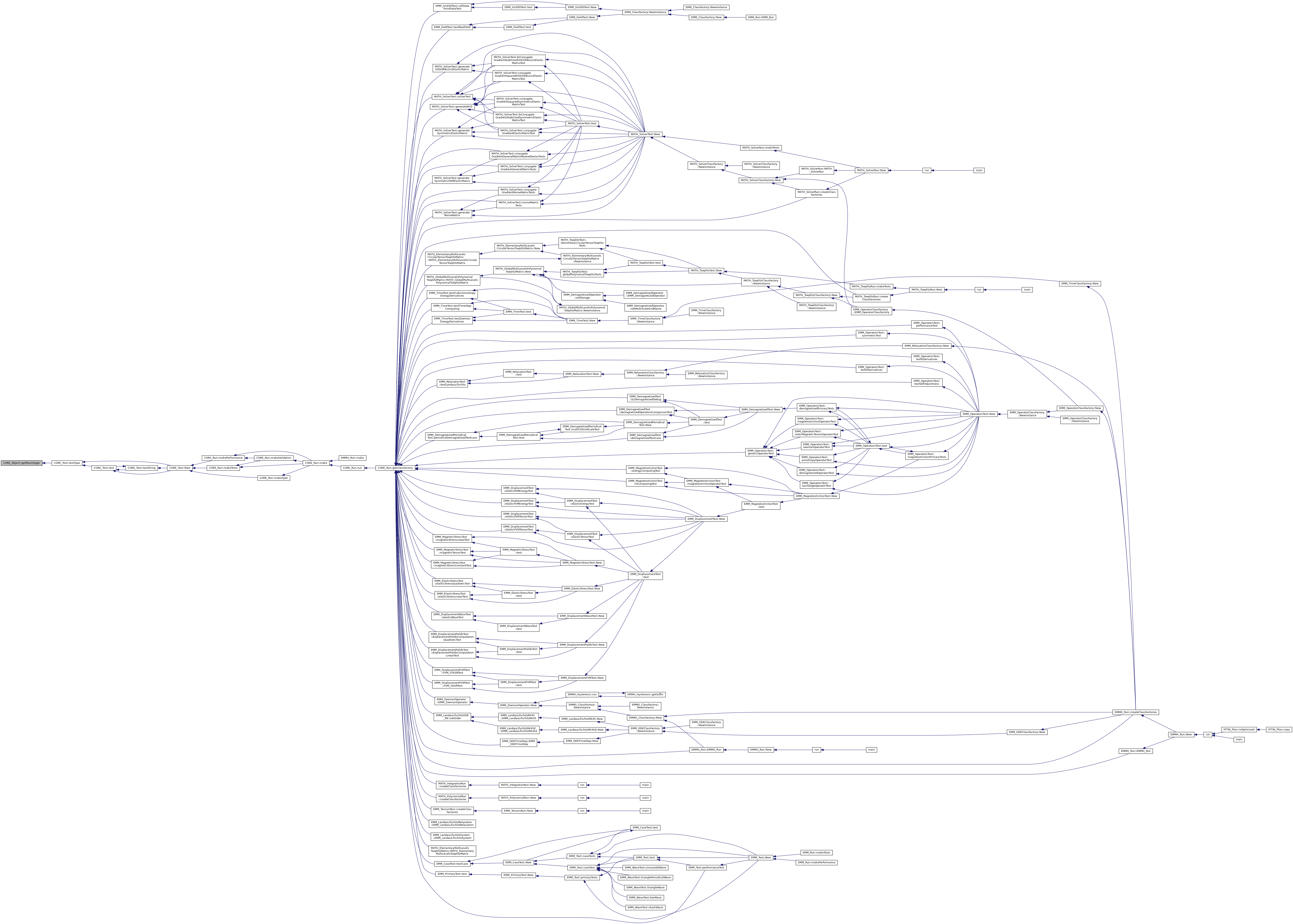
◆ getMaxLDouble()
|
inlinestaticinherited |
get the max value for tLDouble type
- Returns
- the max value for tLDouble type
Referenced by CORE_Test::testType().
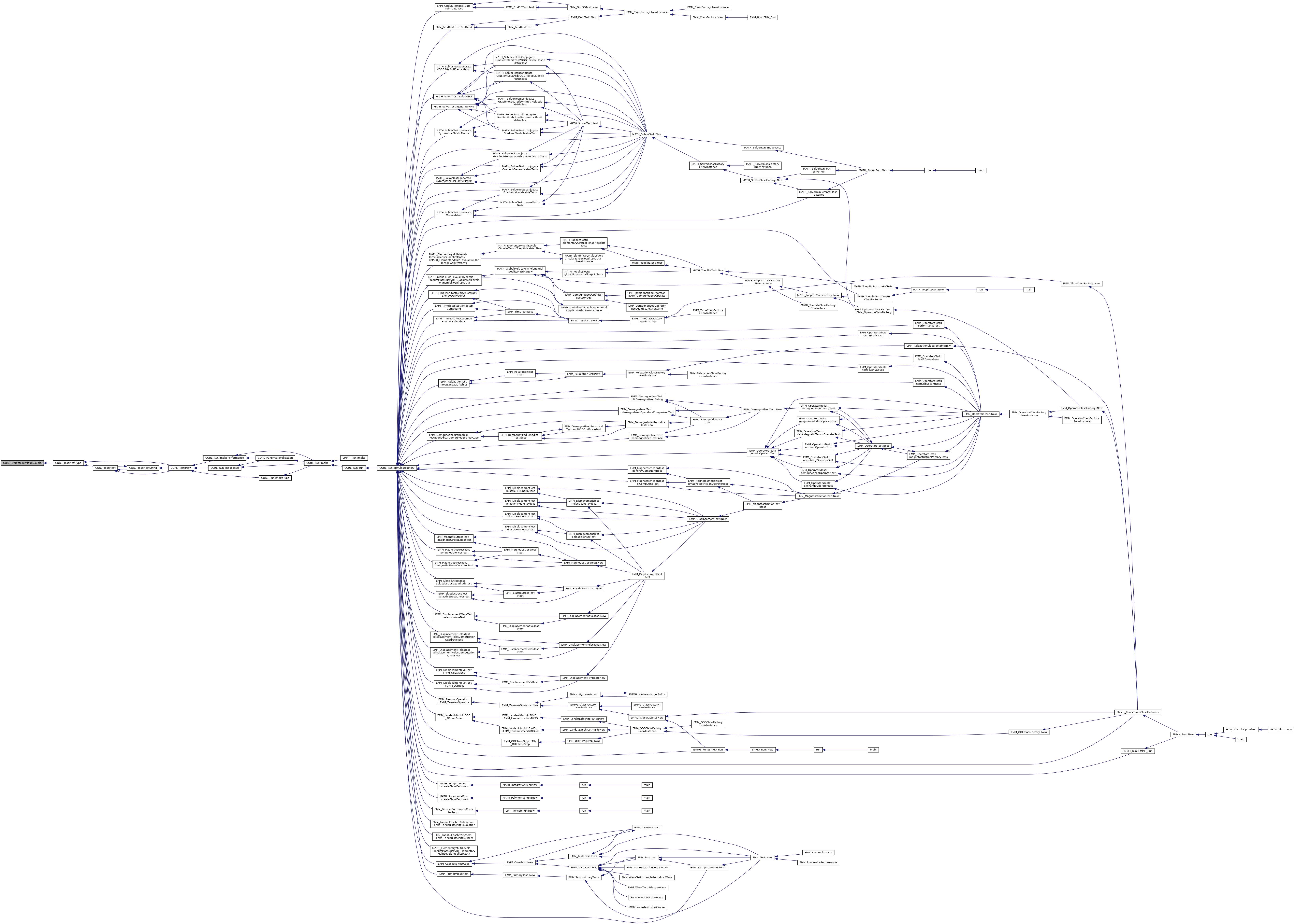
◆ getMaxLInt()
|
inlinestaticinherited |
get the max value for tLInt type
- Returns
- the max value for tLInt type
Referenced by CORE_Test::testType().

◆ getMaxLLInt()
|
inlinestaticinherited |
get the max value for tULInt type
- Returns
- the max value for tULInt type
Referenced by CORE_Test::testType().
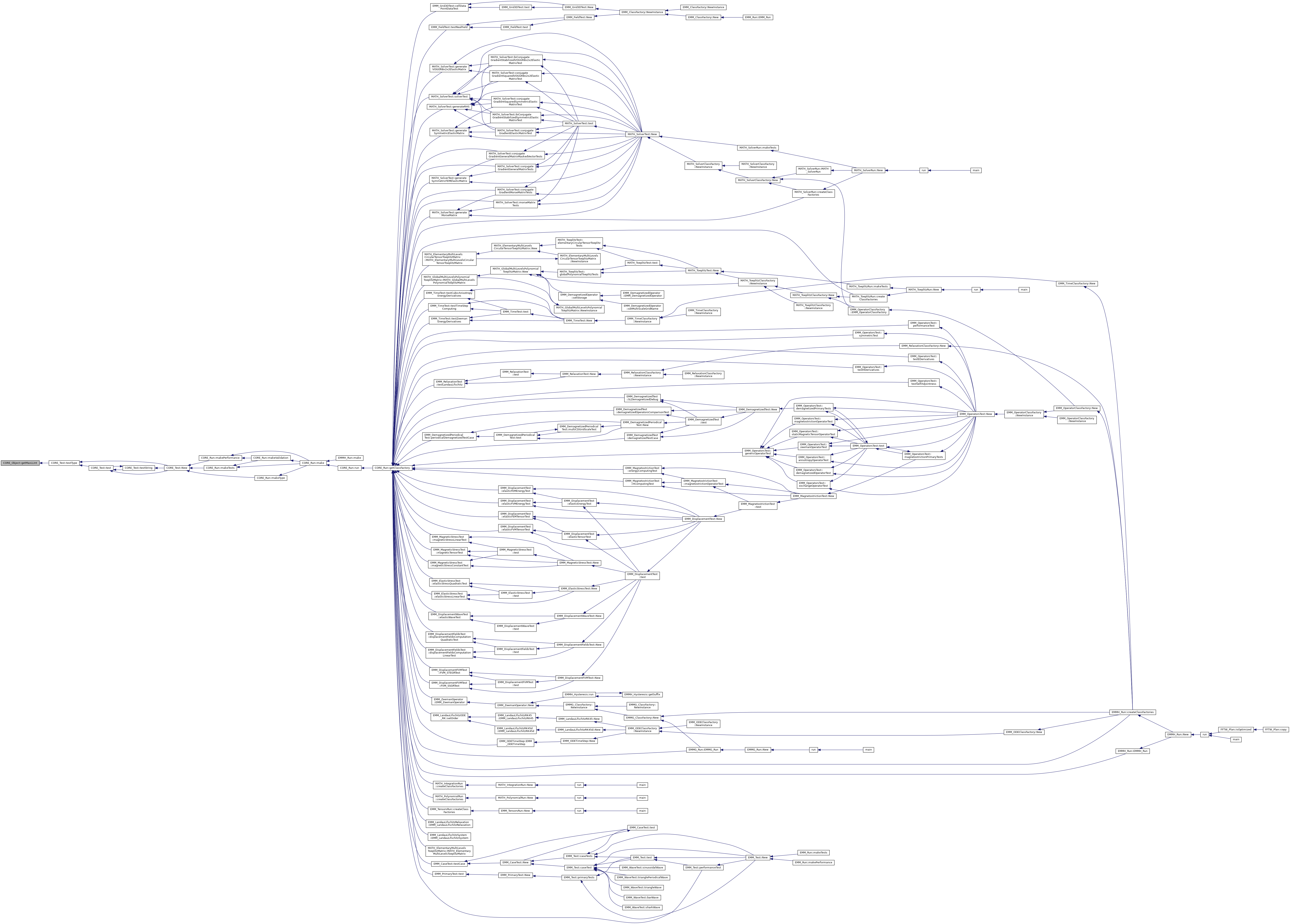
◆ getMaxReal()
|
inlinestaticinherited |
get the max value for the real type
- Returns
- he max value for the real type
Referenced by EMM_MatterField::adimensionize(), and CORE_Test::testType().

◆ getMaxSInt()
|
inlinestaticinherited |
get the max value for tSInt type
- Returns
- the max value for tSInt type
Referenced by CORE_Test::testType().
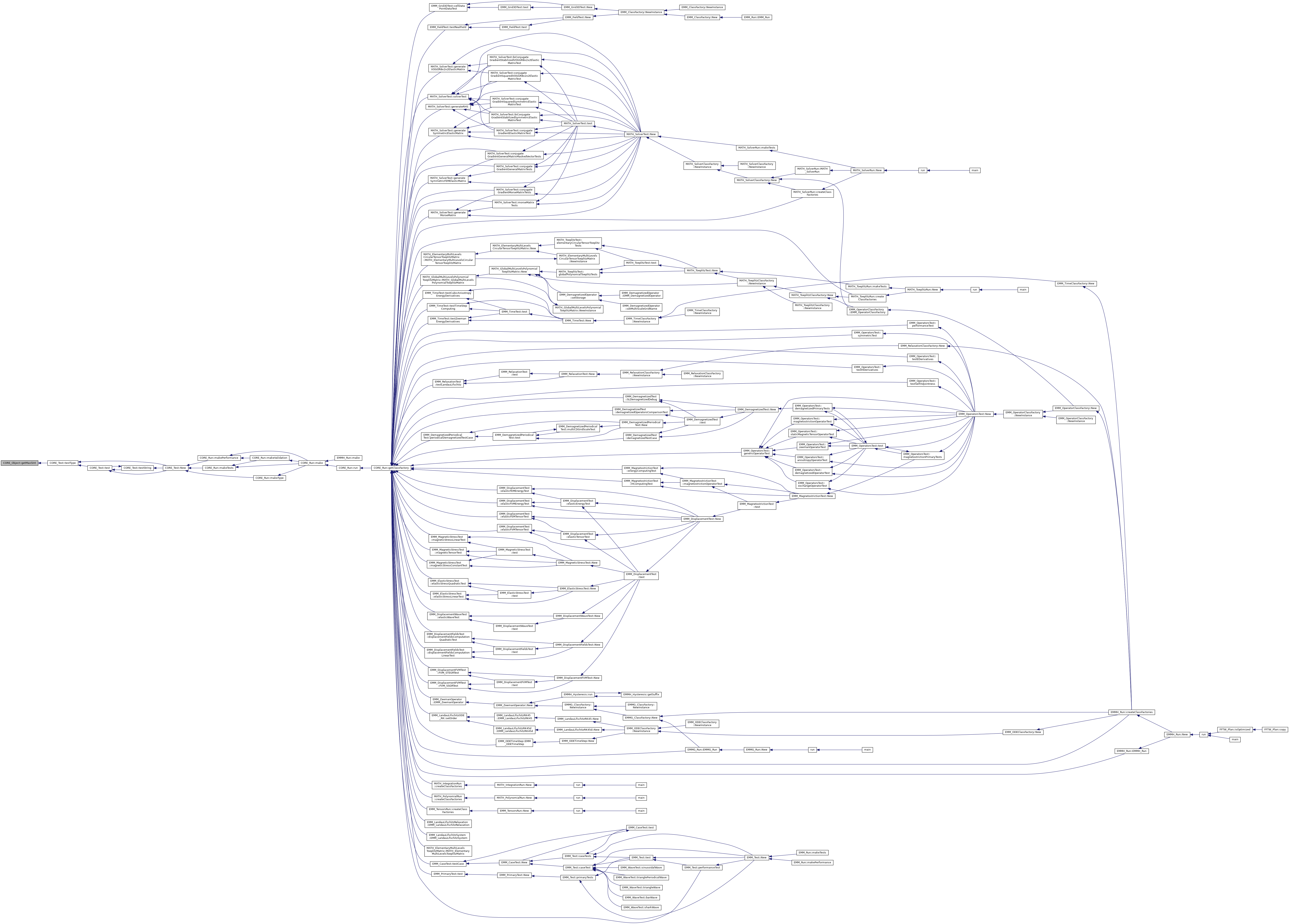
◆ getMaxUChar()
|
inlinestaticinherited |
get the max value for tUChar type
- Returns
- the max value for tUChar type
Referenced by CORE_Test::testType().
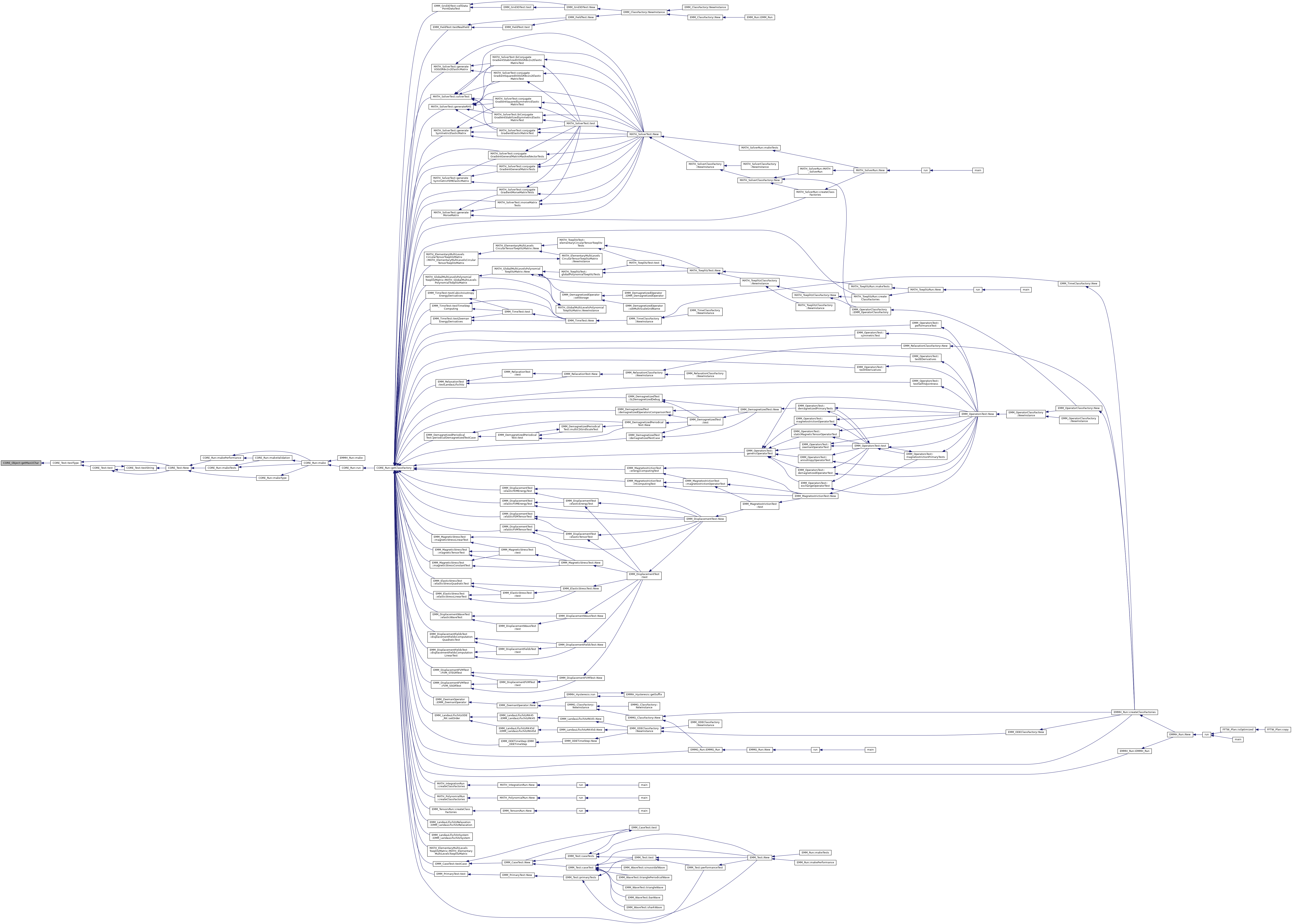
◆ getMaxUIndex()
|
inlinestaticinherited |
get the max value for difference the array/vector indexing type
- Returns
- the max value for difference the array/vector indexing type
Referenced by CORE_Vector< T >::addAfterIndices(), CORE_Vector< T >::search(), CORE_Test::testType(), CORE_Integer::toHexString(), and CORE_Integer::toString().
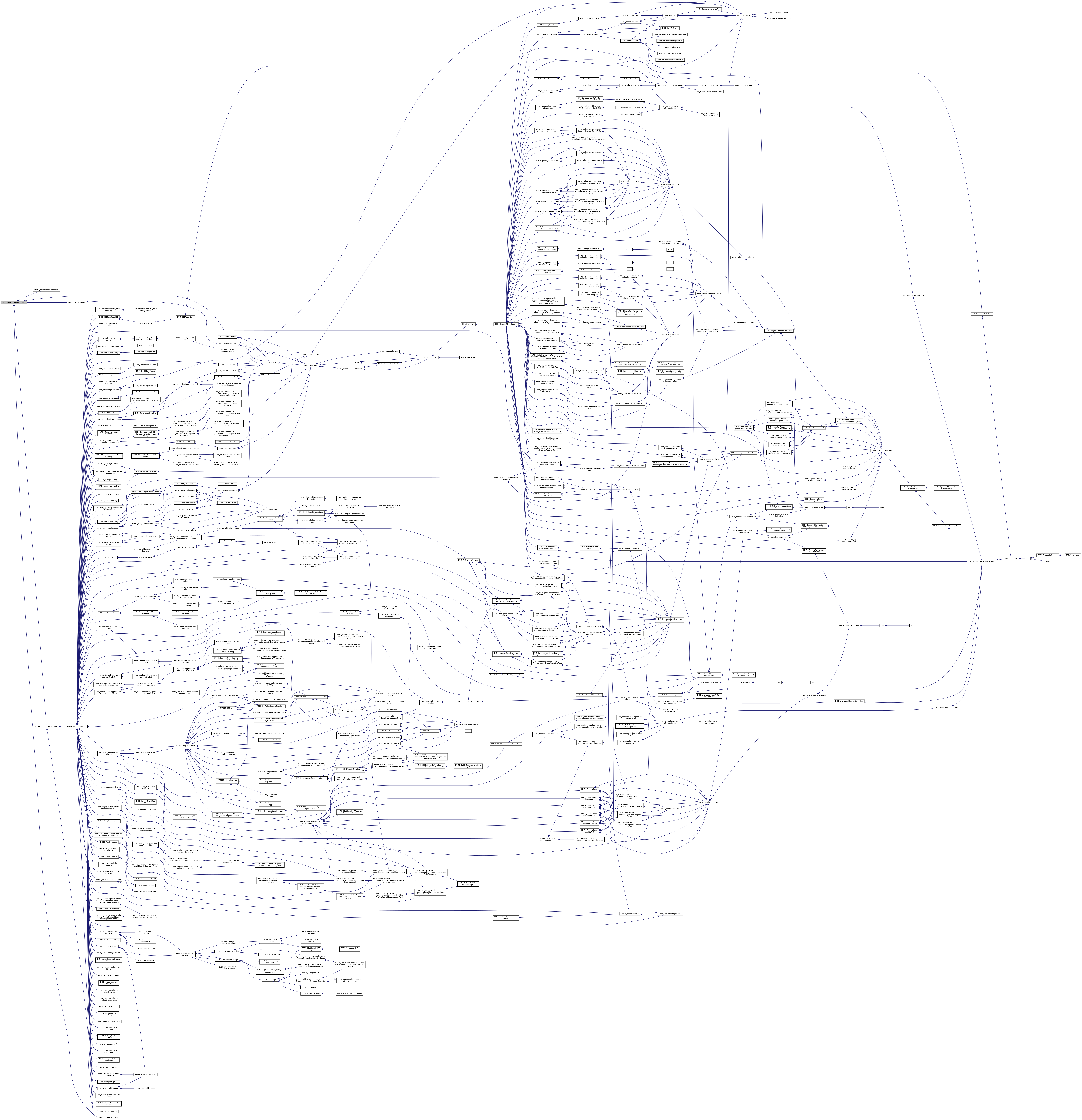
◆ getMaxUInt()
|
inlinestaticinherited |
get the max value for tUInt type
- Returns
- the max value for tUInt type
Referenced by EMM_Array< tCellFlag >::loadFromFile(), EMM_RealField::loadFromFile(), and CORE_Test::testType().

◆ getMaxUInteger()
|
inlinestaticinherited |
get the max value for the unsigned integer type
- Returns
- the max value for the unsigned integer type
Referenced by MATH_Pn::computeExtrenums(), EMM_MultiScaleGrid::computeLevelsNumber(), EMM_Input::restoreBackup(), MATH_P0::solve(), and CORE_Test::testType().

◆ getMaxULInt()
|
inlinestaticinherited |
get the max value for tULInt type
- Returns
- the max value for tULInt type
Referenced by CORE_Test::testType().
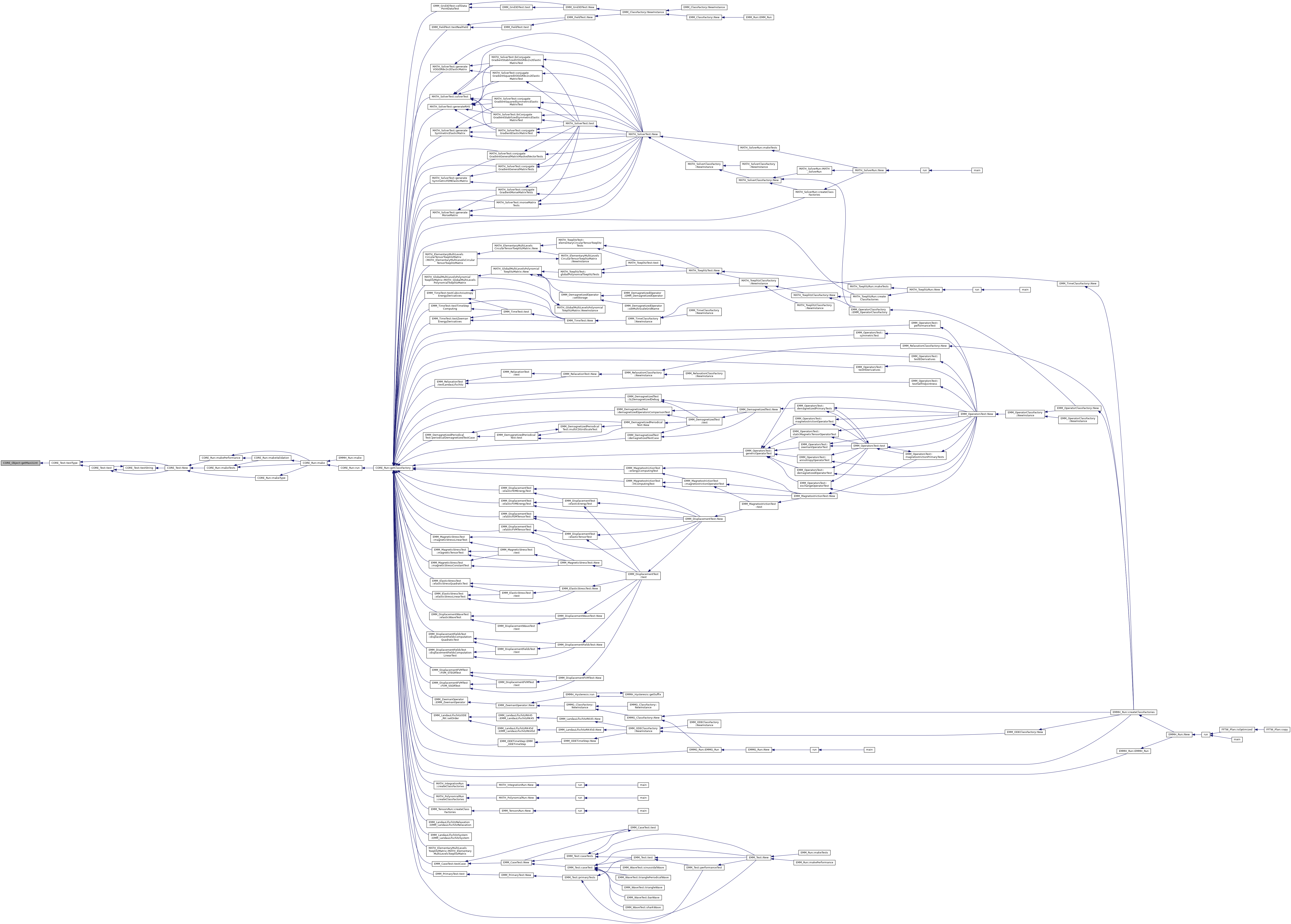
◆ getMaxULLInt()
|
inlinestaticinherited |
get the max value for tULLInt type
- Returns
- the max value for tULLInt type
Referenced by CORE_Test::testType().
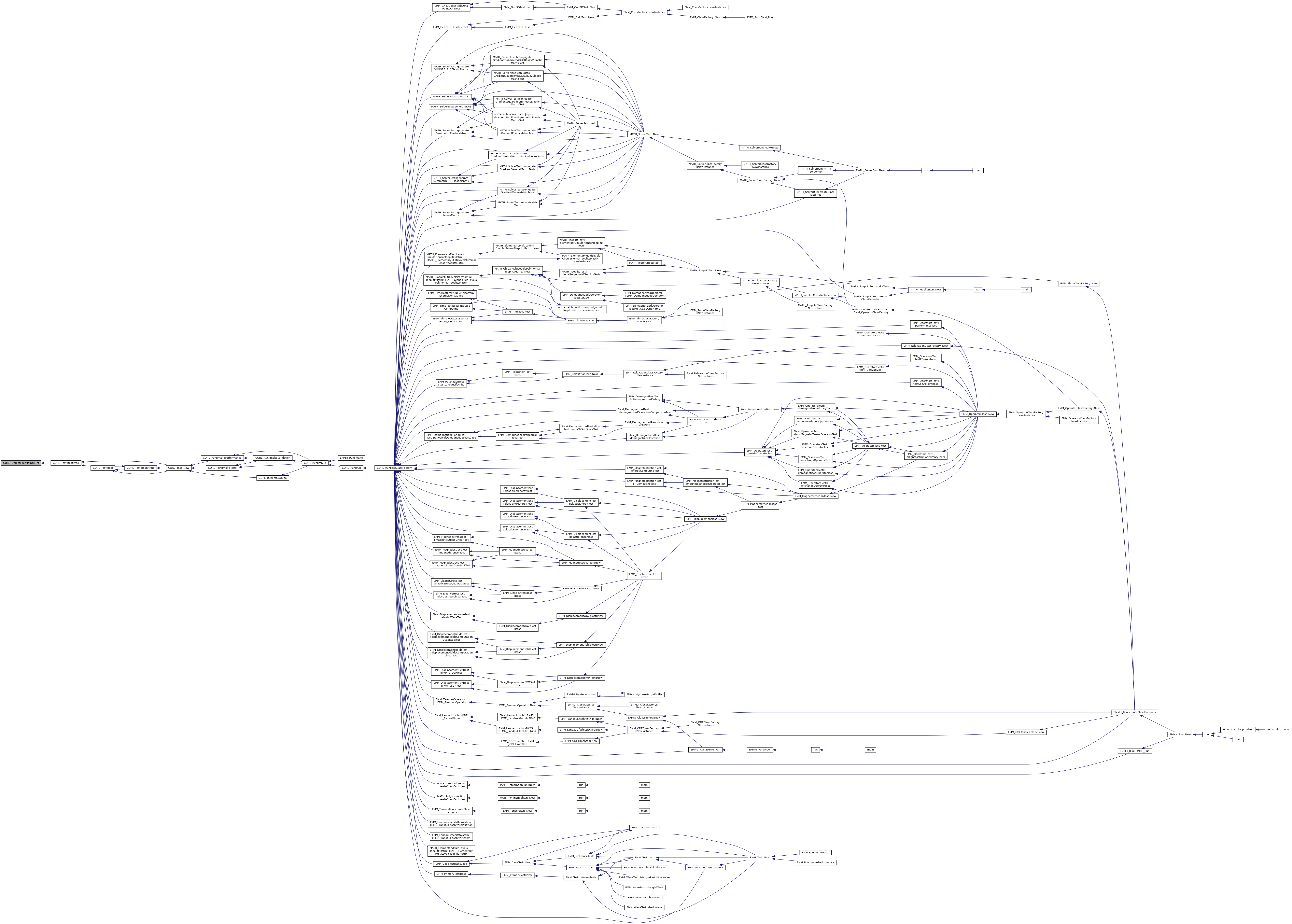
◆ getMaxUSInt()
|
inlinestaticinherited |
get the max value for tUSInt type
- Returns
- the max value for tUSInt type
Referenced by CORE_Test::testType().

◆ getMesh() [1/2]
|
inlineinherited |
return the mesh associated to the problem for reading
- Returns
- the mesh
Referenced by EMM_LandauLifschitzSystem::computeEnergyTimeDerivative(), EMM_GradGaussLegendreRelaxation::computeEnergyTimeDerivatives(), EMM_GradGaussLegendreRelaxation::computeEnergyTimeDerivativesAtTime(), EMM_LandauLifschitzSystem::computeMeanField(), EMM_LandauLifschitzSystem::computeMeanMagnetizationField(), EMM_StaticMagneticTensorOperator::discretize(), EMM_MinimalExchangeOperator::discretize(), EMM_LinearAnisotropyOperator::discretize(), EMM_StaticMagnetostrictionOperator::discretize(), EMM_Operator::discretize(), EMM_AnisotropyOperator::discretize(), EMM_DemagnetizedOperator::discretize(), EMM_DisplacementFVMOperator::discretize(), EMMG_SLDemagnetizedOperator::discretize(), EMM_ZeemanOperator::discretize(), EMM_DisplacementFEMOperator::discretize(), EMM_DisplacementOperator::discretize(), EMM_LandauLifschitzODE_RKd::integrateMagnetizationFieldAtTime(), EMM_LandauLifschitzODE_RK::integrateMagnetizationFieldAtTime(), EMM_DisplacementFVMOperator::resetToInitialState(), EMM_ZeemanOperator::resetToInitialState(), EMM_DisplacementOperator::resetToInitialState(), and EMM_Output::saveVTI().

◆ getMesh() [2/2]
|
inlineinherited |
return the mesh associated to the problem for writing
- Returns
- the mesh
◆ getMinChar()
|
inlinestaticinherited |
get the min value for tChar type
- Returns
- the min value for tChar type
Referenced by CORE_Test::testType().
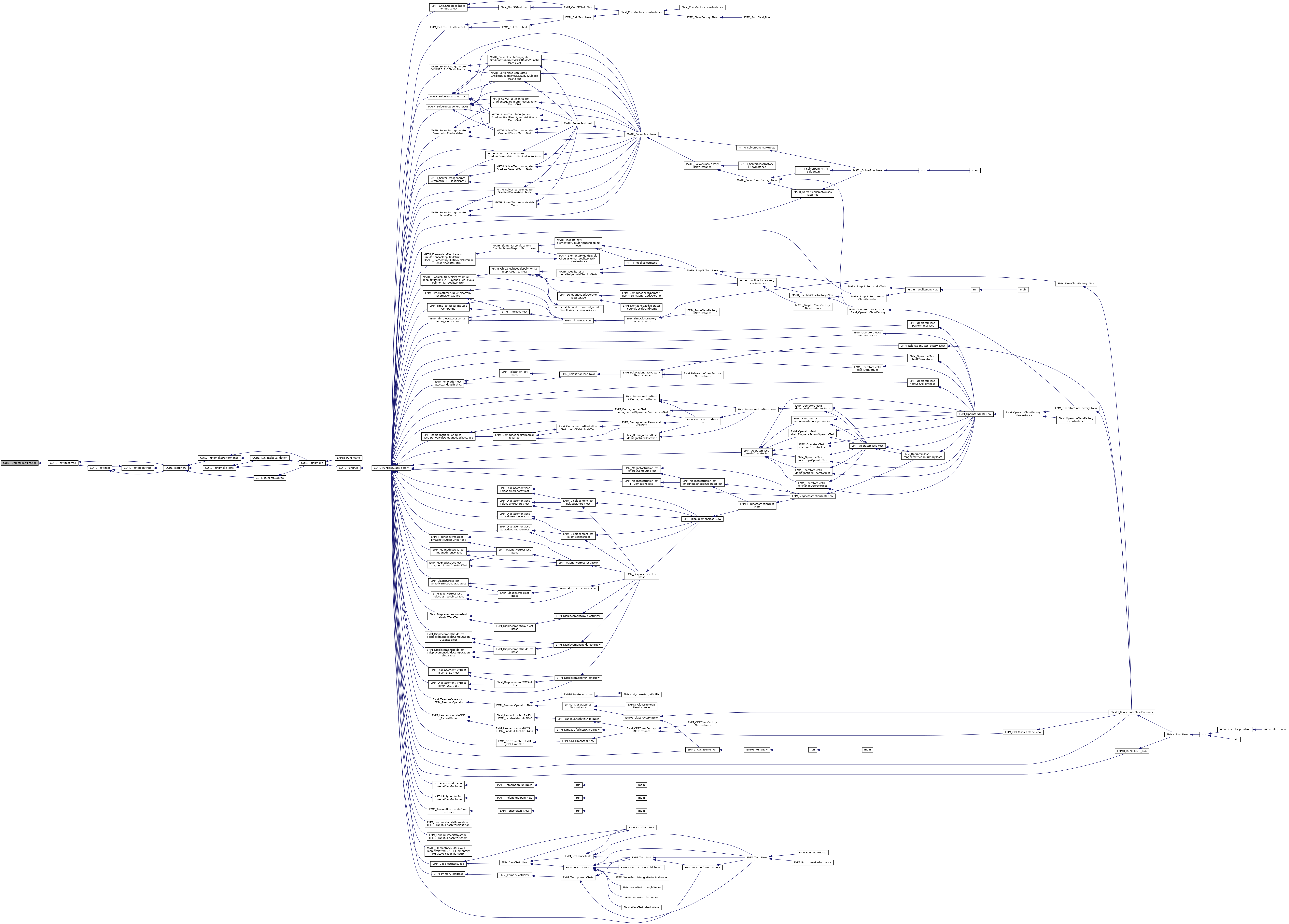
◆ getMinDouble()
|
inlinestaticinherited |
get the min value for tDouble type
- Returns
- the min value for tDouble type
Referenced by CORE_Test::testType().

◆ getMinFlag()
|
inlinestaticinherited |
get the min value for the tFlag type
- Returns
- the min value for the tFlag type
Referenced by CORE_Test::testType().
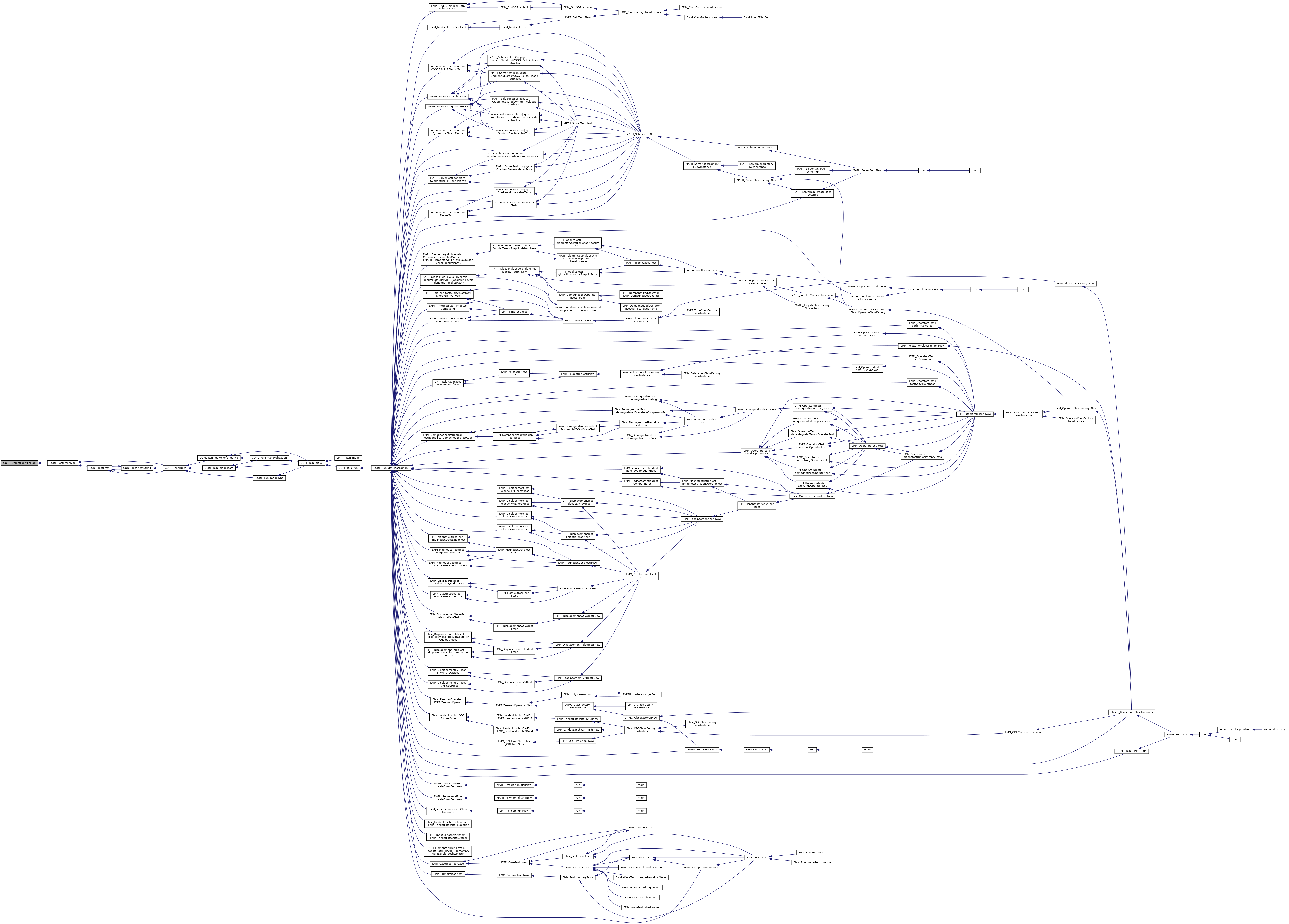
◆ getMinFloat()
|
inlinestaticinherited |
get the min value for tFloat type
- Returns
- the min value for tFloat type
Referenced by CORE_Test::testType().
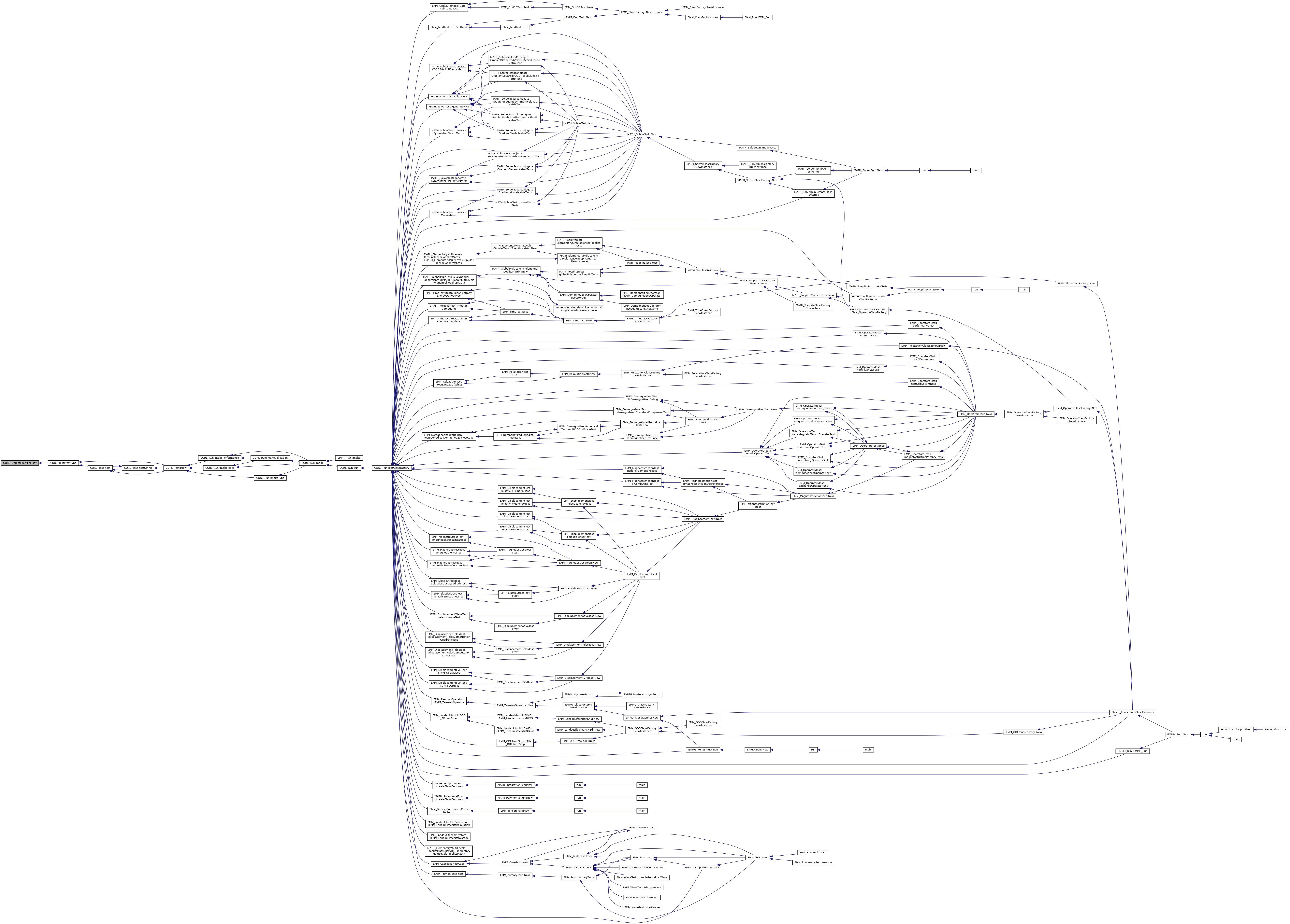
◆ getMinimumEnergyVariation()
|
inlineinherited |
get minimum energy variation under which the relaxation is supposed to be reached
- Returns
- the minimum energy variation
References EMM_LandauLifschitzSystem::computeEnergy(), EMM_LandauLifschitzSystem::mMinEnergyVariation, and tReal.

◆ getMinimumTimeStep()
|
inlineinherited |
get minimum time step under which the relaxation process is supposed to be reached
- Returns
- the min time step
References EMM_LandauLifschitzSystem::getTime(), EMM_LandauLifschitzSystem::getTimeStep(), EMM_LandauLifschitzSystem::getTimeStepsNumber(), EMM_LandauLifschitzSystem::mMinDt, tReal, and tUInteger.
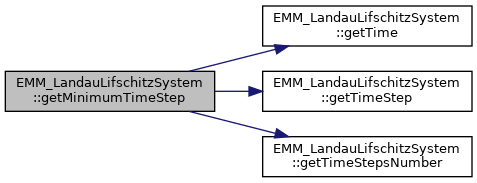
◆ getMinIndex()
|
inlinestaticinherited |
get the min value for the array/vector indexing type
- Returns
- the min value for the array/vector indexing type
Referenced by CORE_Test::testType().
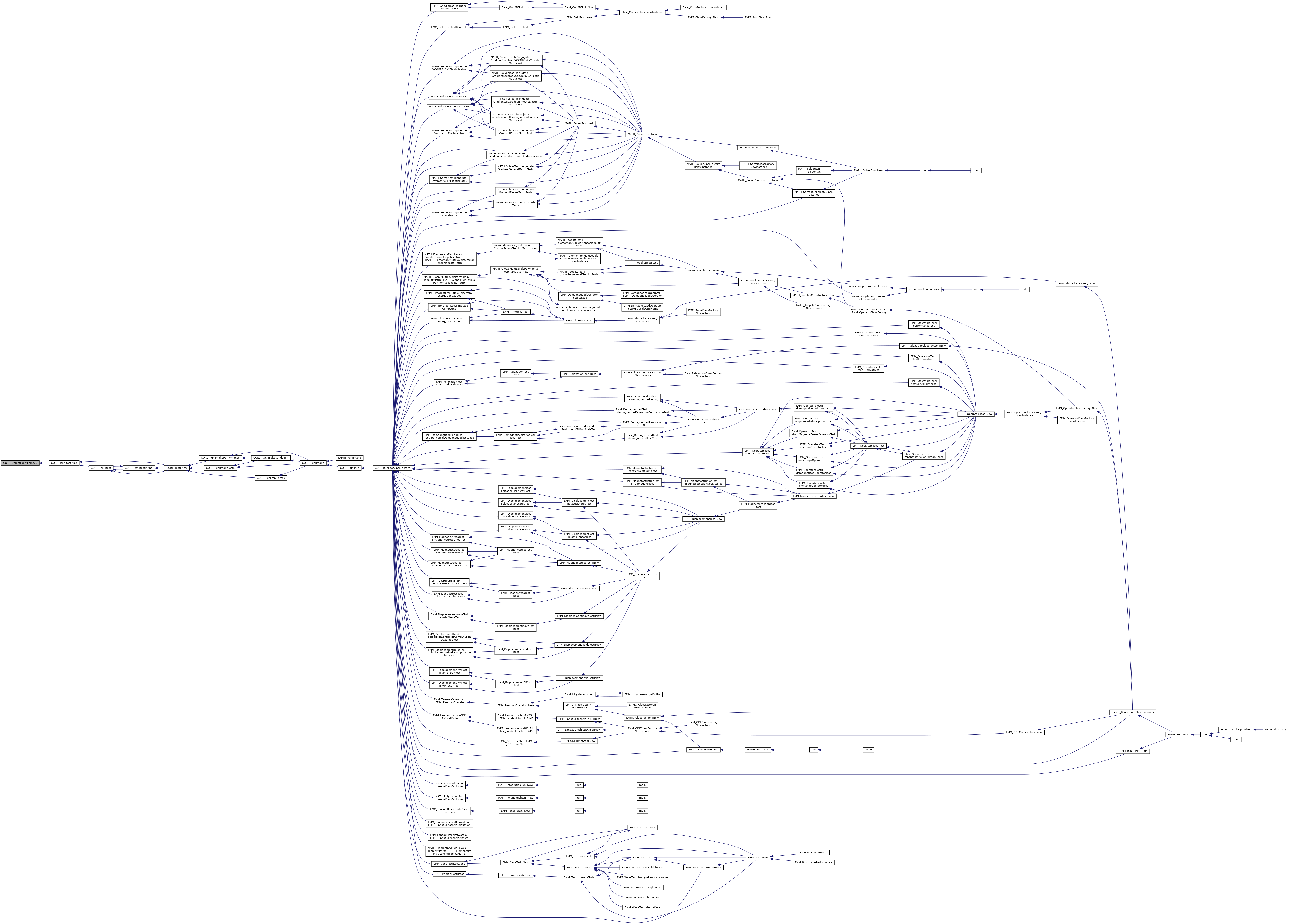
◆ getMinInt()
|
inlinestaticinherited |
get the min value for tInt type
- Returns
- the min value for tInt type
Referenced by CORE_Test::testType().
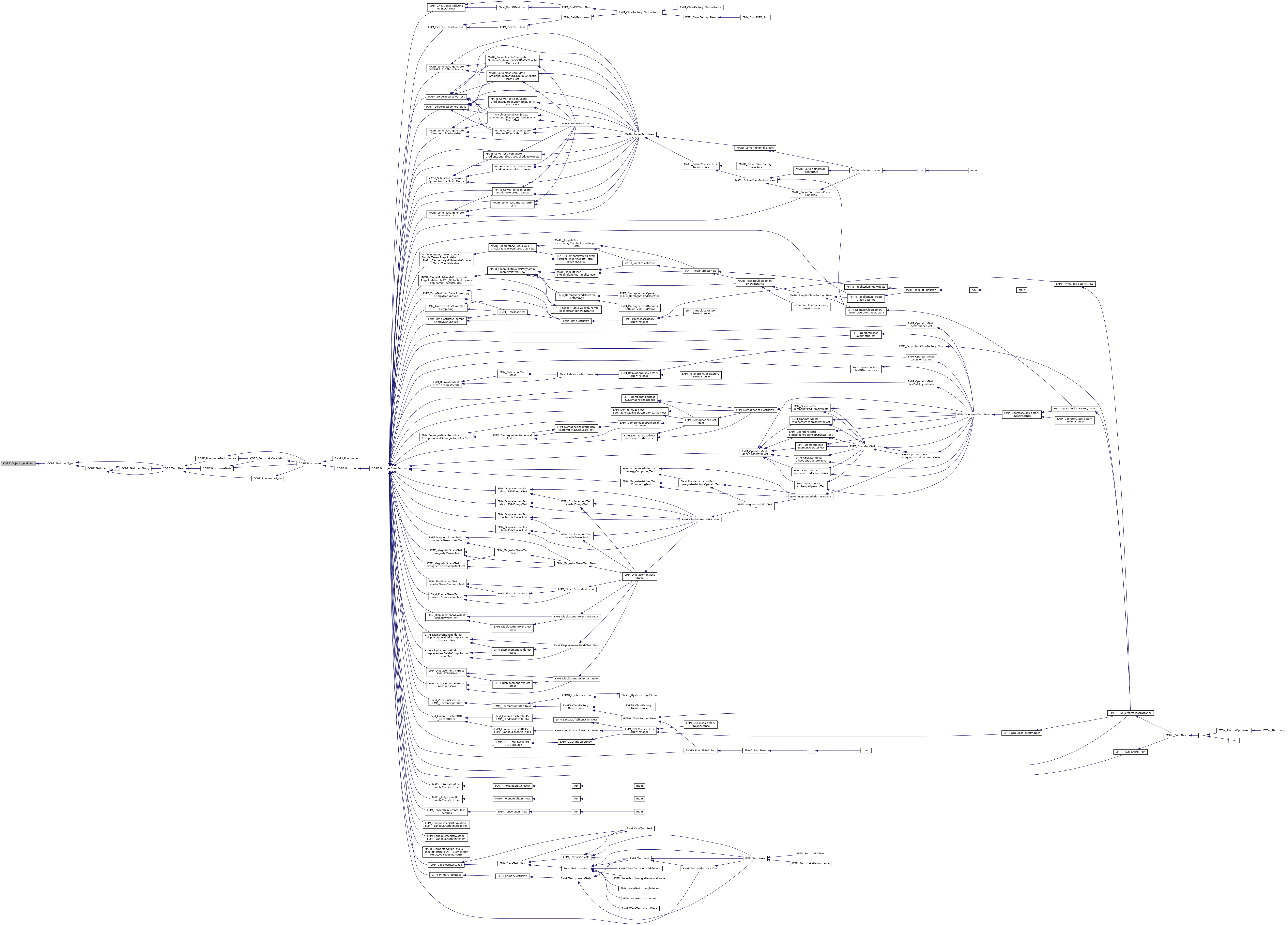
◆ getMinInteger()
|
inlinestaticinherited |
get the min value for the integer type
- Returns
- the minin value for the integer type
Referenced by CORE_Test::testType().

◆ getMinLDouble()
|
inlinestaticinherited |
get the min value for tLDouble type
- Returns
- the min value for tLDouble type
Referenced by CORE_Test::testType().

◆ getMinLInt()
|
inlinestaticinherited |
get the min value for tLInt type
- Returns
- the min value for tLInt type
Referenced by CORE_Test::testType().
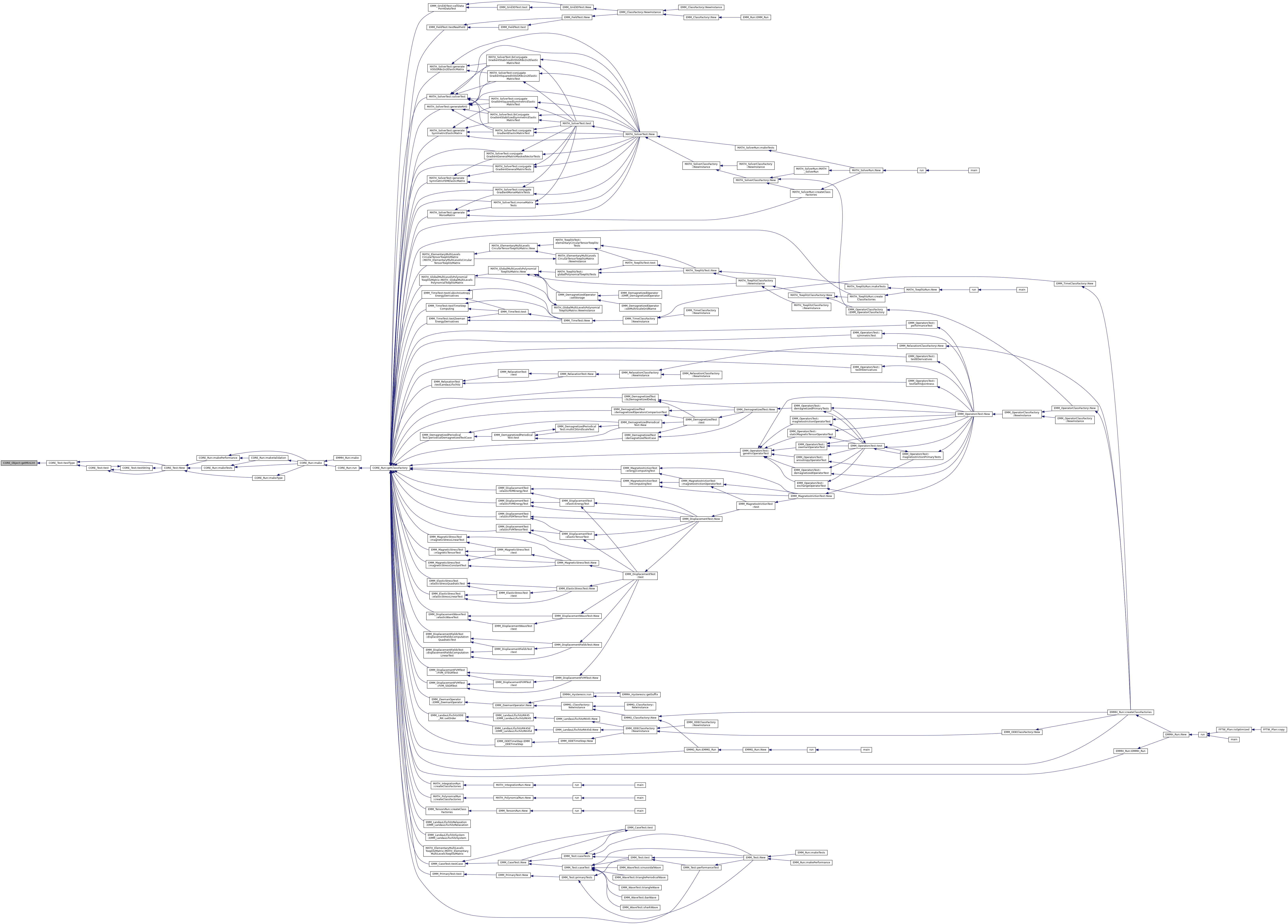
◆ getMinLLInt()
|
inlinestaticinherited |
get the min value for tLLInt type
- Returns
- the min value for tLLInt type
Referenced by CORE_Test::testType().

◆ getMinReal()
|
inlinestaticinherited |
get the min value for the real type
- Returns
- the min value for the real type
Referenced by CORE_Test::testType().
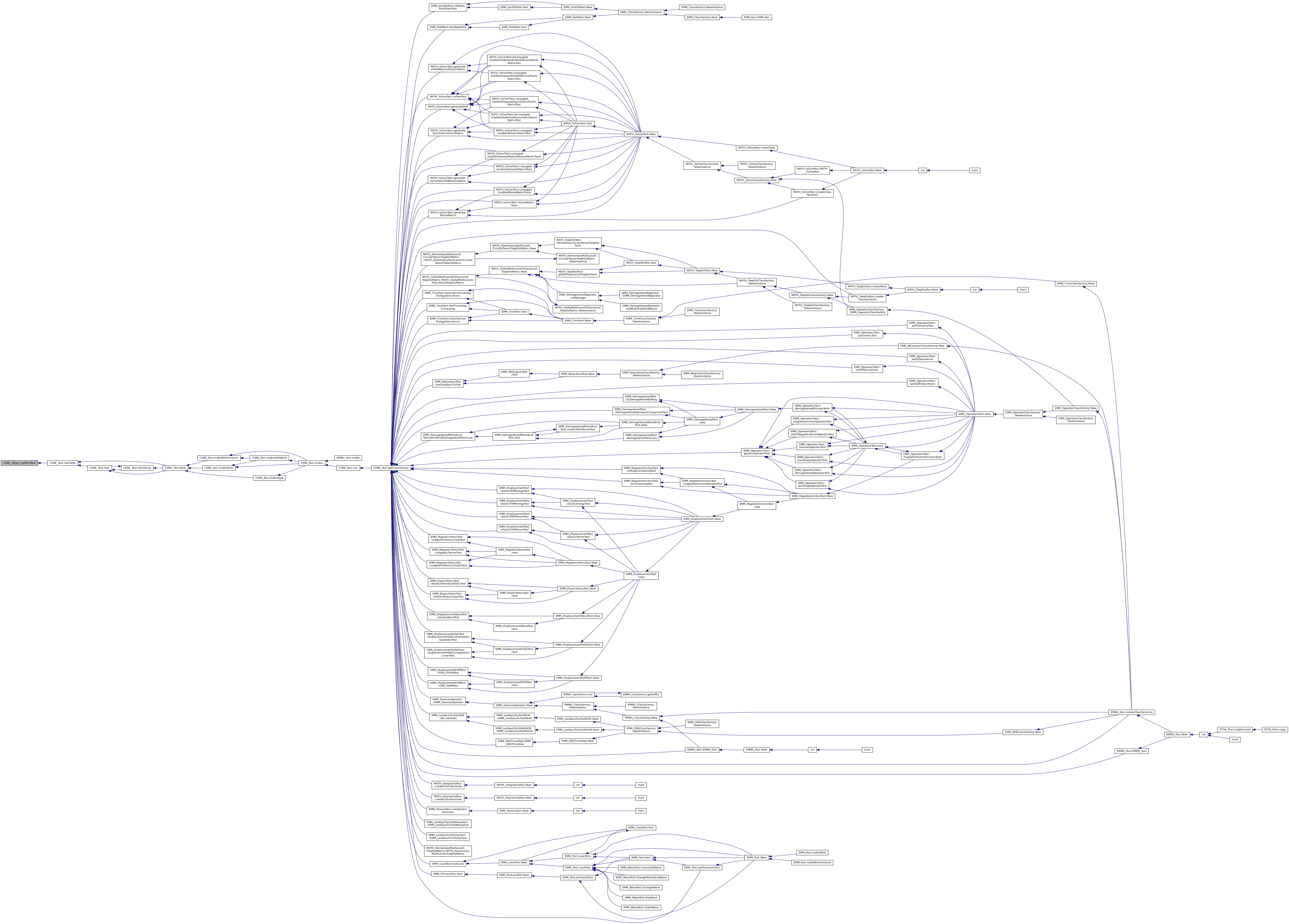
◆ getMinSInt()
|
inlinestaticinherited |
get the min value for tSInt type
- Returns
- the min value for tSInt type
Referenced by CORE_Test::testType().
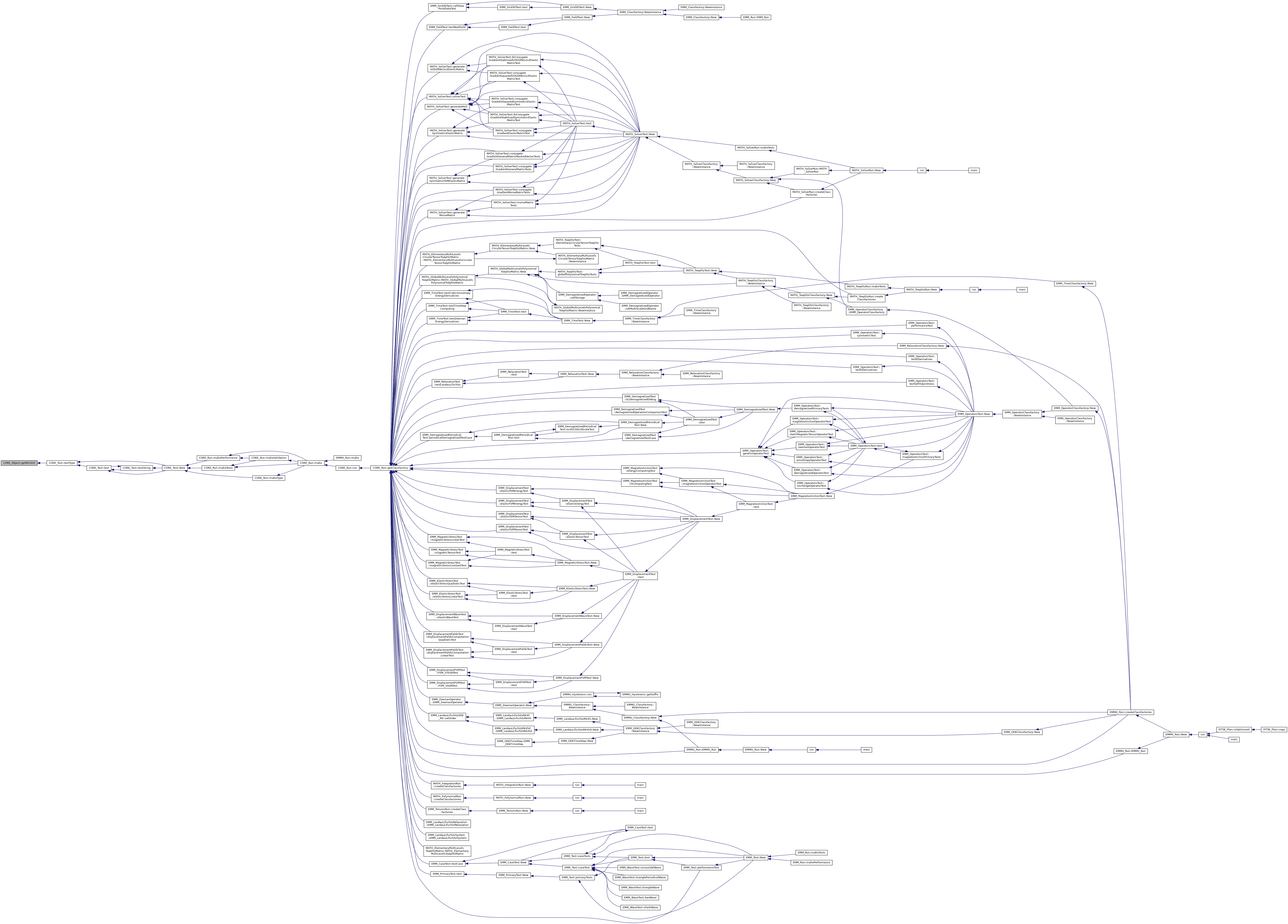
◆ getMinUChar()
|
inlinestaticinherited |
get the min value for tUChar type
- Returns
- the min value for tUChar type
Referenced by CORE_Test::testType().
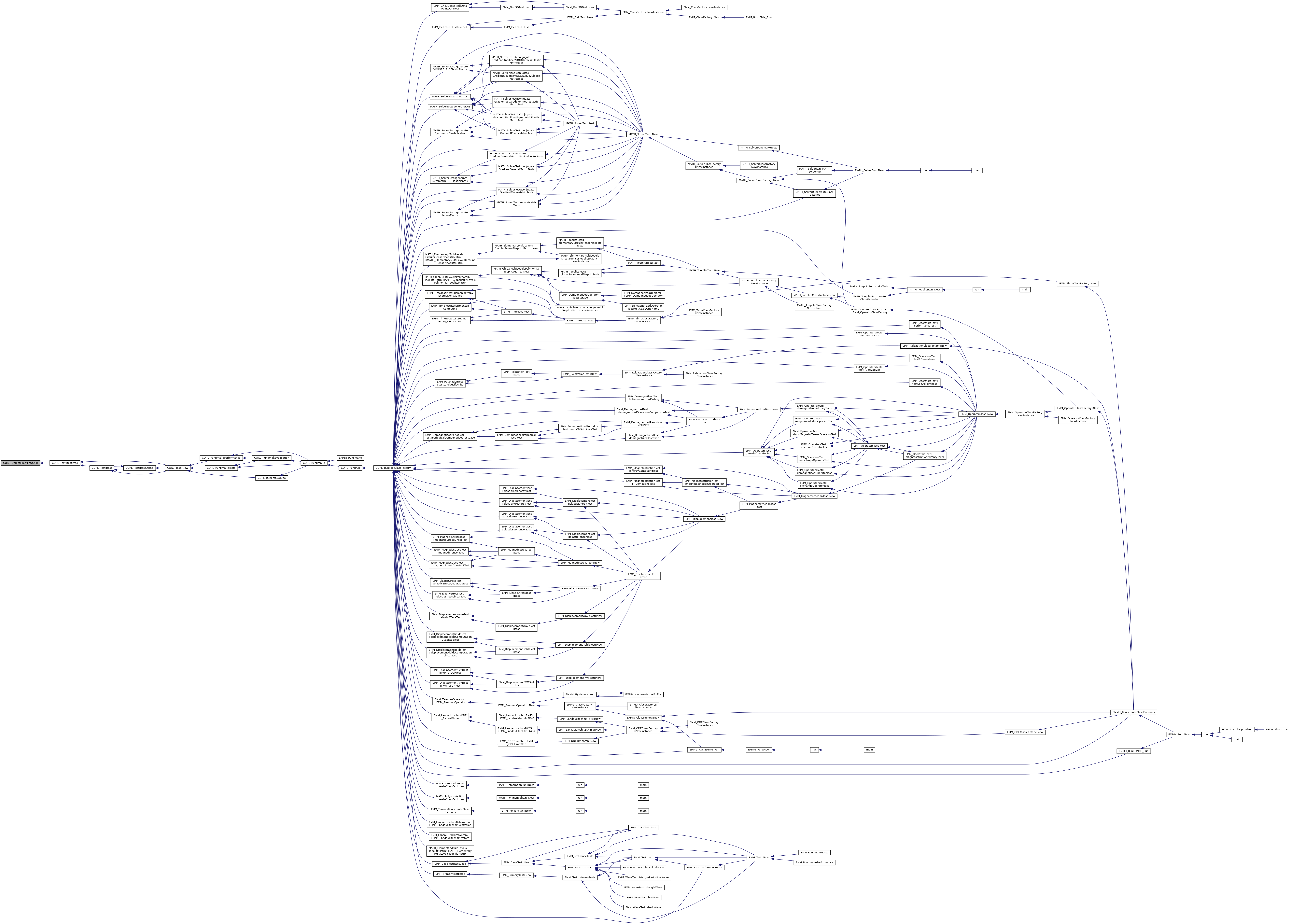
◆ getMinUIndex()
|
inlinestaticinherited |
get the min value for difference the array/vector indexing type
- Returns
- the min value for difference the array/vector indexing type
Referenced by CORE_Test::testType().
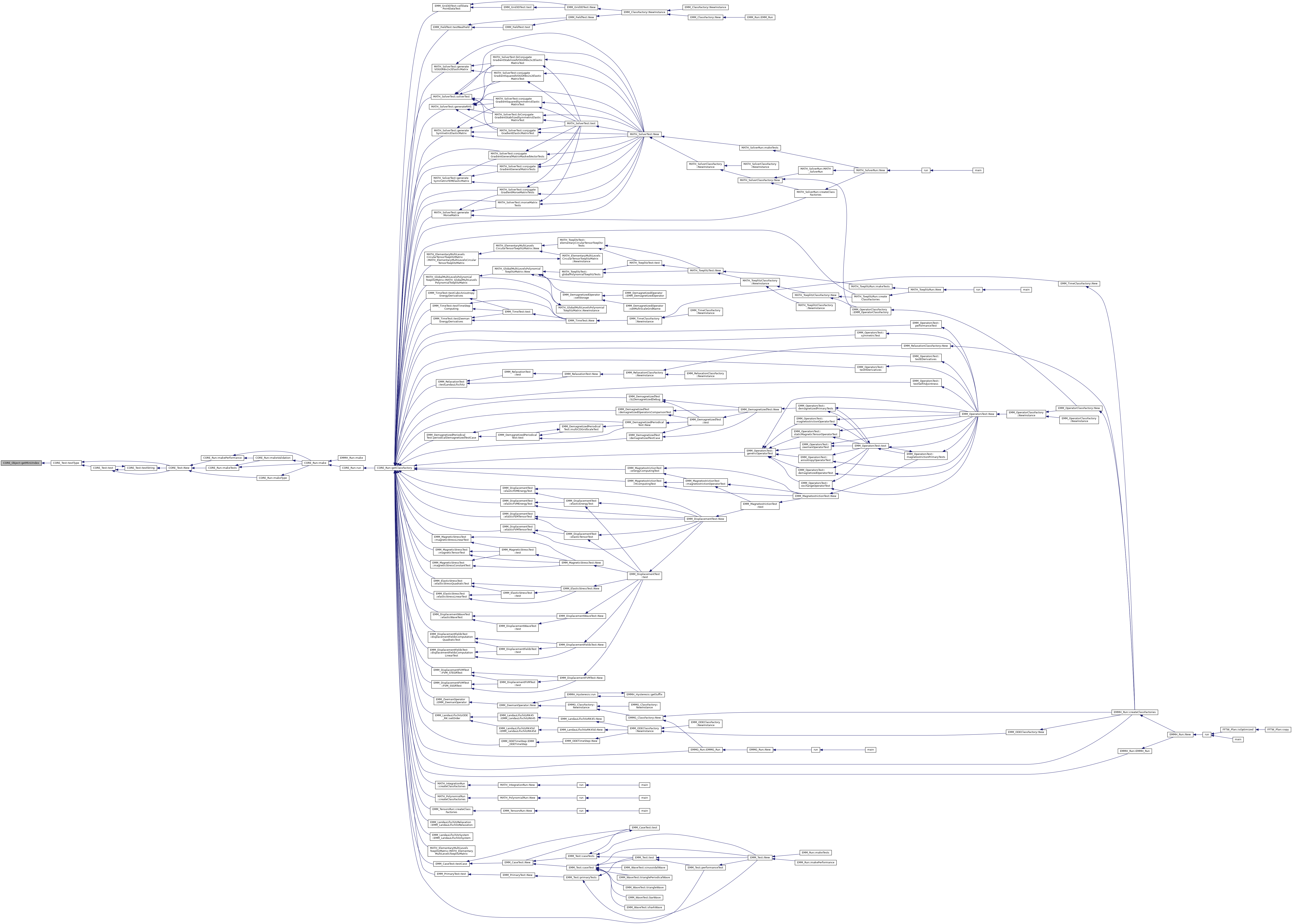
◆ getMinUInt()
|
inlinestaticinherited |
get the min value for tUInt type
- Returns
- the min value for tUInt type
Referenced by CORE_Test::testType().
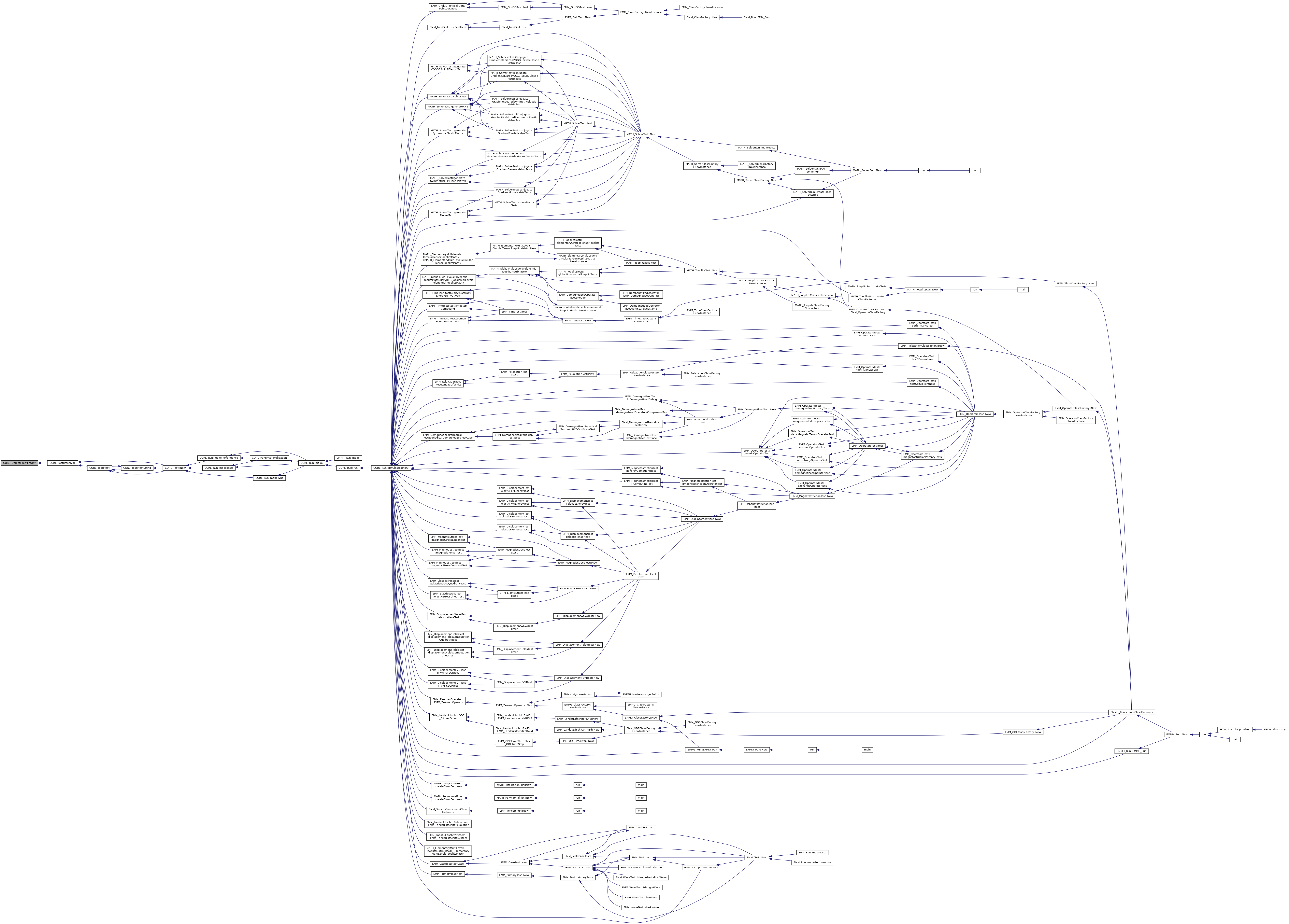
◆ getMinUInteger()
|
inlinestaticinherited |
get the min value for the unsigned integer type
- Returns
- the min value for the unsigned integer type
Referenced by CORE_Test::testType().

◆ getMinULInt()
|
inlinestaticinherited |
get the min value for tULInt type
- Returns
- the min value for tULInt type
Referenced by CORE_Test::testType().

◆ getMinULLInt()
|
inlinestaticinherited |
get the min value for tULLInt type
- Returns
- the min value for tULLInt type
Referenced by CORE_Test::testType().
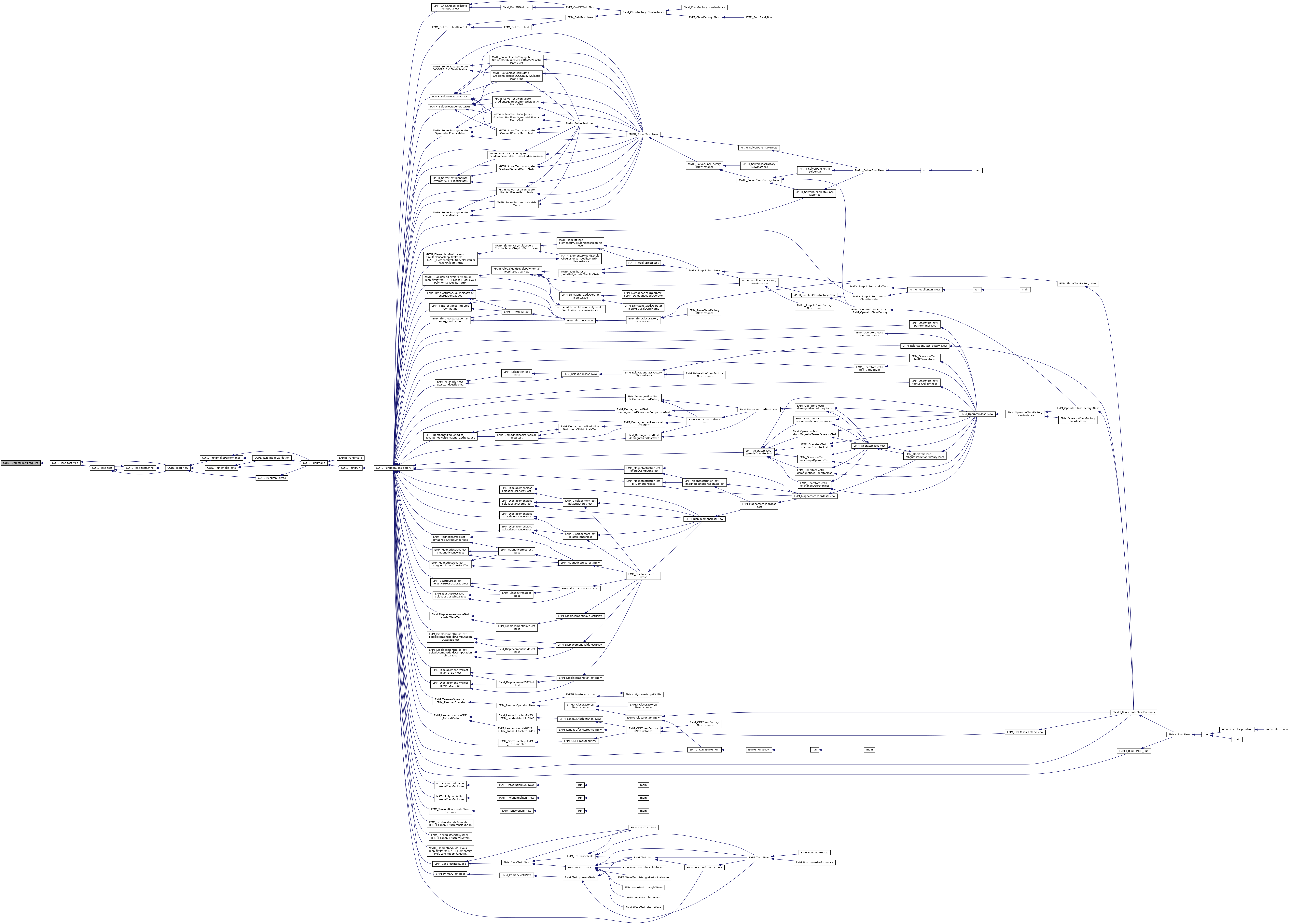
◆ getMinUSInt()
|
inlinestaticinherited |
get the min value for tUSInt type
- Returns
- the min value for tUSInt type
Referenced by CORE_Test::testType().
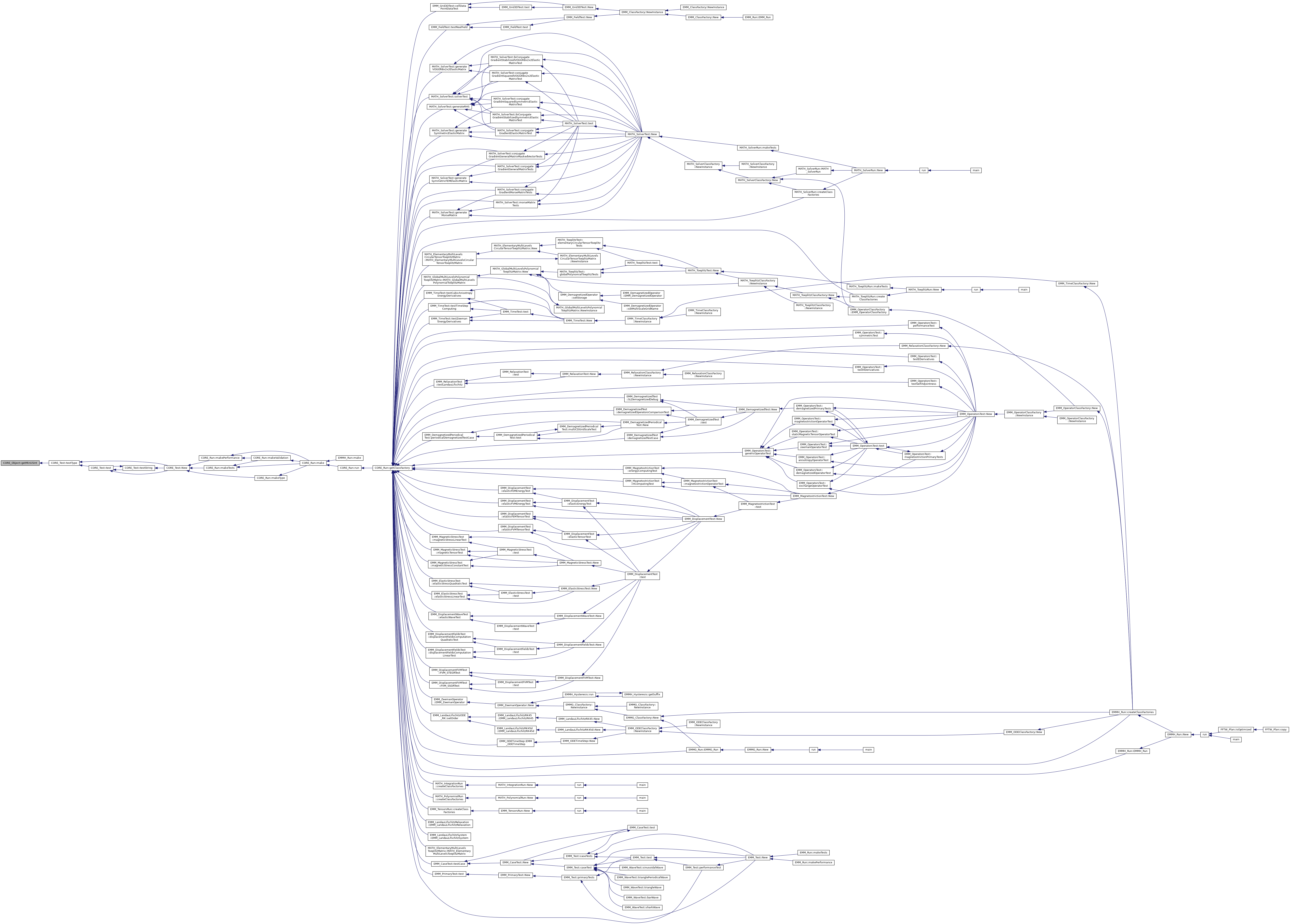
◆ getOperator() [1/2]
|
inlineinherited |
get the operator at index for reading
- Parameters
-
index index of the operator in [0,getOperatorsNumber()[
- Returns
- the operator
References null, and CORE_Integer::toString().

◆ getOperator() [2/2]
|
inlineinherited |
get the operator at index for writing
- Parameters
-
index index of the operator in [0,getOperatorsNumber()[
- Returns
- the operator
References EMM_LandauLifschitzSystem::computeOperatorsFieldsAtTime(), EMM_LandauLifschitzSystem::initializeOperators(), EMM_LandauLifschitzSystem::isAffine(), null, EMM_LandauLifschitzSystem::resetOperatorsToInitialState(), EMM_LandauLifschitzSystem::resetToInitialState(), tBoolean, tFlag, CORE_Integer::toString(), tReal, and EMM_LandauLifschitzSystem::updateOperatorsAtNextTimeStep().

◆ getOperators() [1/2]
|
inlineinherited |
return the operators vector
- Returns
- the operators
References EMM_LandauLifschitzSystem::mOperators.
Referenced by EMM_LandauLifschitzRelaxation::computeEnergyAtTime(), EMM_LandauLifschitzRelaxation::computeEnergyTimeDerivativeAtTime(), EMM_GradGaussLegendreRelaxation::computeEnergyTimeDerivativesAtTime(), EMM_GradGaussLegendreRelaxation::computeMagneticExcitationFieldGradient(), EMM_Input::restoreBackup(), EMMH_Hysteresis::run(), EMM_Output::save(), and EMM_Output::saveVTI().

◆ getOperators() [2/2]
|
inlineinherited |
◆ getOperatorsNumber()
|
inlineinherited |
return the number of operators
- Returns
- the operators number
◆ getOut()
|
inlinestaticinherited |
◆ getOutputPath()
|
inlineinherited |
get the output path in which the files are generated
- Returns
- the output path
References EMM_LandauLifschitzSystem::adimensionize(), EMM_LandauLifschitzSystem::discretize(), EMM_LandauLifschitzSystem::mOutputPath, and tBoolean.

◆ getPointerAddress()
|
inlineinherited |
return the identity string of the object
- Returns
- the identity string of the object
References CORE_Object::pointer2String().

◆ getPrefix()
|
inlineinherited |
get the prefix of the generating files
- Returns
- the prefix of the files
References EMM_LandauLifschitzSystem::mPrefix.
◆ getRealEpsilon()
|
inlinestaticinherited |
get the eps which is the difference between 1 and the least value greater than 1 that is representable.
- Returns
- the eps which is the difference between 1 and the least value greater than 1 that is representable.
Referenced by MATH_P4::solveP4De(), and CORE_Test::testType().
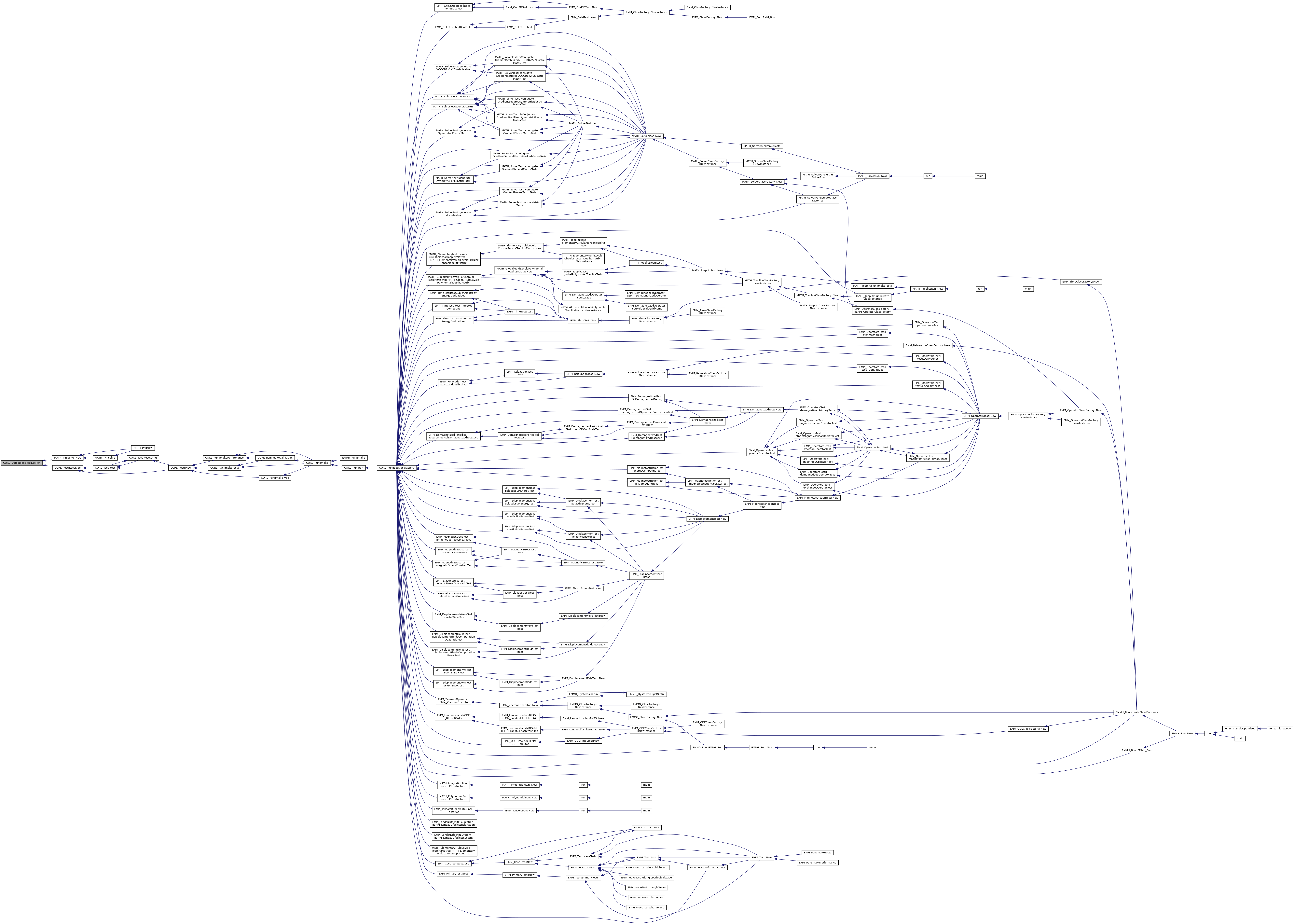
◆ getRealInfinity()
|
inlinestaticinherited |
get the infinity value
- Returns
- the inifinity value for the real type
Referenced by BrentFunction::BrentFunction(), EMM_OperatorsTest::compareDiscretizedData(), EMM_IterativeTimeStep::EMM_IterativeTimeStep(), EMM_SLElementaryDemagnetizedMatrix::Kxy(), NRFunction::NRFunction(), EMM_PolynomialInterpolationTimeStep::optimizeTimeFunction(), and CORE_Test::testType().
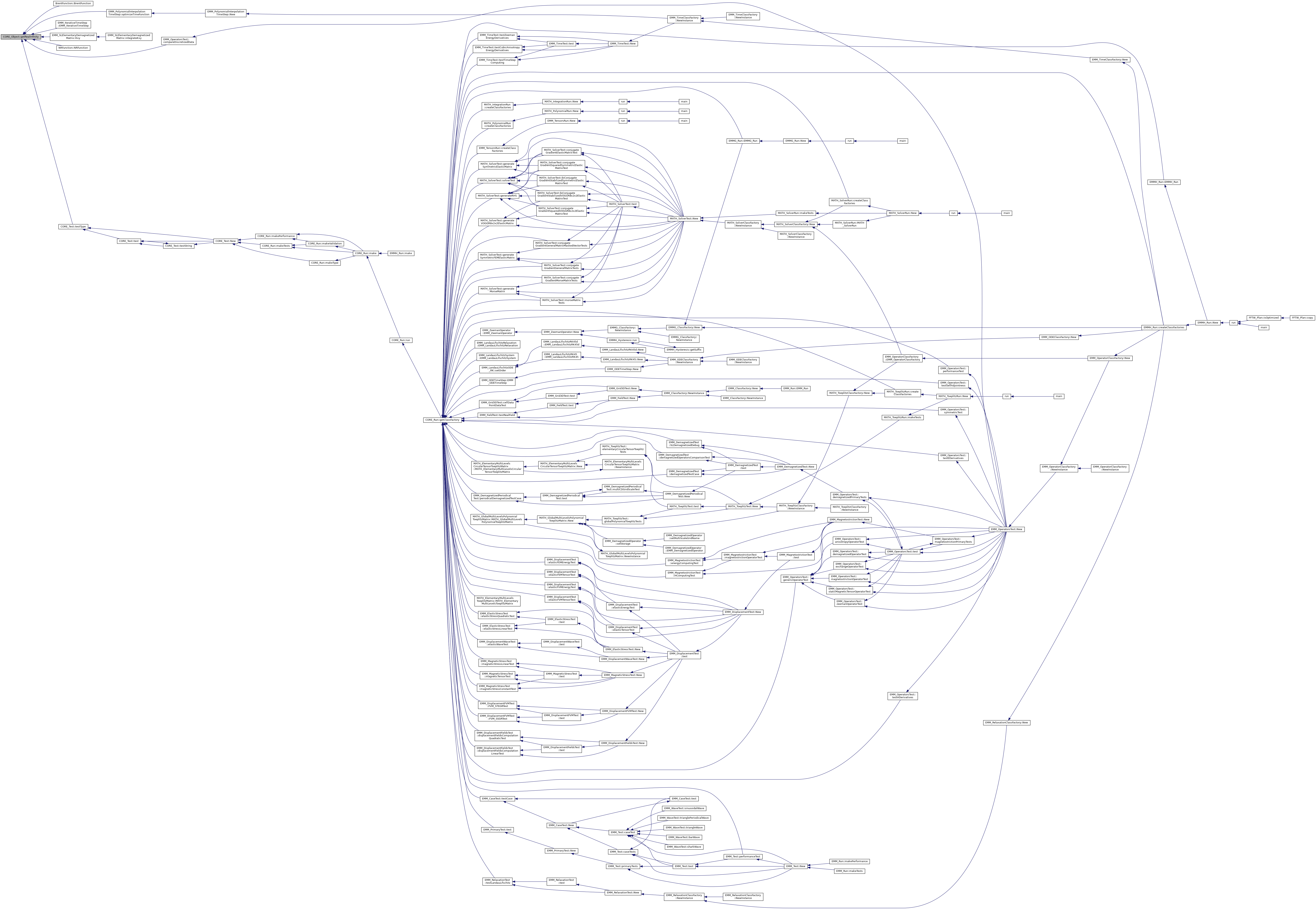
◆ getSharedPointer() [1/2]
|
inlineinherited |
get the shared pointer of this class into p
- Parameters
-
p : shared pointer of the class This
Referenced by CORE_Map< Key, Value >::getSharedPointer(), CORE_ArrayList< tString >::getSharedPointer(), EMM_Array< tCellFlag >::getSharedPointer(), CORE_Array< tCellFlag >::getSharedPointer(), CORE_MorseArray< tUChar >::getSharedPointer(), CORE_Vector< T >::getSharedPointer(), and CORE_Object::printObjectsInMemory().
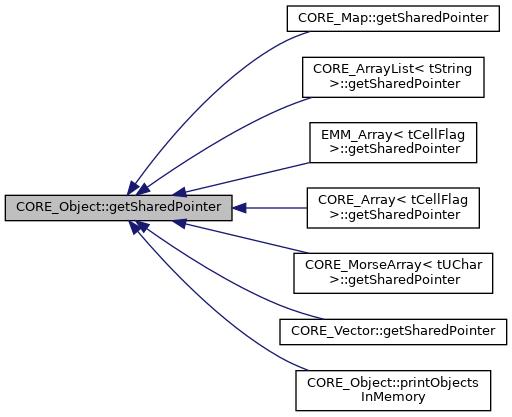
◆ getSharedPointer() [2/2]
|
inlineinherited |
get the shared pointer of this class into p
- Parameters
-
p : shared pointer of the class This
◆ getSigma()
|
inlineinherited |
get the sigma parameters
- Returns
- the sigma parameter
 for all cell i.
for all cell i.
References CORE_Array< T >::get().
Referenced by EMM_LandauLifschitzSystem::computeEnergy(), EMM_LandauLifschitzRelaxation::computeEnergyAtTime(), EMM_LandauLifschitzSystem::computeEnergyTimeDerivative(), EMM_LandauLifschitzRelaxation::computeEnergyTimeDerivativeAtTime(), EMM_GradGaussLegendreRelaxation::computeEnergyTimeDerivatives(), EMM_GradGaussLegendreRelaxation::computeEnergyTimeDerivativesAtTime(), EMM_LandauLifschitzSystem::computeFunction(), EMM_LandauLifschitzSystem::computeGradFunction(), EMM_LandauLifschitzSystem::computeMagneticExcitationField(), EMM_LandauLifschitzSystem::computeMagneticExcitationFieldAndEnergies(), EMM_GradGaussLegendreRelaxation::computeMagneticExcitationFieldGradient(), EMM_LandauLifschitzSystem::computeMagnetizationExcitationField(), EMM_LandauLifschitzRelaxation::computeMagnetizationFieldAtTime(), EMM_LandauLifschitzSystem::computeMeanMagnetizationField(), EMM_OptimalTimeStep::computeOptimalTimeStep(), EMM_LandauLifschitzSystem::computePartialGradMFunction(), EMM_FullExchangeOperator::discretize(), EMM_DisplacementFVMOperator::discretize(), EMM_DisplacementFEMOperator::discretize(), EMM_LandauLifschitzRelaxation::integrateMagnetizationFieldAtTime(), EMM_DisplacementFVMOperator::resetToInitialState(), EMM_DisplacementFEMOperator::resetToInitialState(), EMM_DisplacementOperator::resetToInitialState(), EMM_DisplacementOperator::restore(), and EMM_Output::saveVTI().

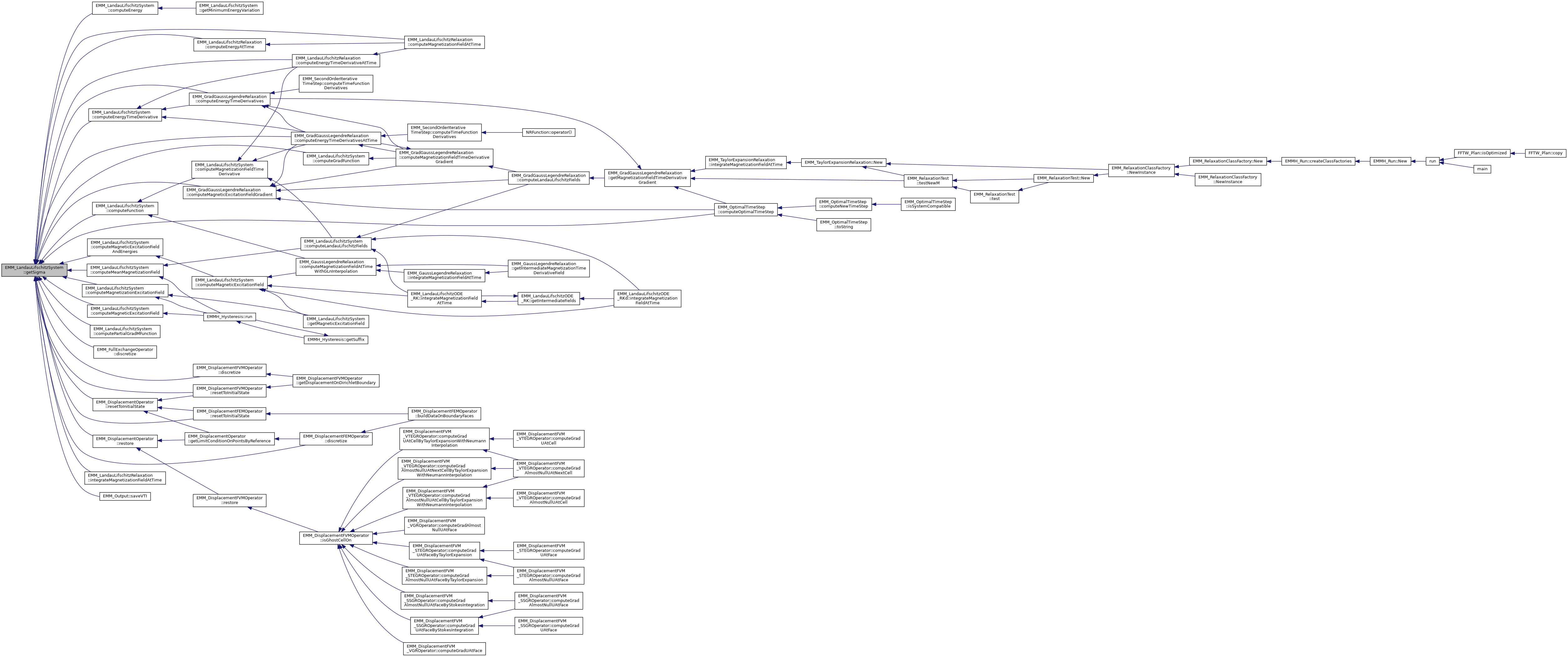
◆ getStepper() [1/2]
|
inlineinherited |
get the time descriptor for reading
- Returns
- the time descriptor class
Referenced by EMM_LandauLifschitzSystem::adimensionize(), and EMMH_Hysteresis::run().

◆ getStepper() [2/2]
|
inlineinherited |
get the time descriptor for writing
- Returns
- the time descriptor class
References EMM_LandauLifschitzSystem::integrate(), tBoolean, and tSInt.

◆ getThread()
|
inlinestaticinherited |
get the profilier
- Returns
- the profiler
Referenced by MATH_MaskVector::add(), MATH_Vector::add(), EMM_DisplacementFEMOperator::addBoundaryElasticStress(), EMM_DisplacementFEMOperator::buildDataOnNeumannBoundaryFaces(), EMM_DisplacementFVMOperator::computeCineticEnergy(), EMM_DisplacementFVMOperator::computeElasticStress(), EMM_DisplacementFEMOperator::computeElasticStress(), EMM_DisplacementFVMOperator::computeElasticTensor(), EMM_DisplacementFEMOperator::computeElasticTensor(), EMM_StaticMagneticTensorOperator::computeEnergy(), EMM_CubicAnisotropyOperator::computeEnergy(), EMM_MagnetostrictionOperator::computeEnergy(), EMM_DisplacementOperator::computeEnergy(), EMM_AnisotropyOperator::computeEnergyWithMagneticExcitation(), EMM_DisplacementFVMOperator::computeEquilibriumMatrixDiagonalConditioner(), EMM_DisplacementFEMOperator::computeEquilibriumMatrixDiagonalConditioner(), EMM_FullExchangeOperator::computeMagneticExcitationField(), EMM_StaticMagnetostrictionOperator::computeMagneticExcitationField(), EMM_LinearAnisotropyOperator::computeMagneticExcitationField(), EMM_StaticMagneticTensorOperator::computeMagneticExcitationField(), EMM_CubicAnisotropyOperator::computeMagneticExcitationField(), EMM_MinimalExchangeOperator::computeMagneticExcitationField(), EMM_AnisotropyOperator::computeMagneticExcitationField(), EMM_MagnetostrictionOperator::computeMagneticExcitationField(), EMM_CubicAnisotropyOperator::computeMagneticExcitationFieldGradient(), EMM_AnisotropyOperator::computeMagneticExcitationFieldGradient(), EMM_DisplacementFVMOperator::computeMagneticStress(), EMM_DisplacementFEMOperator::computeMagneticStress(), EMM_OptimalTimeStep::computeOptimalTimeStep(), EMM_DisplacementFEMOperator::computeStressConstraintEnergy(), EMM_FullExchangeOperator::discretize(), EMM_MinimalExchangeOperator::discretize(), EMM_CondensedMassMatrix::discretize(), EMM_LinearAnisotropyOperator::discretize(), EMM_AnisotropyOperator::discretize(), EMM_DemagnetizedOperator::discretize(), EMMG_SLDemagnetizedOperator::discretize(), EMM_LandauLifschitzSystem::discretize(), MATH_Vector::divide(), MATH_MaskVector::dot(), MATH_Vector::dot(), EMM_4SymmetricTensors::doubleDot(), EMM_4Tensors::doubleDotCrossDoubleDotScalar(), EMM_4Tensors::doubleDotCrossProduct(), EMM_4Tensors::doubleDotCrossSquaredScalar(), EMM_4Tensors::doubleDotProduct(), MATH_Vector::init(), MATH_MaskVector::init(), EMM_LandauLifschitzODE_RK::integrateMagnetizationFieldAtTime(), EMM_DisplacementFVM_Interpolator::interpolateUAtVertices(), EMMG_SLDemagnetizedOperator::localAssembly(), EMM_DisplacementOperator::nullProjectionOnDirichletBoundary(), EMM_DisplacementOperator::periodicProjection(), EMM_2PackedSymmetricTensors::product(), EMM_CanonicalMassMatrix::product(), MATH_FullMatrix::product(), EMM_CondensedMassMatrix::product(), EMM_BlockMassMatrix::product(), MATH_MorseMatrix::product(), EMMG_SLDemagnetizedOperator::product(), EMM_DisplacementOperator::projectionOnDirichletBoundary(), EMM_LandauLifschitzSystem::resetOperatorsToInitialState(), EMM_DisplacementFVMOperator::setBoundaryFaceTypes(), FFTW_MultiDFTs::setFFT(), FFTW_MultiLevelsDFT::setFFT(), FFTW_MultiLevelsDFT::setLevels(), FFTW_MultiDFTs::setPlan(), FFTW_MultiLevelsDFT::setPlan(), EMM_CondensedMassMatrix::solve(), solveODE(), EMM_4SymmetricTensors::squaredDoubleDot(), EMM_4Tensors::squaredDoubleDotCrossScalar(), EMM_4Tensors::squaredDoubleDotScalar(), EMM_CanonicalMassMatrix::symmetricDot(), EMM_CondensedMassMatrix::symmetricDot(), EMM_BlockMassMatrix::symmetricDot(), FFTW_Test::test(), MATH_SolverTest::test(), EMM_ODETest::testODE(), and EMM_Grid3D::updateLimitConditionOnPoints().

◆ getTime()
|
inlinevirtual |
return the current time
- Returns
- the current time of the relaxation
Implements EMM_LandauLifschitzSystem.
References mT.
◆ getTimeIntegrationOrder()
|
inline |
get the time integration order
- Returns
- time integration order in {1,2}
References mTimeIntegrationOrder.
◆ getTimeStep()
|
inlinevirtual |
return the current time step
- Returns
- the current time step of the relaxation
Implements EMM_LandauLifschitzSystem.
References computeFieldsAtTime(), integrateMagnetizationFieldAtTime(), mDt, tBoolean, tFlag, tReal, and tUSInt.
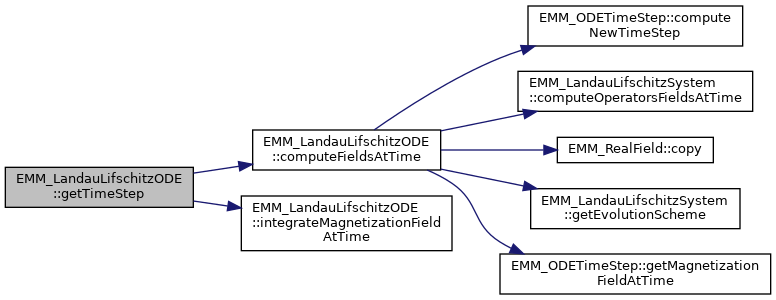
◆ getTimeStepsNumber()
|
inlinevirtual |
return the computed time steps
- Returns
- the number time steps of the relaxation
Implements EMM_LandauLifschitzSystem.
References mTimeStep.
◆ getTypeName()
|
inlinestaticinherited |
◆ getWorkingMagneticExcitationField()
|
inlineinherited |
get mutable adimensionized magnetic excitation working field
- Returns
- H
Referenced by EMM_LandauLifschitzRelaxation::computeEnergyAtTime(), EMM_LandauLifschitzRelaxation::computeEnergyTimeDerivativeAtTime(), EMM_GradGaussLegendreRelaxation::computeEnergyTimeDerivativesAtTime(), and EMM_GradGaussLegendreRelaxation::computeMagneticExcitationFieldGradient().

◆ initializeOperators()
|
protectedinherited |
initialize the data of operator field at t=0 from M
- Parameters
-
sigma weigh of each cell M magnetization at t=0
Referenced by EMM_LandauLifschitzSystem::getOperator().

◆ integrate()
|
inlinevirtual |
solve the system
- Parameters
-
isRestoring if true, compute the relaxation from the last backup retCode the return code of the method - If negative value it failed
- If positive value , it succeeds
Implements EMM_LandauLifschitzSystem.
References solveODE(), tBoolean, and tSInt.

◆ integrateMagnetizationFieldAtTime()
|
pure virtual |
integrate the magnetization field at time t from time and derivative field at time 0
- Parameters
-
dt the time step to compute errorNorm norm used for computing the error epsilon : parameter to bound error nEvaluations number of Laudau Lifschitz function calls dM_dt0 magnetization field derivative at time 0 M0 magnetization field at time 0 Mt the magnetization field at time dt
- Returns
- the estimated error
- compute M(dt)
- compute the error on M(dt)
- compute new time step in dt
- Returns
- the error done on Mt
Implemented in EMM_LandauLifschitzODE_RK, and EMM_LandauLifschitzODE_RKd.
Referenced by getTimeStep().

◆ is32Architecture()
|
inlinestaticinherited |
return true if the machine is a 32 bits machine
- Returns
- true is the computing is done in a 32 bits machine
References CORE_Object::pointer2String(), CORE_Object::printObjectsInMemory(), and tString.
Referenced by CORE_Test::testType().


◆ is64Architecture()
|
inlinestaticinherited |
return true if the machine is a 64 bits machine
- Returns
- true is the computing is done in a 64 bits machine
Referenced by EMM_VTK::getVTKType(), and CORE_Test::testType().
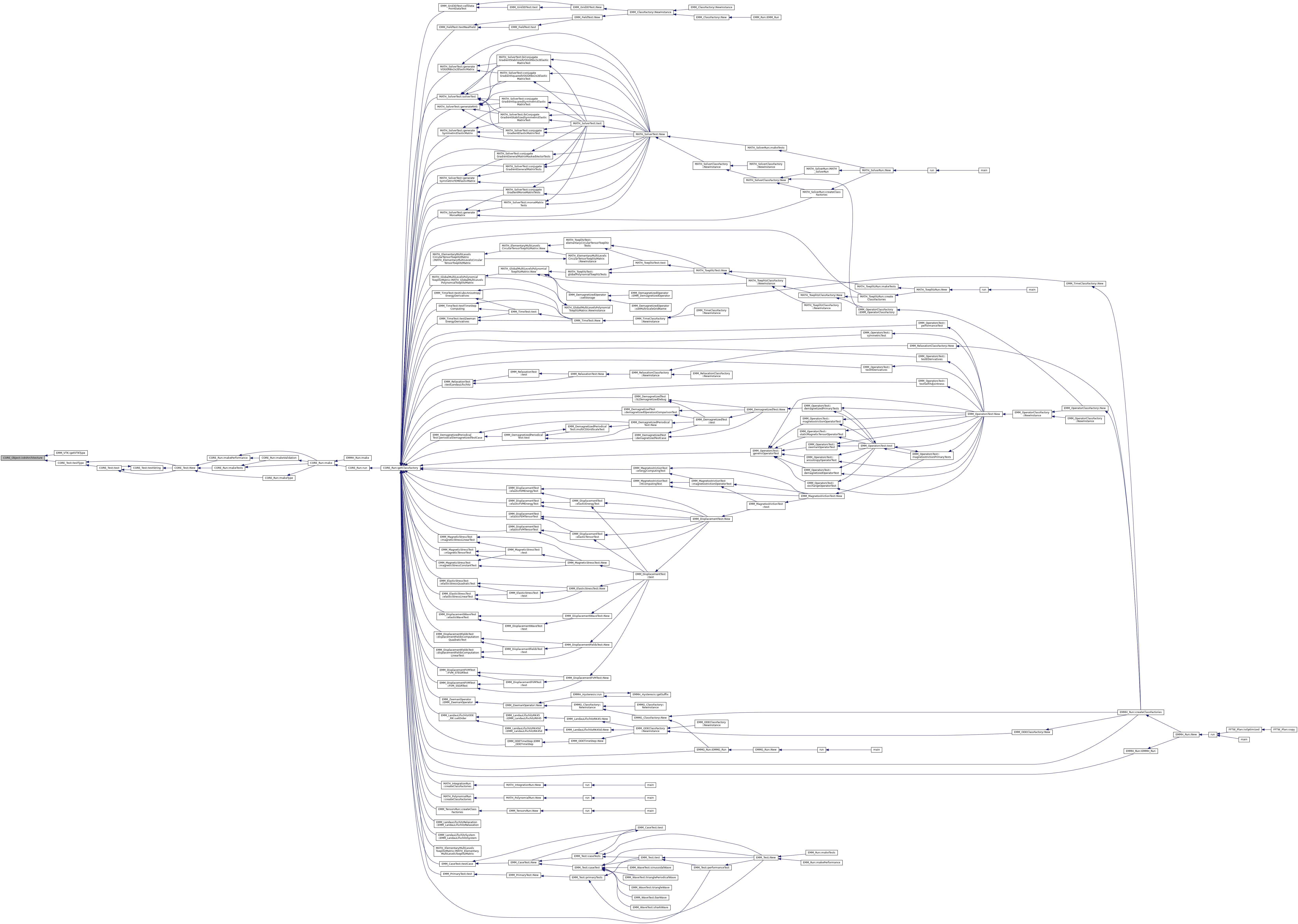
◆ isAffine()
|
inherited |
return true if the system has only affine operators
- Returns
- true if the system has only affine operators see EMM_Operator::isAffine()
References EMM_LandauLifschitzSystem::mOperators.
Referenced by EMM_LandauLifschitzSystem::getOperator().

◆ isBackupEnabled()
|
inlineinherited |
get if the backup is enabled
- Returns
- true if the backup is enabled
References EMM_LandauLifschitzSystem::mIsBackupEnabled.
◆ isInstanceOf() [1/2]
|
inlineinherited |
test if the clas T is an instance of this class
- Returns
- true if the object is an instance of T
References null.
Referenced by MATH_ToeplitzTest::toeplitzTest().

◆ isInstanceOf() [2/2]
test if the object is an instance of className
- Parameters
-
name name of the class
- Returns
- true if the object is an instance of class Name
References CORE_Object::getIdentityString().

◆ isLogPrinted()
|
inlineinherited |
get if the log is printed in log file
- Returns
- true if the log printing is enabled
References EMM_LandauLifschitzSystem::mIsLogPrinted, EMM_LandauLifschitzSystem::printLog(), tReal, tUIndex, and tUInteger.

◆ isMagnetizationStatic()
|
inlineinherited |
return true if M is permanent
◆ isMemoryChecked()
|
inlinestaticinherited |
get if the memory checking is used
- Returns
- true: if the memory checking is used.
References CORE_Object::getClassName(), CORE_Object::mIsMemoryTesting, and tString.
Referenced by main().


◆ out()
|
inlinestaticinherited |
get the output
- Returns
- the output stream
Referenced by EMM_Matter::adimensionize(), EMM_DisplacementFVMOperator::backup(), EMM_DisplacementOperator::backup(), MATH_ElementaryMultiLevelsToeplitzMatrix::buildSpectralVectorProjector(), EMM_Test::caseTest(), EMM_Test::caseTests(), EMM_MatterField::computeAnisotropyDirectionsField(), EMM_OptimalTimeStep::computeOptimalTimeStep(), MATH_MultiLevelsToeplitzMatrix::copy(), CORE_Exception::CORE_Exception(), EMM_MatterField::createAnisotropyOperator(), CORE_Run::createIO(), EMM_ElementaryTest::defaultBackupTest(), EMM_ElementaryTest::defaultTest(), MATH_MultiLevelsFFTToeplitzMatrix::diagonalize(), EMM_DisplacementFVMOperator::discretize(), EMM_MagnetostrictionOperator::discretize(), EMM_DisplacementFEMOperator::discretize(), EMM_4SymmetricTensors::doubleDot(), EMM_4Tensors::doubleDotCrossDoubleDotScalar(), EMM_TensorsTest::doubleDotCrossDoubleDotScalarTests(), EMM_4Tensors::doubleDotCrossProduct(), EMM_TensorsTest::doubleDotCrossProductTests(), EMM_4Tensors::doubleDotCrossSquaredScalar(), EMM_TensorsTest::doubleDotCrossSquaredScalarTests(), EMM_4Tensors::doubleDotProduct(), EMM_TensorsTest::doubleDotProductTests(), EMM_DisplacementWaveTest::elasticWaveTest(), EMM_Test::elementaryTests(), FFTW_Test::fftwTutorial(), MATH_IntegrationTest::gaussLegendreTest(), EMM_MagnetostrictionTest::HComputingTest(), EMM_DemagnetizedPeriodicalTest::HTest(), EMMH_HysteresisTest::hysteresisDefaultCycleTest(), EMM_TensorsTest::initializationTests(), EMM_MultiScaleGrid::initialize(), EMM_MultiScaleSDGrid::initialize(), EMM_MatterField::loadFromANIFile(), EMM_AnisotropyDirectionsField::loadFromFile(), EMM_Matter::loadFromFile(), EMM_Grid3D::loadFromGEOFile(), EMM_MatterField::loadFromLOCFile(), EMM_Array< tCellFlag >::loadFromStream(), EMM_Matter::loadFromStream(), EMM_Matter::loadMattersFromFile(), EMM_Run::loadSystemFromOptions(), EMM_ElementaryTest::magnetostrictionBackupTest(), CORE_Run::make(), EMMH_Run::makeHysteresis(), EMM_Run::makeRun(), CORE_Run::makeType(), EMM_ElementaryTest::optionsTest(), MATH_PolynomialTest::P4Tests(), EMM_Test::primaryTests(), EMM_LandauLifschitzSystem::printLog(), CORE_Run::printOptions(), EMM_2PackedSymmetricTensors::product(), EMMG_SLDemagnetizedOperator::projectionOnSpectralSpace(), CORE_Run::readOptionsFromCommandLine(), CORE_Test::readVectorTest(), EMM_DemagnetizedPeriodicalTest::relaxationTest(), EMM_DisplacementFVMOperator::restore(), EMM_DisplacementOperator::restore(), EMM_Input::restoreBackup(), EMMH_Hysteresis::run(), EMM_Output::save(), EMM_AnisotropyDirectionsField::saveToFile(), EMM_MatterField::saveToFile(), EMM_Grid3D::saveToGEOFile(), CORE_IOTest::searchTest(), EMMH_Hysteresis::setInitialMagnetizationField(), MATH_MultiLevelsToeplitzMatrix::setLevels(), EMM_4SymmetricTensors::squaredDoubleDot(), EMM_4Tensors::squaredDoubleDotCrossScalar(), EMM_TensorsTest::squaredDoubleDotCrossScalarTests(), EMM_4Tensors::squaredDoubleDotScalar(), EMM_TensorsTest::squaredDoubleDotScalarTests(), EMM_TensorsTest::squaredDoubleDotTests(), EMM_MatterTest::testAdimensionize(), EMM_MatterTest::testANIFile(), CORE_Test::testComplex(), CORE_Test::testDateWeek(), FFTW_Test::testDFT(), EMM_MatterTest::testIO(), EMM_ODETest::testODE(), CORE_Test::testOut(), CORE_Test::testReal(), EMM_FieldTest::testRealArray(), EMM_Grid3DTest::testSegment(), EMM_Grid3DTest::testThinSheet(), CORE_Test::testTime(), CORE_Test::testType(), MATH_FullMatrix::toString(), EMM_DemagnetizedPeriodicalTest::xyPeriodicalCubeSDGTest(), and EMM_DemagnetizedPeriodicalTest::xyPeriodicalSheetSDGTest().

◆ pointer2String()
|
staticinherited |
return the string representation of a pointer
- Parameters
-
obj : oject to get the string pointer
- Returns
- the string pointer of the object
References tString.
Referenced by CORE_Object::CORE_Object(), CORE_Object::getIdentityString(), CORE_Object::getPointerAddress(), CORE_Object::is32Architecture(), and CORE_Object::~CORE_Object().

◆ printLog()
|
inherited |
print the log
- Parameters
-
timeStep the iterations number t the current time stepperData : data of the stepper nMagnetizedElements the number of magnetized elements Es energies : total energy at 0 + energy for operator at index i in [1,nOperators] dE_dt variation of energy with respect to time 
DeltaE_DeltaT : the effective variation of energy between 2 succesive iterations meanM the man of the magnetization field meanH the man of the magnetic excitation field
References EMM_LandauLifschitzSystem::mOperators, CORE_Object::out(), CORE_Out::print(), CORE_Out::println(), tFlag, CORE_Real::toString(), CORE_Integer::toString(), and tReal.
Referenced by EMM_LandauLifschitzSystem::isLogPrinted().


◆ printObjectsInMemory() [1/2]
|
staticinherited |
print object in memory
- Parameters
-
f : output to print the objects in memory
References CORE_Object::getIdentityString(), CORE_Object::getSharedPointer(), CORE_Object::mIsMemoryTesting, CORE_Object::mObjects, and tInteger.

◆ printObjectsInMemory() [2/2]
|
inlinestaticinherited |
print object in memory in the standart output
Referenced by CORE_Object::is32Architecture(), and main().
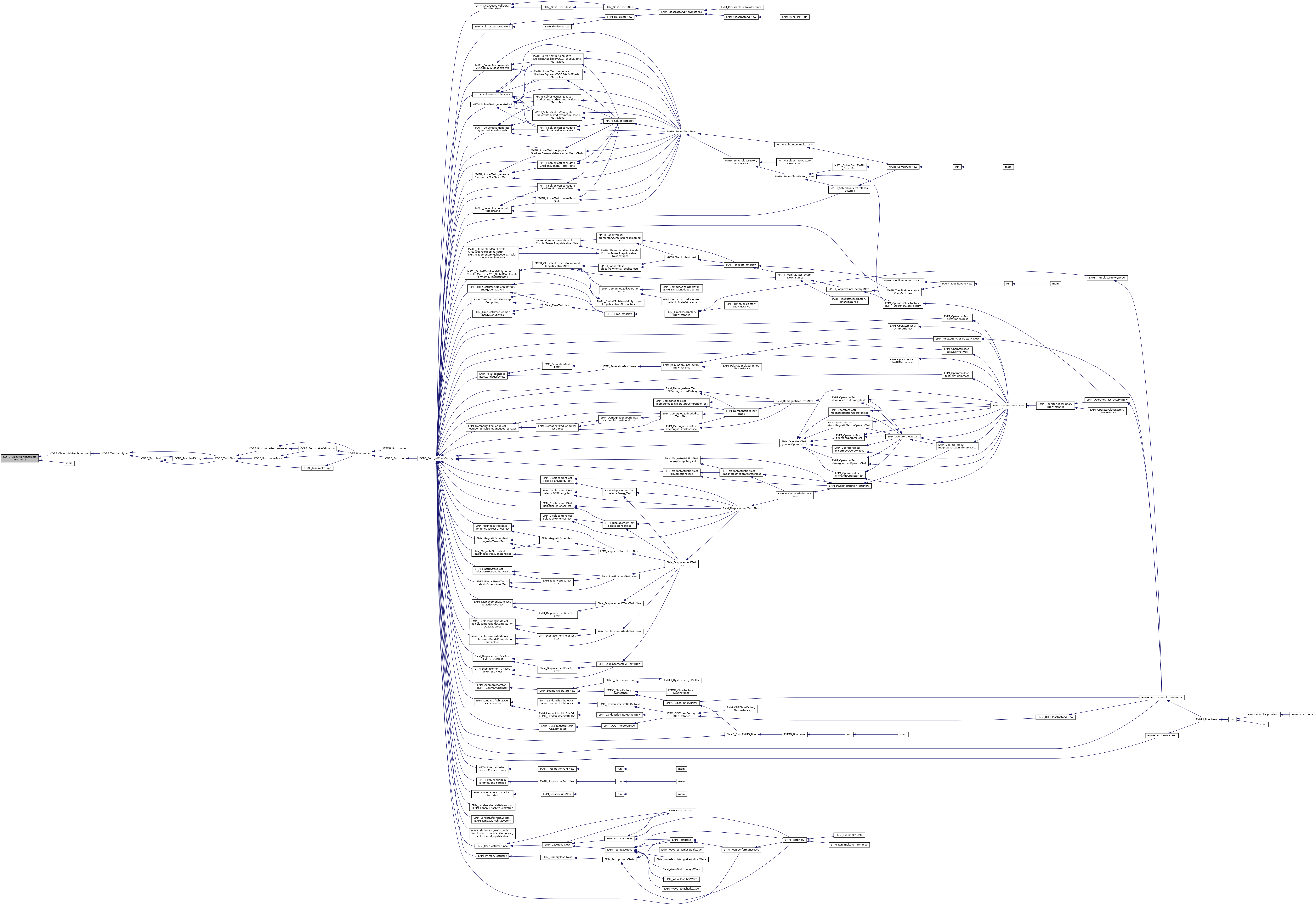
◆ resetOperatorsToInitialState()
|
virtualinherited |
initialize the problem
It resets to initial state all the operator data
References CORE_Object::getThread(), EMM_LandauLifschitzSystem::mOperators, CORE_Thread::startChrono(), CORE_Thread::stopChrono(), and tBoolean.
Referenced by EMM_LandauLifschitzSystem::getOperator(), EMM_LandauLifschitzSystem::resetToInitialState(), and EMMH_Hysteresis::run().


◆ resetOut()
|
inlinestaticinherited |
◆ resetStepper()
|
inlineinherited |
reset the reverse time relation
References EMM_LandauLifschitzSystem::mStepper, and null.
Referenced by EMM_LandauLifschitzSystem::setStepper().

◆ resetThread()
|
inlinestaticinherited |
◆ resetToInitialState()
|
inherited |
reset to initial state
It resets to initial state all the operator data & M
References EMM_RealField::copy(), EMM_Grid3D::getElementsNumber(), EMM_RealField::getSize(), EMM_RealField::initField(), EMM_Input::loadFieldFromFile(), EMM_LandauLifschitzSystem::M, EMM_LandauLifschitzSystem::mM, EMM_LandauLifschitzSystem::mMesh, EMM_LandauLifschitzSystem::mMInitialData, EMM_LandauLifschitzSystem::mMInitialDataFile, EMM_RealField::normalize(), EMM_LandauLifschitzSystem::resetOperatorsToInitialState(), tDimension, and EMM_RealField::unmagnetized().
Referenced by EMM_LandauLifschitzSystem::getOperator().
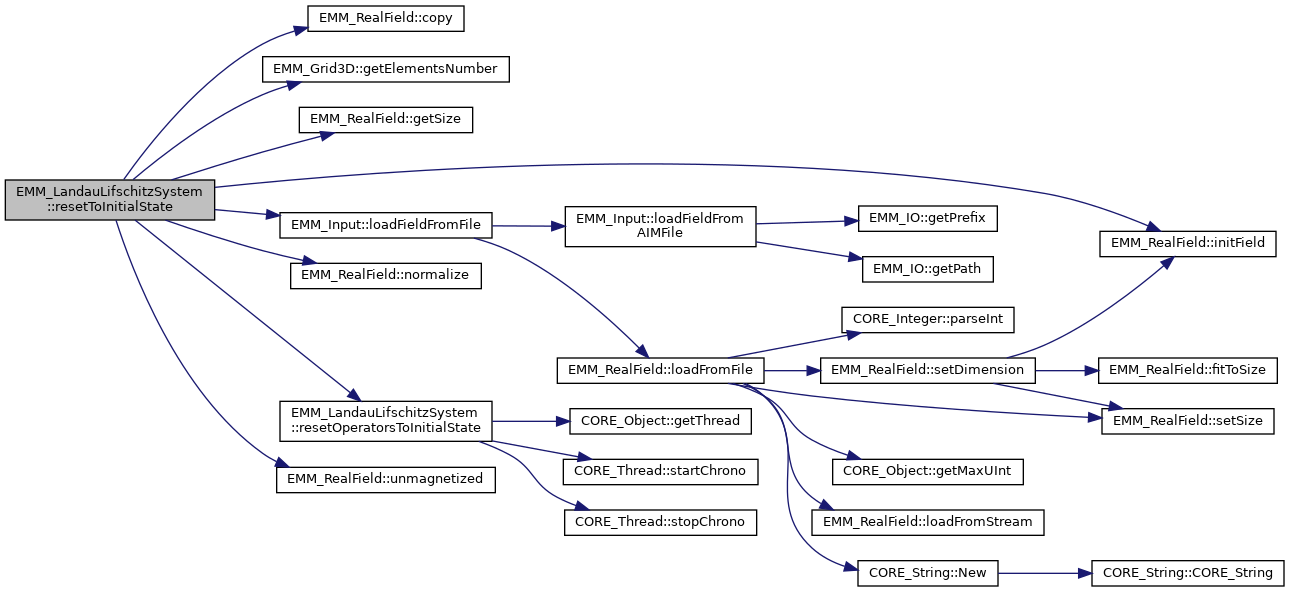

◆ setBackupsNumber()
|
inlineinherited |
set the backups number
- Parameters
-
n the number of backups >0
◆ setBackupStep()
|
inlineinherited |
set the backup steps to save relaxation
- Parameters
-
n the step for backup
◆ setEvolutionScheme()
|
inlineinherited |
set the evolution scheme
- Parameters
-
f : evolution flag in - MOs : M(t+dt) =F(M(t),Os(t)) and Os(t+dt)=U(M(t+dt),Os(t))
- OsM : Os(t+dt)=U(M(t),Os(t)) and Ms(t+dt)=F(M(t),Os(t+dt))
- M : M(t+dt) =F(M(t),Os(0))
- Os : Os(t+dt)=U(M(0),Os(t))
◆ setInitialMagnetization() [1/4]
|
inlineinherited |
set the initialization data for magnetization field
- Parameters
-
dataFile the file name of the description field file
Referenced by EMMH_Hysteresis::run(), and EMMH_Hysteresis::setInitialMagnetizationField().

◆ setInitialMagnetization() [2/4]
|
inlineinherited |
set the initialization data for magnetization field
- Parameters
-
data the uniform init magnetization
References EMM_RealField::setValue().

◆ setInitialMagnetization() [3/4]
|
inlineinherited |
set the initialization data for magnetization field
- Parameters
-
M0 : x-coordinate of initial magnetization M1 : y-coordinate of initial magnetization M2 : z-coordinate of initial magnetization
References EMM_RealField::setValue(), and tDimension.

◆ setInitialMagnetization() [4/4]
|
inlineinherited |
set the initialization data for magnetization field
- Parameters
-
data the uniform init magnetization
◆ setIsBackupEnabled()
|
inlineinherited |
set if the backup is enabled
- Parameters
-
v true to enable the backup process
Referenced by EMMH_Hysteresis::run().

◆ setIsLogPrinted()
|
inlineinherited |
set if the log is printed in log file
- Parameters
-
v true to enable the log printing
Referenced by EMMH_Hysteresis::run().

◆ setIsMemoryChecked()
|
inlinestaticinherited |
set if the memory checking is used
- Parameters
-
v : true to check memory
Referenced by main().

◆ setMesh()
|
inlineinherited |
set the mesh
- Parameters
-
mesh : the mesh to set
- Returns
- true if the mesh is compatible
References null.
◆ setMinimumEnergyVariation()
|
inlineinherited |
set minimum energy variation under which the relaxation is supposed to be reached
- Parameters
-
v the minimum energy variation
◆ setMinimumTimeStep()
|
inlineinherited |
set minimum time step under which the relaxation process is supposed to be reached
- Parameters
-
v min time step
◆ setOut()
|
inlinestaticinherited |
◆ setOutputPath()
|
inlineinherited |
set the output path
- Parameters
-
currentPath the curent path from whih the path is defined path the output path prefix the prefix of the file
References CORE_File::isAbsolutePath(), EMM_LandauLifschitzSystem::mOutputPath, and CORE_File::PATH_SEPARATOR.

◆ setStepper()
|
inlineinherited |
set the reverse time relation
- Parameters
-
time : the time to set
- Returns
- true if the time is compatible
References CORE_Object::getThis(), null, and EMM_LandauLifschitzSystem::resetStepper().

◆ setThis()
|
inlineprotectedinherited |
set this weak shared pointer called toDoAfterThis setting method
- Parameters
-
p : shared pointer of the class This
References CORE_Object::toDoAfterThisSetting().

◆ setThread()
|
inlinestaticinherited |
set the thread
- Parameters
-
thread the shared pointer to the thread
References null.
Referenced by EMM_Run::EMM_Run(), EMM_TensorsRun::EMM_TensorsRun(), and MATH_SolverRun::MATH_SolverRun().

◆ setTimeIntegrationOrder()
|
inline |
set the time integration order
- Parameters
-
order time integration order in {1,2}
◆ solveODE()
solve the ODE system
- Parameters
-
isRestoring if true, compute the relaxation from the last backup retCode the return code of the method - If negative value it failed
- If positive value , it succeeds
The integration algorithm is described as follow:
- M is the initial magnetization field
- E0: is the initial energy
- restore the integration process if isRestoring is true see EMM_Input::restoreBackup()
- while either the time step is less than the maximum tim steps number of the relaxation is not reached do :
- compute the total magnetic excitation H field EMM_LandauLifschitzSystem::computeMagneticExcitationFieldAndEnergy()
- compute the landau lifschitz function F et M
 EMM_LandauLifschitzSystem::computeLandauLifschitzFields()
EMM_LandauLifschitzSystem::computeLandauLifschitzFields() - compute the energy variation
 EMM_LandauLifschitzSystem::computeEnergyTimeDerivative()
EMM_LandauLifschitzSystem::computeEnergyTimeDerivative() - compute the discretized energy variation
 where n is the number of magnetized elements and verify it is decreasing
where n is the number of magnetized elements and verify it is decreasing - compute the mean of M over all the domain
- verify the relaxation process is reached
 set by EMM_LandauLifschitzSystem::setMinimumEnergyVariation()
set by EMM_LandauLifschitzSystem::setMinimumEnergyVariation() - compute the new time step see EMM_ODETimeStep:computeNewTimeStep()
- set the magnetization field at new time step for ODE integrator EMM_ODETimeStep::getMagnetizationFieldAtTimeStep()
- compute the fields for each operator at t+dt EMM_LandauLifshitzSystem::computeOperatorFieldsAtTime()
- verify the time step is not to small set by EMM_LandauLifschitzSystem::setMinimumTimeStep()
- save the relaxation step is necessary see EM_Output::saveBackup()
- save the end state of relaxation see EM_Output::saveBackup()
References CORE_Object::getThread(), and CORE_Thread::startChrono().
Referenced by integrate().


◆ SP_OBJECT()
|
private |
◆ toDoAfterThisSetting()
|
inlineprotectedvirtualinherited |
method called after the setting of the shared pointer this method can only be called once.
Reimplemented from CORE_Object.
Reimplemented in EMM_DisplacementOperator, EMM_DisplacementFVMOperator, EMM_GaussLegendreRelaxation, and EMM_GradGaussLegendreRelaxation.
Referenced by EMM_GaussLegendreRelaxation::toDoAfterThisSetting(), and EMM_DisplacementOperator::toDoAfterThisSetting().

◆ toString()
|
virtualinherited |
turn the class into a string
- Returns
- the string representation of the class
Reimplemented from CORE_Object.
References CORE_Object::getIdentityString(), EMM_LandauLifschitzSystem::mLLFunction, EMM_LandauLifschitzSystem::mM, EMM_LandauLifschitzSystem::mMatters, EMM_LandauLifschitzSystem::mMesh, EMM_LandauLifschitzSystem::mOperators, EMM_LandauLifschitzSystem::mStepper, tString, and tUIndex.
Referenced by EMM_LandauLifschitzSystem::getBackupStep(), and EMMH_Hysteresis::run().


◆ updateOperatorsAtNextTimeStep()
|
protectedinherited |
update the operator at next time time with respect of the value of the magnetization field at next time
- Parameters
-
dt the time step sigma the magnetized weight of each cell Mt the magnetization field at each point at next time step
call the method EMM_MagneticExcitationOperator::updateAtNextTimeStep() for each operator
References EMM_LandauLifschitzSystem::mOperators, and tBoolean.
Referenced by EMM_LandauLifschitzSystem::getOperator().

Member Data Documentation
◆ DE_DT_MIN_IS_REACHED
|
staticinherited |
◆ DT_MIN_IS_REACHED
|
staticinherited |
◆ E_INCREASING
|
staticinherited |
◆ E_IS_NAN
|
staticinherited |
◆ Gamma
|
staticinherited |
◆ M
|
staticinherited |
Referenced by EMM_LandauLifschitzSystem::computeEnergy(), computeFieldsAtTime(), EMM_LandauLifschitzRelaxation::computeFieldsAtTime(), EMM_LandauLifschitzSystem::computeMeanMagnetizationField(), EMM_LandauLifschitzSystem::discretize(), EMM_GaussLegendreRelaxation::getIntermediateMagnetizationTimeDerivativeField(), EMM_GradGaussLegendreRelaxation::getMagnetizationFieldTimeDerivativeGradient(), EMM_TaylorExpansionRelaxation::New(), and EMM_LandauLifschitzSystem::resetToInitialState().
◆ M_PARALLEL_H
|
staticinherited |
◆ MAGNETIZATION_FIELD_UPDATE_ERROR
|
staticinherited |
◆ MAXIMUM_ITERATION_IS_REACHED
|
staticinherited |
◆ mDt
|
private |
Referenced by getTimeStep().
◆ MIN_CODE
|
staticinherited |
Referenced by EMM_LandauLifschitzSystem::getInformation().
◆ MOs
|
staticinherited |
Referenced by computeFieldsAtTime(), and EMM_LandauLifschitzRelaxation::computeFieldsAtTime().
◆ mT
◆ mTimeIntegrationOrder
|
private |
Referenced by getTimeIntegrationOrder().
◆ mTimeStep
|
private |
Referenced by getTimeStepsNumber().
◆ Mu0
|
staticinherited |
Referenced by EMM_MatterField::adimensionize(), EMM_MagnetostrictionOperator::adimensionize(), EMM_Matter::adimensionize(), EMM_CubicAnisotropyOperator::ComputeMagneticExcitation(), EMM_CubicAnisotropyOperator::computeMagneticExcitationField(), EMM_CubicAnisotropyOperator::computeMagneticExcitationFieldGradient(), EMM_CubicAnisotropyOperator::ComputeMagneticExcitationGradient(), EMM_Test::createMatters(), EMM_MatterField::getElasticTensorAdimensionizedParameter(), and EMM_MatterTest::testAdimensionize().
◆ NULL_VALUE
|
staticinherited |
Referenced by EMM_DisplacementFVM_VOGGROperator::computeGradAlmostNullUAtCellByOstrogradskiGreenIntegration(), EMM_DisplacementFVM_VTEGROperator::computeGradAlmostNullUAtCellByTaylorExpansionWithNeumannInterpolation(), EMM_DisplacementFVM_SSGROperator::computeGradAlmostNullUAtFaceByStokesIntegration(), EMM_DisplacementFVM_VOGGROperator::computeGradAlmostNullUAtNextCellByOstrogradskiGreenIntegration(), EMM_DisplacementFVM_VTEGROperator::computeGradUAtCellByTaylorExpansionWithNeumannInterpolation(), EMM_DisplacementFVM_VGROperator::computeGradUAtFace(), EMM_DisplacementFVM_SSGROperator::computeGradUAtFaceByStokesIntegration(), EMM_DisplacementFVM_STEGROperator::computeGradUAtFaceByTaylorExpansion(), EMM_DisplacementFVM_Interpolator::interpolateUAtEdge(), and EMM_DisplacementFVM_Interpolator::interpolateUAtVertices().
◆ OPERATORS_FIELDS_UPDATE_ERROR
|
staticinherited |
◆ Os
|
staticinherited |
Referenced by computeFieldsAtTime(), and EMM_LandauLifschitzRelaxation::computeFieldsAtTime().
◆ OsM
|
staticinherited |
Referenced by computeFieldsAtTime(), and EMM_LandauLifschitzRelaxation::computeFieldsAtTime().
◆ RELAXATION_IS_REACHED
|
staticinherited |
◆ X
|
staticinherited |
◆ Y
|
staticinherited |
Referenced by EMMG_SLSDXPeriodicMultiScale::computeMultiGridExcitationField(), EMMG_RealField::fitToSize(), EMM_MassMatrix::getElementVolume(), EMM_CanonicalMassMatrix::isSymmetric(), EMM_BlockMassMatrix::product(), EMM_CondensedMassMatrix::product(), EMM_RealField::setValue(), EMM_CanonicalMassMatrix::solve(), EMM_BlockMassMatrix::solve(), EMM_BlockMassMatrix::toString(), and EMMG_RealField::wedge().
◆ Z
|
staticinherited |
The documentation for this class was generated from the following files:




 1.8.13
1.8.13